This is Essential Politics, our daily look at California political and government news. Here’s what we’re watching right now:
- California lawmakers have tried for 50 years to stem the state’s housing crisis. Here’s why they’ve failed.
- Gov. Jerry Brown acted Tuesday to break up the scandal-plagued state Board of Equalization.
- Progressive activists are angry with Assembly Speaker Anthony Rendon who shelved a proposal to creates a single-payer healthcare system in California, calling it “woefully incomplete.”
Be sure to follow us on Twitter for more, or subscribe to our free daily newsletter and the California Politics Podcast.
- Share via
Gov. Jerry Brown doubles down on California measure changing recall process, calling it ‘eminently reasonable’
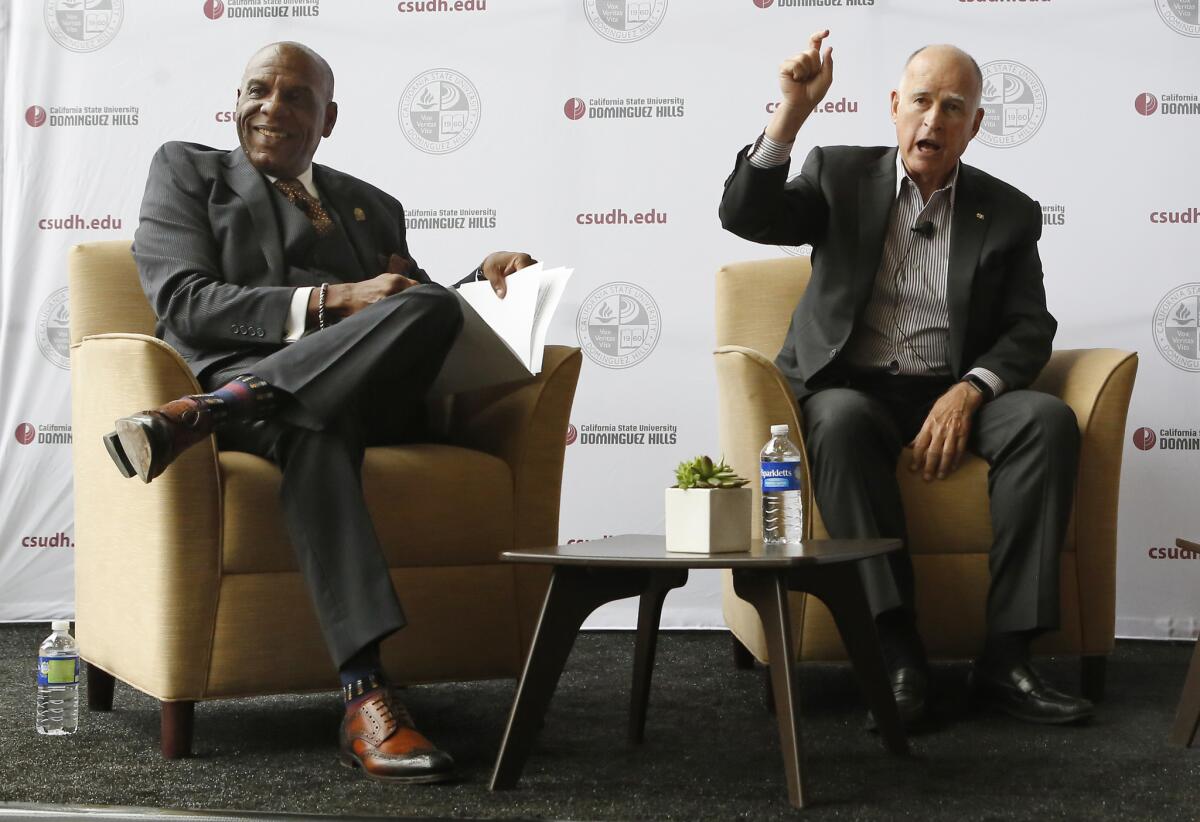
The partisan volleys have continued this week in the effort to recall state Sen. Josh Newman (D-Fullerton) over his vote to pass an increase in the gas tax. Those seeking to recall Newman submitted more than enough signatures needed to qualify the measure for the ballot, if they’re all deemed valid.
Newman supporters looking to halt the recall filed a lawsuit Thursday, claiming signature gatherers had misled voters. And Gov. Jerry Brown signed a bill that makes changes to long-standing recall rules, an effort that Republicans have decried as an attempt by Democrats to “rig the system” to protect one of their own.
Brown seemed to double down on that measure Friday at a press conference at Cal State Dominguez Hills, where he discussed the new gas tax, calling the new recall process “eminently reasonable.”
The measure allows voters up to 30 days to remove their signature from a recall petition and creates a new process to review costs associated with a recall election. Brown said the bill provides an opportunity for “people who have been hoodwinked” to change their mind.
“It’s all about truth and giving people the opportunity to make sure that their vote and their signature is knowingly given,” Brown. “The only people who would be against that are people who wanted to fool people and don’t want to test it in court or in the light of day.”
Brown’s comments came after a roundtable discussion in which he and state Sen. Steven Bradford (D-Compton) spoke about the importance of directing transportation dollars raised by the gas tax increase to businesses owned by women, minorities and people who are disabled. Brown cast it as part of a larger question of equality and opportunity in America.
But the discussion took place even as Brown mused about efforts to repeal the controversial tax package, which is expected to raise $52 billion over 10 years for road repairs and other transportation projects.
“If people want to not fund the roads, then they can put something on the ballot and maybe change things,” Brown said. “But I think most people in California want to fix the roads.”
Assemblyman Travis Allen (R-Huntington Beach), who is running for governor, has filed a ballot measure to repeal the gas tax.
Brown dismissed a recent poll by the Institute of Governmental Studies at UC Berkeley, which said that a majority of registered voters oppose the gas tax increases Brown and legislators recently approved.
“That was a poll that said, ‘Do you want to raise a tax?’” Brown said. “Of course people are going to say no.”
Brown added that when voters are given “concrete situations” like education and roads, they’re more likely to support tax increases.
“I think Californians are always leery of taxes. I’m leery of taxes,” Brown said. “You want to drive around on gravel roads? I’ve got a gravel road out in front of my house in the country. It’s not bad. But I don’t think that’s what people want. I think they want real, paved roads — and to have paved roads you’ve got to spend real money.”
Times staff writer Patrick McGreevy contributed to this report.
- Share via
San Diego Mayor Kevin Faulconer says he won’t run for governor, dashing hopes of GOP leaders
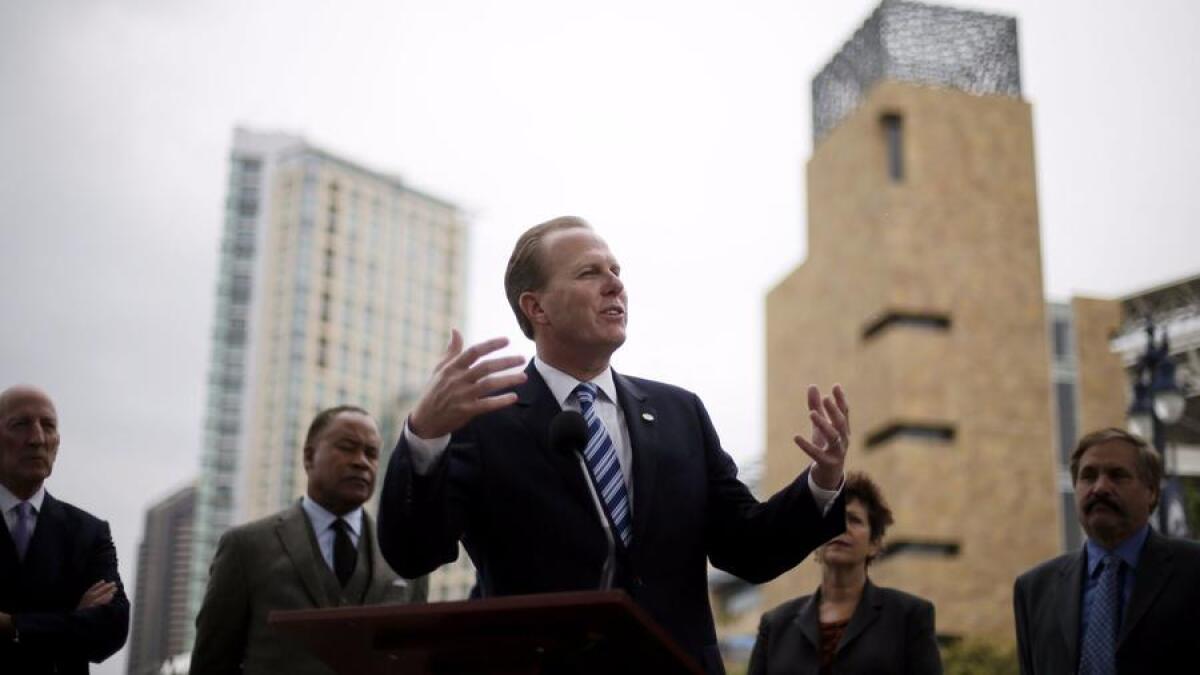
Republican San Diego Mayor Kevin Faulconer, who has been lobbied intensely by GOP leaders to run for California governor, on Friday rejected the idea and vowed to serve out his second term at city hall.
Both House Majority Leader Kevin McCarthy (R-Bakersfield) and state Republican Party Chairman Jim Brulte had urged Faulconer to run.
A fiscal conservative and social moderate who has demonstrated crossover appeal by winning over Democrats, Faulconer has been seen as the GOP’s strongest potential gubernatorial candidate, and one who could help Republicans in down-ballot races if he was at the top of the ticket in 2018. But Falconer nixed the idea of a gubernatorial bid in a Facebook post Friday afternoon, saying he was “deeply honored” by “so many” encouraging him to run.
“It’s a testament to the people of San Diego, and the progress we’ve made to create a fiscally responsible, prosperous city that is moving in the right direction. I made a pledge last year to serve out my second term as mayor, and that’s exactly what I’m going to do,” Faulconer said in the post.
He was facing pressure to enter the race and GOP insiders who were familiar with his thinking believed he was leaning toward running.
Faulconer ultimately decided not to run because he did not see a certain path to victory, according to a top state party official who did not want to be identified because they were not authorized to speak for the San Diego mayor.
The last time a GOP candidate won a statewide race was in 2006.
The governor’s race already has attracted a handful of Republican candidates, but none with Faulconer’s political stature. They include conservative Orange County Assemblyman Travis Allen and Rancho Santa Fe venture capitalist John Cox. Speculation is mounting that former state Assemblyman David Hadley plans to announce a run.
The Democratic heavyweights in the race include Lt. Gov. Gavin Newsom, former Los Angeles Mayor Antonio Villaraigosa and state Treasurer John Chiang.
A strong GOP top-of-the-ticket candidate would be expected to increase Republican turnout next fall. Faulconer’s decision not to run could impact some hotly contested congressional races in California, and potentially affect Republican efforts to retain control of the House of Representatives.
If a Republican gubernatorial candidate fails to make the general election, creating a Democrat-on-Democrat race in November 2018, that could depress GOP turnout and affect those targeted congressional races.
“It leaves the Republicans without an obvious front-runner that the donors would have confidence in,” said GOP strategist Rob Stutzman, who previously advised former Gov. Arnold Schwarzenegger and 2010 GOP nominee Meg Whitman. But “it still depends on the nature of the race next November. It’s too early to say.”
Update 4:21 p.m.: This story was updated with reaction about Faulconer’s decision and more information about the 2018 election.
This story was originally published at 3:30 p.m.
- Share via
Assembly Democrats denounce threats made after single-payer healthcare bill was sidelined
- Share via
Lt. Gov. Gavin Newsom blasts National Rifle Assn. recruitment video, saying it could lead to violence
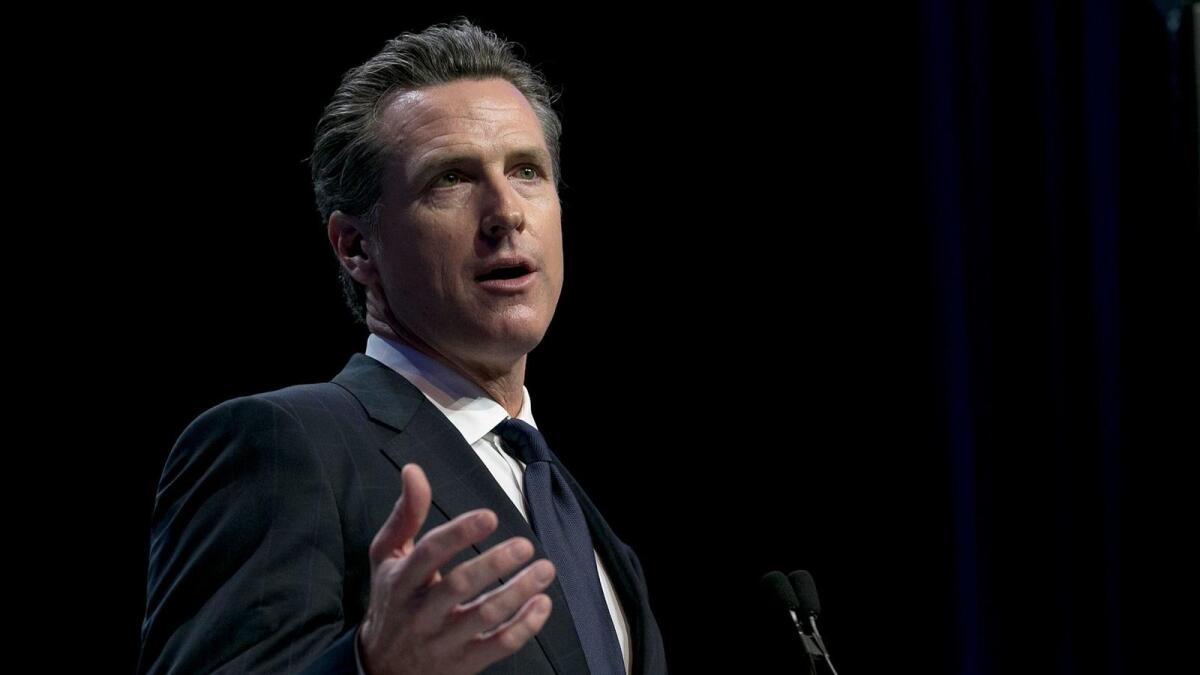
Gubernatorial candidate Gavin Newsom called on the National Rifle Assn. to take down a controversial new video that he argued villanizes political rivals and could lead to violence.
“Come after politicians. Come after policy makers. Come after ME,” Newsom wrote on his Facebook page Thursday. But “do not implicitly call for demonstrations of force against your fellow Americans in a country that is already reeling. You are powerful. People are listening to you. And your message could lead to tragedy.”
The NRA video, which urges people to join the organization, was posted earlier this month and features conservative commentator Dana Loesch talking about political rivals who she argues use the media, schools and Hollywood for sinister purposes.
The video features footage of police clashing with protesters and a bloodied Trump supporter, and flashes images such as the Hollywood sign, Disney Hall and the Los Angeles Times building as Loesch repeatedly invokes an unnamed opponent she refers to as “they.”
Loesch’s concluding remarks in the minute-long video have drawn the most ire.
“The only way we stop this, the only way we save our country and our freedom, is to fight this violence of lies with the clenched fist of truth,” Loesch said. “I’m the National Rifle Assn. of America, and I’m freedom’s safest place.”
Newsom is a longtime foe of the NRA. He was a primary sponsor of Proposition 63, a ballot measure voters approved in November that requires background checks to purchase ammunition, bans possession of high-capacity magazines and other gun-safety efforts.
On Thursday, the NRA claimed victory when a federal judge, at their attorney’s request, granted a preliminary injunction blocking a related law that would have required Californians to get rid of large-capacity magazines by Saturday or face fines and potential jail time.
Newsom, the state’s lieutenant governor, wrote that he felt a “chill down my spine” when he watched the video.
He said while he and the NRA have long disagreed, the video crosses the line of appropriate political debate. He described it as “dangerous” because it tells viewers “that our fellow Americans are to be feared … and even worse.”
“How does this video advance debate? How does it bring people together for common ideals? How does it do anything but cast Americans as ‘enemies’ to be defeated in a cynical ploy to sell as many weapons as possible?” he wrote.
- Share via
Tired of exporting campaign cash, these politicos are putting California first

California feeds the world with its bounty, fuels the economy with its innovation, fires the imagination with its creativity.
There is one export, though, that is far less celebrated: the unceasing torrent of outbound campaign cash.
For political fundraisers, California has long been the Big Rock Candy Mountain, excavated, mined and, ultimately, shafted by candidates of both parties who use the boodle to run for president in Iowa or New Hampshire, or Congress in East Podunk.
Now, Democratic efforts are underway to put California first, directing more campaign cash from whence it came by focusing on seven targeted House districts in the Central Valley and southern part of the state.
- Share via
Federal judge blocks California gun law

A federal judge Thursday granted a request by attorneys for the National Rifle Assn. to block a law that requires Californians to dispose of large-capacity ammunition magazines by Saturday or face fines and possible jail time.
U.S. District Judge Roger T. Benitez wrote in San Diego that the rights of voters who approved Proposition 63 in November have to be balanced against the rights of gun owners.
“If this injunction does not issue, hundreds of thousands, if not millions, of otherwise law-abiding citizens will have an untenable choice: become an outlaw or dispossess one’s self of lawfully acquired property,” Benitez wrote. “That is a choice they should not have to make.”
C.D. Michel, an attorney for the NRA and state gun owners, welcomed the decision, which allows a lawsuit to be decided on its merits before the law takes effect.
“My clients are pleased the Court affirmed that the Second Amendment is not a second class right, and that law abiding gun owners have a right to choose to have these magazines to help them defend themselves and their families,” Michel said in a statement.
- Share via
Two California Democrats join with House Republicans to vote for ‘Kate’s Law’
There would be tougher penalties for people repeatedly caught crossing the border illegally, and millions of dollars less in federal funds for so-called sanctuary jurisdictions such as Los Angeles under two House immigration bills approved Thursday.
Both bills would fulfill President Trump’s campaign promises if they became law, but the Senate has killed similar legislation and is unlikely to be able to reach the 60-vote requirement to pass the bills.
The House voted 257 to 167, with 24 Democrats crossing party lines, to pass “Kate’s Law,” which would create harsher mandatory minimum prison sentences for people who repeatedly enter the U.S. illegally.
It is named after Kathryn Steinle, who allegedly was shot and killed in San Francisco in 2015 by Juan Francisco Lopez-Sanchez, a Mexican immigrant who had repeatedly entered the country illegally and was released from jail by sheriff’s officials despite a request by immigration officials to keep him behind bars.
Two California Democrats, Reps. Jackie Speier of Hillsborough and Eric Swalwell of Dublin, joined Republicans in voting for the bill.
Swalwell grew up with Steinle and is still in touch with her family, he said.
“This bill is not perfect, and it’s shameful that the Republicans did not allow any debate…. But it does improve our ability to punish individuals who repeatedly break the law and to deter those who may do so,” he Swalwell said in a statement.
- Share via
Committee unexpectedly opens door to Rep. Barbara Lee’s push to end military force authorization
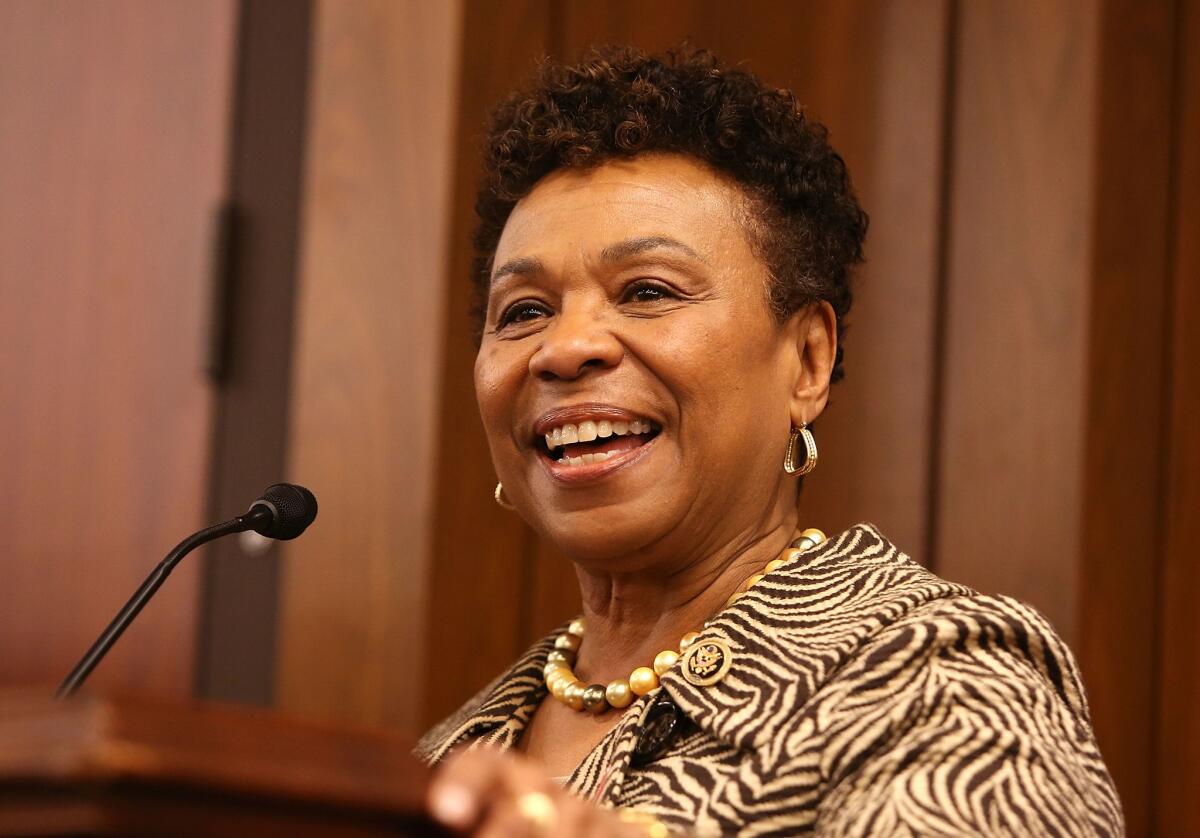
In September 2001, Rep. Barbara Lee (D-Oakland) was the only member of Congress to object to an Authorization for the Use of Military Force, a resolution in response to the terrorist attacks that paved the way for the war in Afghanistan.
In the 16 years since, the resolution has been used by President George W. Bush, President Obama and now President Trump as justification for more than 35 military actions in nearly 20 countries around the world -- which means those presidents have not gone back to Congress for new permission to send troops into harm’s way.
On Thursday, the House Appropriations Committee opened the door to ending that 2001 authorization when it added Lee’s amendment to a Defense Department measure. Congress would have 240 days to debate a new authorization. At the end of that time the 2001 authorization would be repealed.
Lee has lobbied hard just to get to this first step, which was approved by a voice vote in the Republican led committee.
“I’ve been working on this for years and years and years. I’m just really pleased that Republicans and Democrats today really understood what I’ve been saying and I’ve been explaining for the last 16 years, and that is, this resolution is a blank check for perpetual war,” Lee said.
Committee members broke into applause after the unexpected vote.
Lee said Thursday she plans to personally call Speaker Paul Ryan and make the case for keeping her amendment in the bill when it gets to the House floor.
“The public wants to see a debate,” Lee said. “Our young men and women in harm’s way need to know their Congress is supporting them and backing them up, or not.”
- Share via
Volkswagen submits revised plan for installing charging stations as part of emission-cheating settlement

Volkswagen would build more electric vehicle charging stations in disadvantaged communities under an updated plan being submitted to state regulators on Thursday.
The company’s subsidiary, Electrify America, revised its proposal after an earlier version was rejected as inadequate by the California Air Resources Board.
The proposal is the first phase of an $800-million investment in the state, one piece of a much larger settlement over Volkswagen’s cheating on vehicle emission rules.
Although the money is expected to yield hundreds of new charging stations and boost California’s efforts to foster the market for electric cars, it’s also been a source of controversy.
State regulators want 35% of the money to be spent in disadvantaged communities, a target endorsed by the Legislature as well. Electrify America CEO Mark McNabb said, “We will strive hard to hit it.”
The updated plan adds Fresno to the list of metropolitan areas, which already included Los Angeles and Sacramento, where charging stations would be installed.
“It made sense to get out into the Central Valley,” McNabb said. “We thought that was an improvement we could make to the plan.”
- Share via
California’s top elections officer to Trump’s voting fraud panel: No
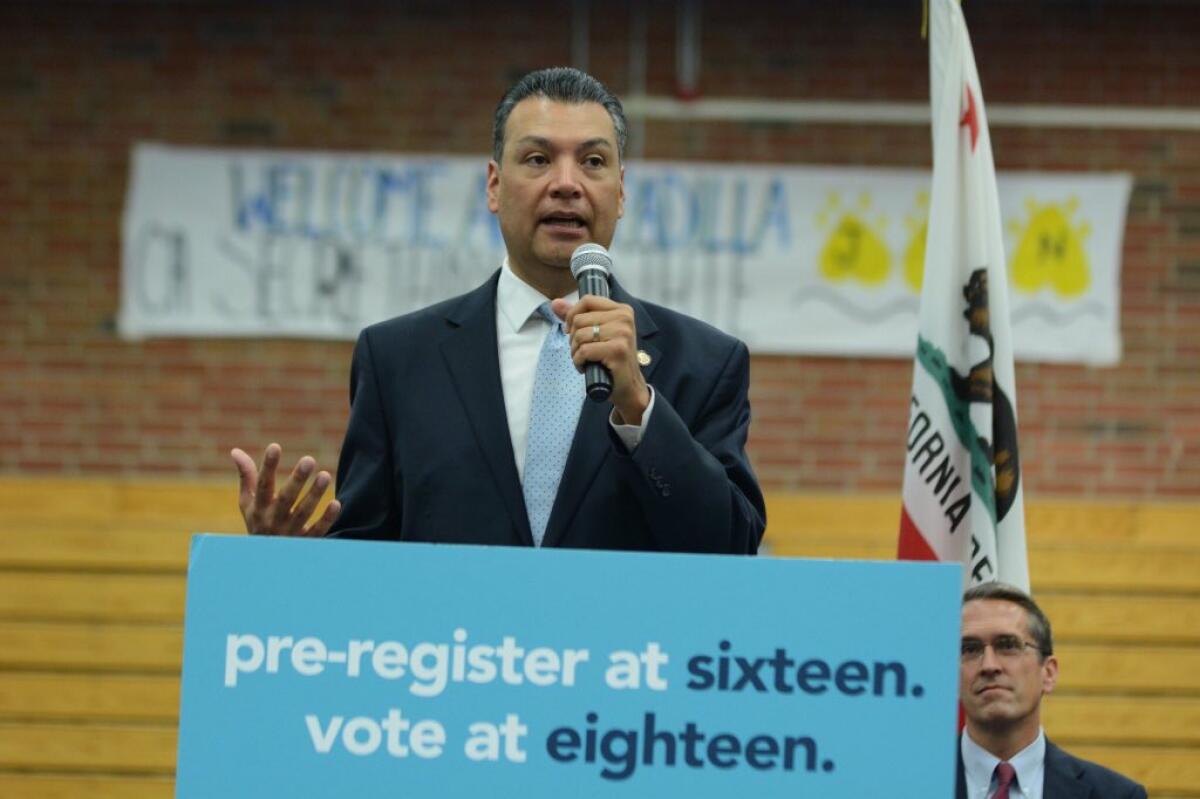
President Trump’s voter fraud commission will not be getting the names and addresses of California’s registered voters. The panel’s request was denied on Thursday by Secretary of State Alex Padilla, who said it would only “legitimize” false claims of massive election cheating last fall.
Padilla refused to hand over data, including the names, addresses, political party and voting history of California’s 19.4 million voters. Kris Kobach, the secretary of state of Kansas who serves as vice chairman of the Presidential Advisory Commission on Election Integrity, sent letters to all 50 states on Wednesday for information he said would help the group examine rules that either “enhance or undermine the American people’s confidence in the integrity of federal elections processes.”
Padilla, though, suggested the effort is little more than a ruse.
“I will not provide sensitive voter information to a commission that has already inaccurately passed judgment that millions of Californians voted illegally,” he said in a written statement. “California’s participation would only serve to legitimize the false and already debunked claims of massive voter fraud made by the President, the Vice President, and Mr. Kobach.”
Last November, Trump tweeted that California was one of three states where “serious voter fraud” took place in the general election. No state or local elections official has found any evidence to back up the president’s assertion.
Kobach’s request says the panel seeks only “publicly available” information. Basic information about California voters is routinely shared with journalists, political campaigns and researchers after a written request and payment of a fee.
The letter asks for data including “information regarding any felony convictions, information regarding voter registration in another state, information regarding military status, and overseas citizen information.”
Padilla also criticized the selection of Kobach to help lead Trump’s commission, accusing the Kansas official of past efforts at racial profiling and suppressing voter turnout.
“His role as vice chair is proof that the ultimate goal of the commission is to enact policies that will result in the disenfranchisement of American citizens,” Padilla said.
The presidential commission’s first meeting is scheduled for July 19.
- Share via
Supporters of state Sen. Josh Newman sue to stop effort to recall him, alleging voters have been misled
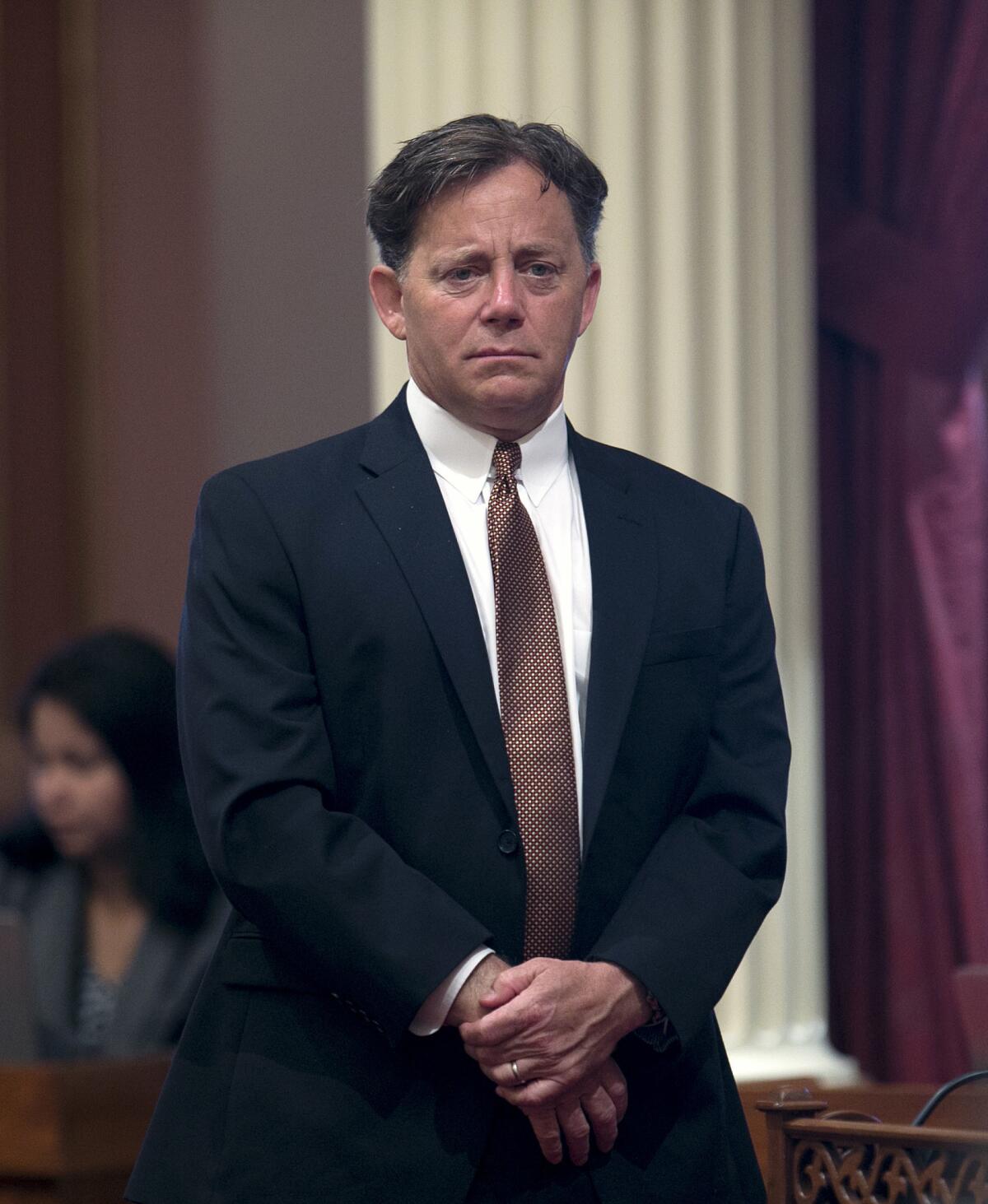
Supporters of state Sen. Josh Newman filed a lawsuit Thursday seeking to stop a recall campaign against the lawmaker, alleging that signature gatherers have misled voters and the petition contains false information.
The Democratic legislator from Fullerton faces a recall funded by the California Republican Party for voting with other lawmakers to increase the state’s gas tax and vehicle fees to raise $5.2 billion annually for road repairs.
On Tuesday, the state party announced it had submitted 84,988 signatures to election officials, some 20,000 more signatures than would be needed if officials determine they are valid.
The lawsuit against Secretary of State Alex Padilla was filed in Sacramento Superior Court by three residents of Newman’s Senate district and paid for by the campaign against the recall. It alleges that signature gatherers misled voters to sign the petitions by saying they would repeal the car tax.
The “petition gathering campaign has misrepresented the nature of the petition by informing voters that it will ‘Stop the Gas Tax’ when it will not,” the lawsuit says. “These statements are intentionally misleading statements of fact that are false beyond dispute and mislead voters…”
The legal complaint, which also names several signature gatherers, alleges that the notice of intent to file the petition is inaccurate in saying that the tax bill provides billions of dollars for mass transit in Northern California without Newman’s district benefiting from the revenue. The bill itself does not earmark where money will go, but the intent of lawmakers was that Newman’s district would benefit, the lawsuit says.
The lawsuit asks that the circulation of the petition be stopped and the recall effort, using the petition as drafted, be halted.
“This suit is about nothing less than the integrity of our election process; a recall election simply should not be certified when signatures were gathered based on lies to voters,” said James Harrison, an attorney who filed the lawsuit.
Former San Diego City Councilman Carl DeMaio, an organizer of the recall, said the lawsuit is without merit.
“Josh Newman refuses to accept accountability for his disastrous vote to raise the car and gas tax and instead has chosen to blame others for the recall against him with lies and frivolous lawsuits,” DeMaio said.
- Share via
State to pay $2.9 million to three men wrongfully convicted in Los Angeles cases
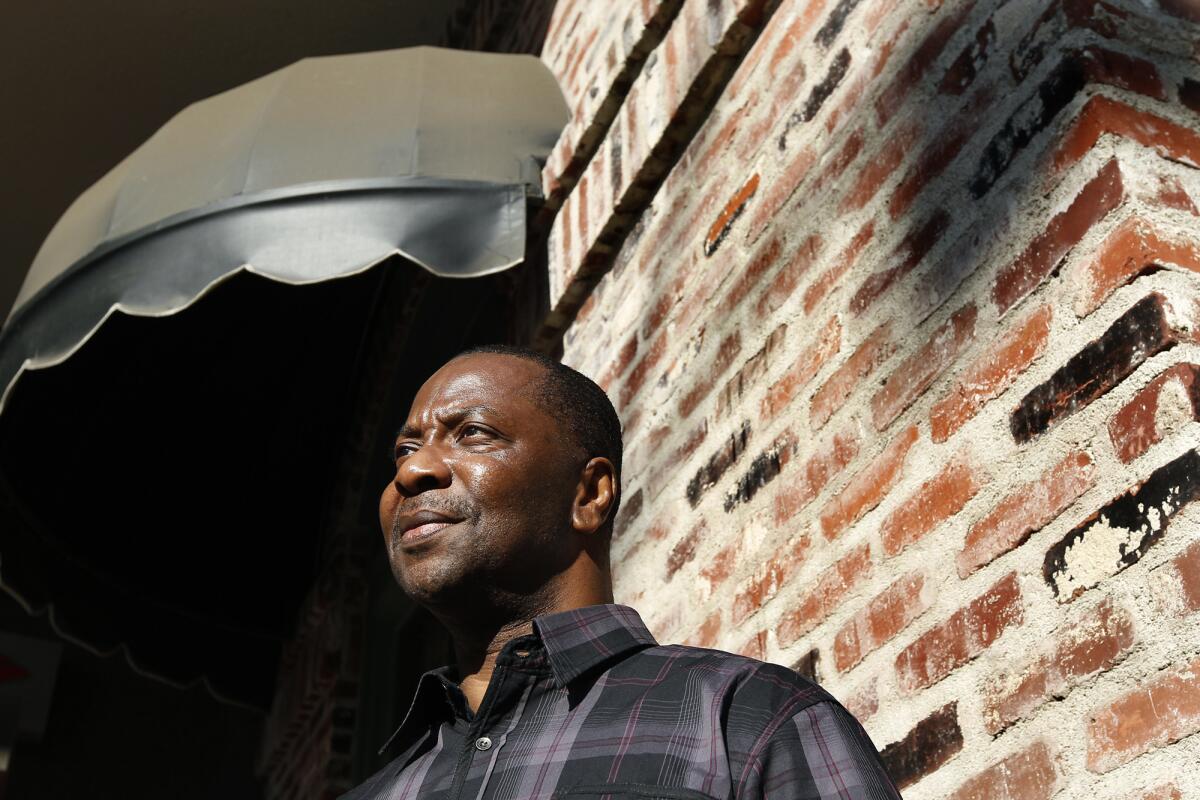
The state Senate has approved payment of $2.96 million to settle three claims by men who were wrongly convicted for crimes in Los Angeles and served time in prison before they were exonerated.
The approval of the payments, amounting to $140 for each day served behind bars, next goes to Gov. Jerry Brown.
The largest payment — $1.7 million — goes to Kash Delano Register, who said he was wrongfully convicted of a 1979 murder because of a flawed LAPD investigation.
He served 34 years in prison. In 2013, the Los Angeles County Superior Court ordered that Register be released from prison after it found he had been denied due process of law and a fair trial because material exculpatory information and evidence was not disclosed.
The court acted after lawyers and students from Loyola Law School cast doubt on the testimony of a key prosecution witness.
The Los Angeles County district attorney’s office later dismissed the charges, and Register was found by the court to be factually innocent.
The Senate payment for 12,427 days served in custody is in addition to a $16.7-million settlement paid to Register by the city of Los Angeles.
The Senate also voted Thursday to pay $886,760 to Luis Vargas, who spent more than 17 years in custody before a court ruled him factually innocent of a 1998 rape.
In 2012, DNA evidence from one of the victims showed that a suspect known as the “Teardrop Rapist,” not Vargas, was the perpetrator of the rape.
The third payment, $340,620, goes to Reggie Cole, who was found factually innocent after serving time in prison for the shooting death of a man outside a South Los Angeles house of prostitution in 1995.
- Share via
Public affairs strategist Fiona Hutton hosts fundraiser for Antonio Villaraigosa
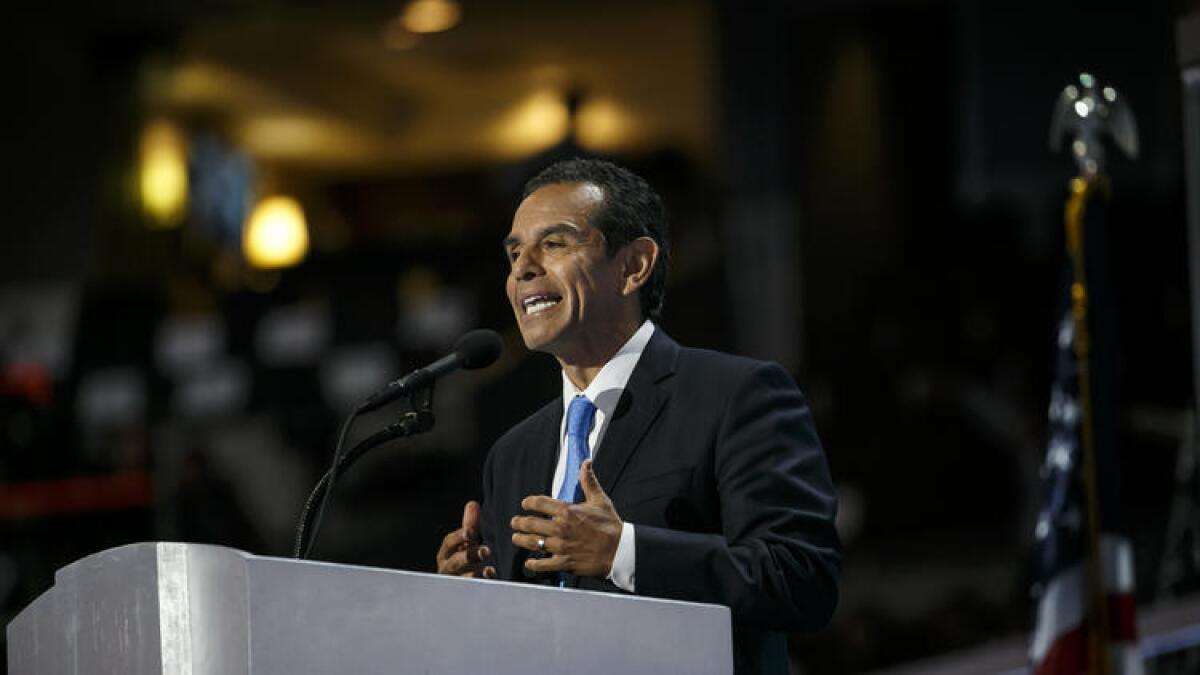
Los Angeles public affairs strategist Fiona Hutton is hosting a San Fernando Valley fundraiser for Democratic gubernatorial candidate Antonio Villaraigosa in July.
Hutton, who has worked on a number of statewide campaigns, also raised money for Villaraigosa during his successful campaign for mayor of Los Angeles in 2005.
The July 25 fundraiser is being held at Hutton’s office in Studio City. Tickets run $1,000 apiece. To be a “co-host,” it’ll cost $10,000.
Along with serving as president of her company, Fiona Hutton & Associates, Hutton sits on the board of directors of the Los Angeles Area Chamber of Commerce.
- Share via
California joins other states asking the Trump administration for information on how it’s enforcing immigration law
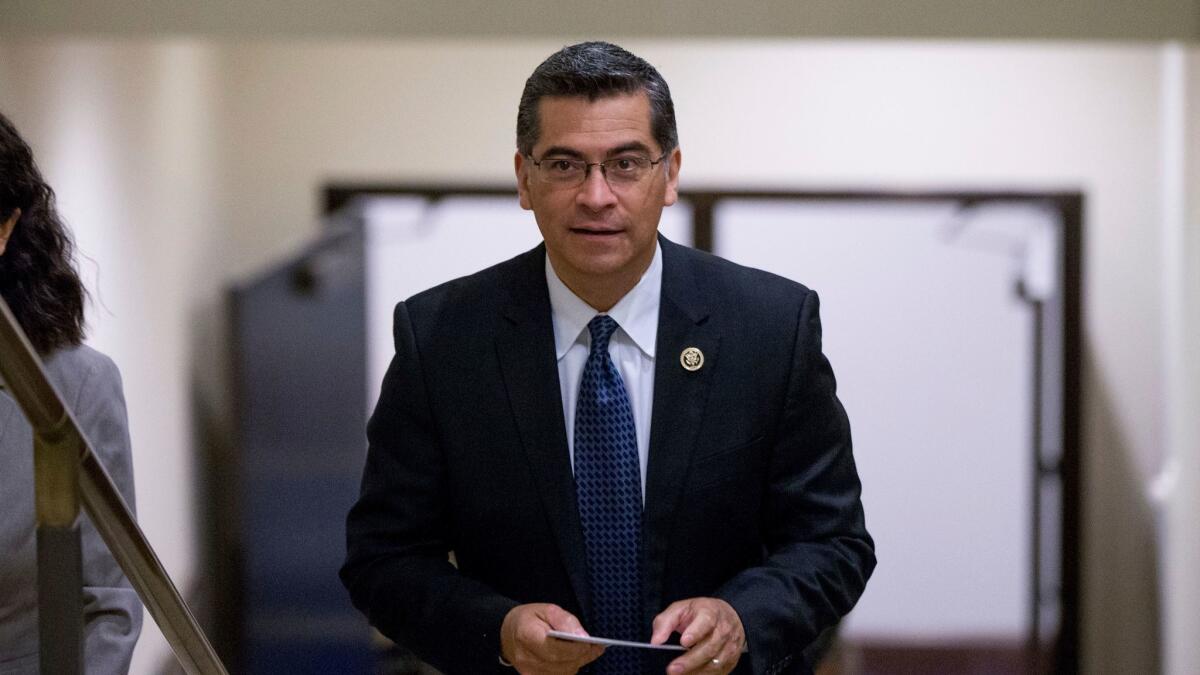
A group of nine state attorneys general, including California Atty. Gen. Xavier Becerra, filed a Freedom of Information Act request with the Department of Homeland Security on Thursday seeking records that would clarify how the Trump administration is enforcing federal immigration law.
The request seeks the number of immigration detentions, deportations and detainer requests, and the rationale for each, as well as clarifying information on whether Trump is following through on comments that he will not target young people who were brought to the country illegally by their parents.
The attorneys general also want to know whether immigrants in the country illegally have been detained at schools, hospitals and places of worship, which the state officials feel should be off-limits for enforcement.
“Mixed messages from the Trump Administration on immigration enforcement are sowing confusion and increasing anxiety among immigrants,” Becerra said in a statement. “Today we ask the Administration to tell us what it is doing in this area.”
The data could be used in a barrage of legal challenges the states have filed against federal immigration policies.
Becerra noted that immigration-related arrests have increased nearly 40% since Trump became president, and there is concern that some of the arrests have included young people who were given a deferral from deportation under the Obama administration.
“The President’s Executive Orders, and the steps taken by the Department of Homeland Security to implement those orders, have generated new fears and uncertainties in immigrant communities across the country,” the attorneys general wrote in the request for information.
The other states represented in the request are New York, Illinois, Washington, Massachusetts, Iowa, Maryland, Oregon and Hawaii.
- Share via
This is why California’s Legislature can’t fix the state’s housing problems

For 50 years, California has had a law that aims to encourage developers to build housing.
But the law has failed at helping stem the statewide shortage of homes that drives California’s affordability problems. The reason? The law requires cities and counties to produce prodigious reports to plan for housing — but it doesn’t hold them accountable for any resulting home building.
Cities and counties resent the law. To avoid complying, they’ve asked the state to let prison beds count toward their low-income housing goals, among other things. And despite knowing about the law’s weaknesses for decades, state lawmakers have provided no incentive, such as a greater share of tax dollars, for cities and counties to meet their housing goals.
- Share via
California’s attorney general joins the fight against President Trump’s ‘sanctuary city’ order
Atty. Gen. Xavier Becerra led a group of 10 states Wednesday in filing an court brief supporting San Francisco and other California communities that challenged President Trump’s executive order to withhold federal funds from “sanctuary jurisdictions.”
After the local governments won a preliminary injunction against the order, the Trump administration asked the courts to dismiss the cities’ lawsuit.
The brief filed by Becerra argues that public safety is improved when local law enforcement agencies focus on crime prevention instead of helping federal authorities enforce immigration laws.
“The Trump Administration does not have the right to coerce states, counties or municipalities to do the federal government’s job,” Becerra said in a statement. “California’s state and local law enforcement officials are in the business of public safety, not of deportation. Threatening public safety funding to compel localities to do immigration work is a dangerous game that undermines public safety.”
- Share via
California Supreme Court leaves in place decision upholding cap-and-trade system
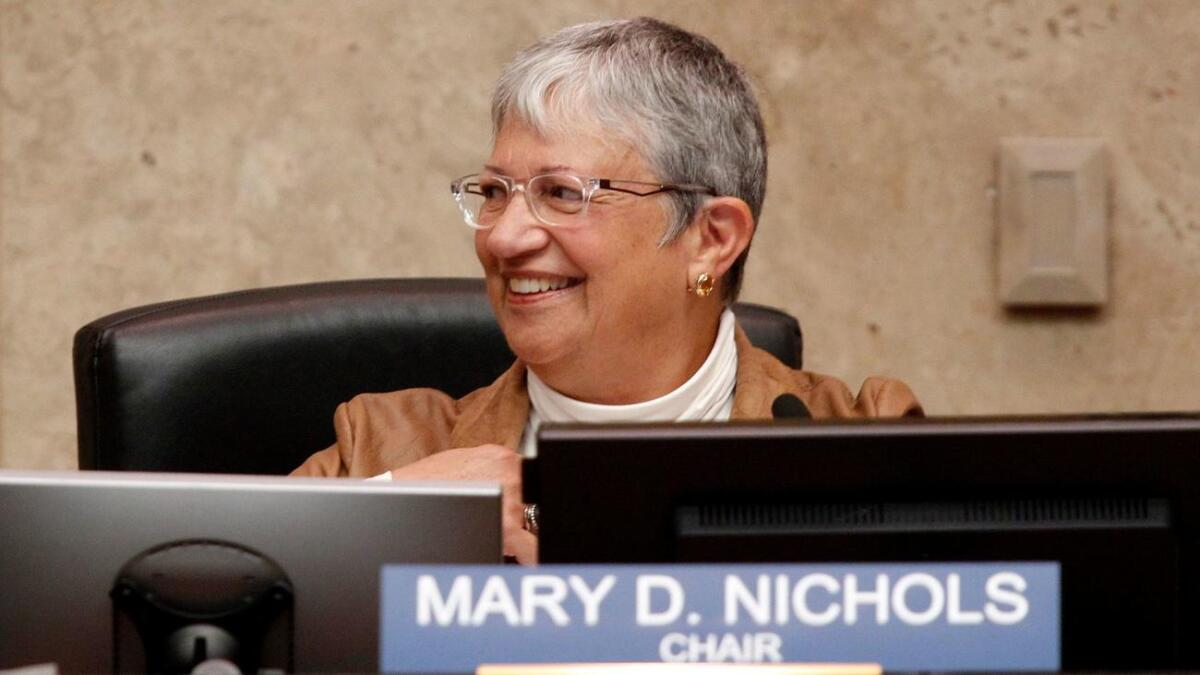
After more than four years, a legal challenge to California’s cap-and-trade program has reached an unsuccessful conclusion.
The end came on Wednesday when the California Supreme Court declined to consider an appeal from business groups who consider the program to be an unconstitutional tax.
The program requires companies to buy permits to release greenhouse gases, a system intended to provide a financial incentive to reduce emissions.
The law that provided the program’s foundation was not passed with a two-thirds vote in the Legislature, the legal threshold for new taxes, sparking lawsuits from the California Chamber of Commerce and the Pacific Legal Foundation.
A state appeals court rejected their arguments in April, but they appealed. Business groups were also concerned the decision was too broad and could open the door to additional taxes.
Despite the state’s victory in court, there are other legal questions around cap and trade. Gov. Jerry Brown is pushing lawmakers to extend the program past 2020 with new legislation.
“With this Supreme Court victory, now it’s up to us to take action extending California’s cap-and-trade system on a more permanent basis,” Brown said in a statement.
This story has been updated with a statement from the governor.
- Share via
Rohrabacher on meeting with Manafort while he was a foreign agent: ‘It was a nice little dinner’
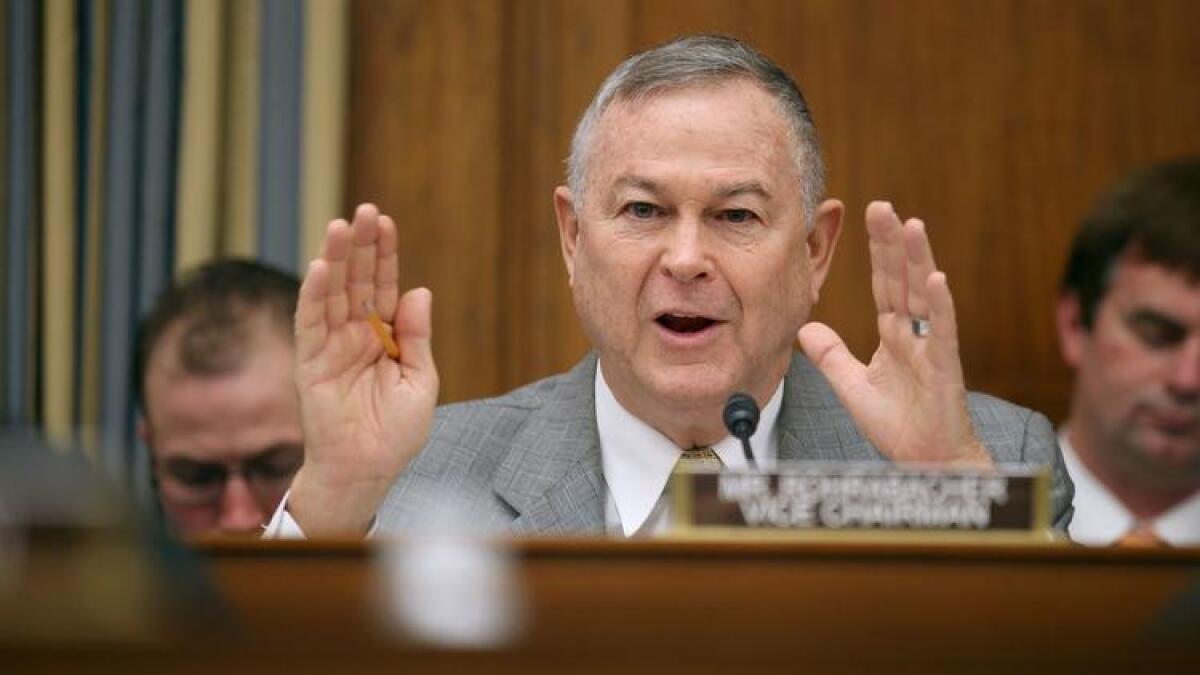
When former Trump campaign manager Paul Manafort belatedly filed as a foreign agent on behalf of a pro-Russian Ukrainian political party this week, he listed a meeting with just one U.S. politician — Rep. Dana Rohrabacher of Huntington Beach.
Manafort’s years-late filing with the Justice Department details $17 million in political consulting work he did between 2012 and 2014 for the Party of Regions, a Ukrainian party considered friendly with the Kremlin.
Rohrabacher told the Los Angeles Times on Wednesday that the March 2013 meeting happened over dinner at the Capitol Hill Club, a popular Washington Republican social club. He said Manafort billed it as a chance to get reacquainted decades after they worked together in the 1970s on President Reagan’s campaign. Still, he assumed Manafort had an agenda.
“I assume when old friends call me up and are wanting to get reacquainted and stuff I always assume they are in some way under contract with somebody,” Rohrabacher said.
Rohrabacher, chairman of the House Foreign Affairs Subcommittee on Europe, Eurasia, and Emerging Threats, has long been known for encouraging improved relations with Russia, something that’s made him an outlier in the Republican Party.
He said Russia and the Baltic states probably came up during dinner, but it wasn’t the focus of their conversation.
“We discussed a myriad of things, a lot of personal stuff, a lot of different analysis of the politics of the day,” Rohrabacher said. “It was a nice little dinner.”
Three days later, Manafort contributed $1,000 to Rohrabacher’s reelection campaign. Manafort’s “modest” donation didn’t stand out, Rohrabacher said.
Ongoing FBI and congressional investigations into Russian attempts to interfere in the 2016 election, and how the Trump campaign may have been involved, have heightened interest in any connections American politicians may have had with the Russian government or its proxies.
Rohrabacher’s opponents immediately began fundraising off the revelation that Manafort met with the congressman while serving as a foreign agent. Democrat Harley Rouda, who’s running for Rohrabacher’s seat in 2018, called it “embarrassing” in a solicitation email Tuesday.
“We need someone who cares more about Orange County and America than supporting Russia and Putin,” Rouda’s email stated.
- Share via
Democrats block Republican legislator’s proposal for forensic audit of UC Office of President
Two months after a state audit found mismanagement at the University of California, Democratic state lawmakers on Wednesday blocked a Republican legislator’s proposal to have auditors go back in and look deeper at spending, this time with an eye for possible criminal activity.
Assemblyman Dante Acosta (R-Santa Clarita) said the follow-up examination was justified after an audit in April found the UC Office of the President had failed to disclose a $175-million budget surplus to the Board of Regents and the public, was paying excessive salaries and expenses and had inadequate financial safeguards in place to prevent abuse.
The lack of controls, the audit concluded, was “putting millions of dollars at risk of abuse.”
“I am fighting to return trust in the institution of the UC Office of the President for students, parents, faculty and staff,” Acosta said. “Only complete transparency can accomplish that goal.”
However, no Democratic lawmakers on the Joint Legislative Audit Committee voted to authorize a new audit, so the motion failed. Assemblyman Al Muratsuchi (D-Torrance) said the university administration should be given time to address the recommendations of its recent audit.
“I believe this request is premature,” he said.
State Auditor Elaine Howle said Wednesday in response to a legislator’s question that she did not find any evidence of misuse of funds. “We didn’t see anything nefarious,” Howle told the panel.
UC President Janet Napolitano said funds were not hidden, but she has agreed to adopt policies to make the budget process more transparent. Monica Lozano, chairwoman of the UC Board of Regents, told the legislative committee Wednesday that a new audit is “unnecessary” and may interfere with the system’s implementation of recommendations from the last audit, including the hiring of an accountant to look at UC spending.
- Share via
Single-payer healthcare advocates protest at Capitol with a message for California’s Assembly speaker: ‘Shame on you!’
Backers of a measure to establish a single-payer healthcare system in California rallied at the Capitol on Wednesday to renounce Assembly Speaker Anthony Rendon (D-Paramount), who shelved the bill last week.
Several hundred demonstrators, many affiliated with the California Nurses Assn., the legislation’s sponsor, convened in the Capitol rotunda, where they unfurled a banner that blared “Inaction = Death,” before handing off signs with written complaints to a member of Rendon’s staff.
The rally, on the heels of a smaller demonstration at Rendon’s district office on Tuesday, is a sign of how single-payer backers continue to seethe after the bill, SB 562, stalled on Friday.
Patty Estefes, a retired nurse from San Jose, said the campaign for single-payer heathcare, in which the government would cover all residents’ healthcare costs, was her passion.
“Rendon sabotaged SB 562 and we want to take the knife out,” said Estefes, explaining her sign, which had an image of the California grizzly bear stabbed in the back with a blade labeled “Rendon.”
The image has become popular among supporters of the bill, although other Democrats have said the violence of the image makes them uneasy.
Meanwhile, another union leader, Robbie Hunter of the powerful State Building and Construction Trades Council of California, chimed in Wednesday with support for the state Assembly speaker.
“Working people have real fights, and they are not with a labor champion like Anthony Rendon,” said Hunter, who denounced the criticism from single-payer advocates as “unfair and unwarranted attacks.”
- Share via
Garcetti and Schwarzenegger urge cities and states to lead fight against climate change in Trump era
Former Gov. Arnold Schwarzenegger and Los Angeles Mayor Eric Garcetti on Wednesday called on cities and states to lead the nation’s fight against global warming as the federal government begins to reverse its climate change policies.
The Republican former film star — who signed a landmark 2006 law to reduce California’s carbon emissions — and the Democratic mayor spoke out against President Trump’s denial of climate science at a forum at Creative Artists Agency in Century City.
Both argued that steps taken by cities and states to promote renewable energy could largely make up for the Trump administration’s withdrawal from the worldwide Paris agreement to cut greenhouse gas emissions.
- Share via
California voters could decide in 2020 whether to remove mandatory punishment for falsifying U.S. citizenship records
A proposed California law would let state voters decide in November 2020 whether to remove the mandatory punishment for a person who falsifies citizenship documents.
The legislation by Assemblyman Raul Bocanegra (D-Pacoima) would make the crime a “wobbler,” meaning prosecutors would have the discretion to charge suspects in such cases with either felony offenses or lower-level misdemeanors. That, supporters say, would bring the penalties in line with those for similar crimes committed by legal residents who falsify government records, such as driver’s licenses.
Assembly Bill 222 moved out of the Senate Public Safety Committee on Tuesday with a 5-2 vote along party lines. An amendment added Tuesday places the issue on the ballot in November 2020.
Bocangera said the measure was introduced as a response to President Trump’s hard-line stance on immigration and would reverse part of Proposition 187, a 1994 California ballot measure to deny public services to immigrants in the country illegally.
The bill would repeal provisions in the penal code that require a person to serve an automatic five-year mandatory prison sentence or pay a $75,000 fine if they are convicted on charges of manufacturing, distributing or selling false documents to conceal someone else’s citizenship or residency status.
It has the support of the Los Angeles County district attorney’s office, which says there are far more serious crimes that carry substantially lower penalties.
“Today, if an underage college student uses a fake ID to purchase a six-pack of beer, he or she can be charged with a misdemeanor,” Bocanegra said in a statement. “However, if an immigrant is caught using that same fake ID, he or she is automatically charged with a felony and is subject to five years in prison.”
- Share via
It’s all good: Gov. Jerry Brown (again) signs a budget without any vetoed spending
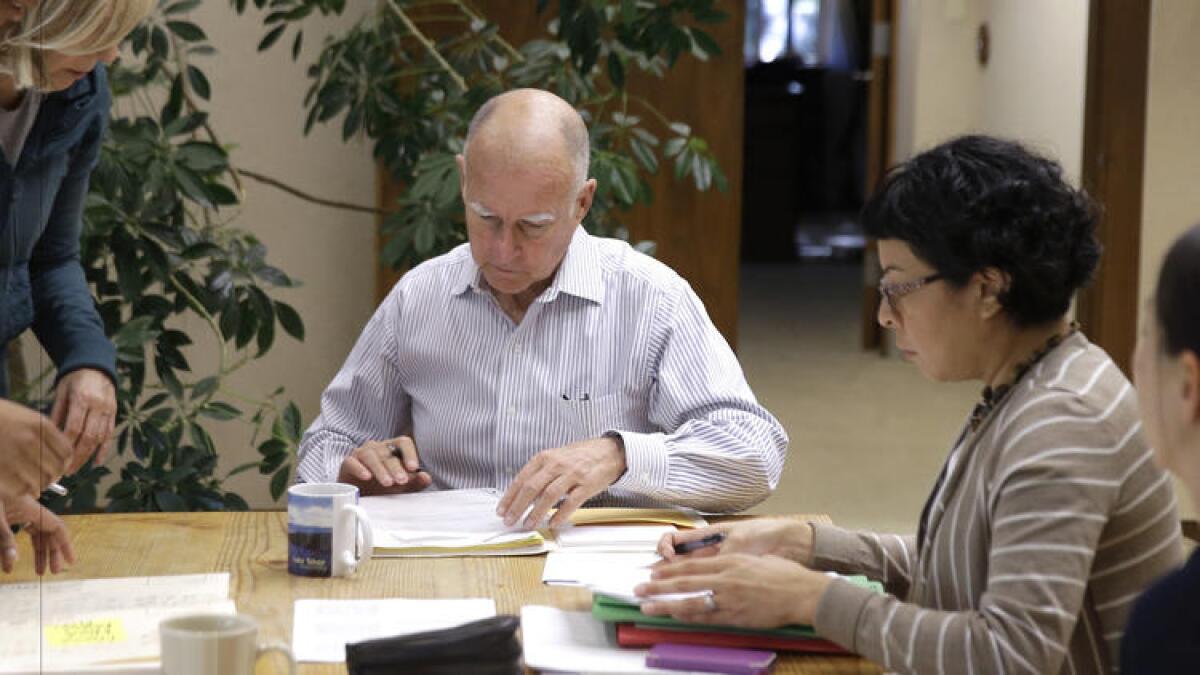
Gov. Jerry Brown holds two unique records when it comes to state budgets. No governor has signed more of them, and none in modern times have been as hesitant to veto items they don’t like.
In the budget he signed on Monday, Brown made no changes. It’s not the first time. This was Brown’s second consecutive budget in which he took no veto actions, and his third veto-free budget since 1982.
Governors have line-item veto power to erase budget expenditures, decisions that aren’t subject to review by the Legislature. Previous chief executives have used their unilateral power far more often, a way to trim spending from a variety of state budget-related programs.
State documents show former Gov. George Deukmejian holds the modern record for the most budget changes, issuing 367 line-item vetoes on July 21, 1983. In total amount of spending, the record belongs to former Gov. Pete Wilson, whose budget vetoes in 1998 added up to more than $1.9 million.
Brown also has the distinction of issuing fewer vetoes of stand-alone legislation of any governor in the last half-century, suggesting it’s a sign of “respect” for the legislative branch of government.
The governor’s signature on the latest state budget sets in place $183.2-billion in spending, covering a wide range of programs and services while setting aside more in cash reserves than ever before.
- Share via
Jimmy Gomez scheduled to be sworn in more than a month after he was elected to Congress
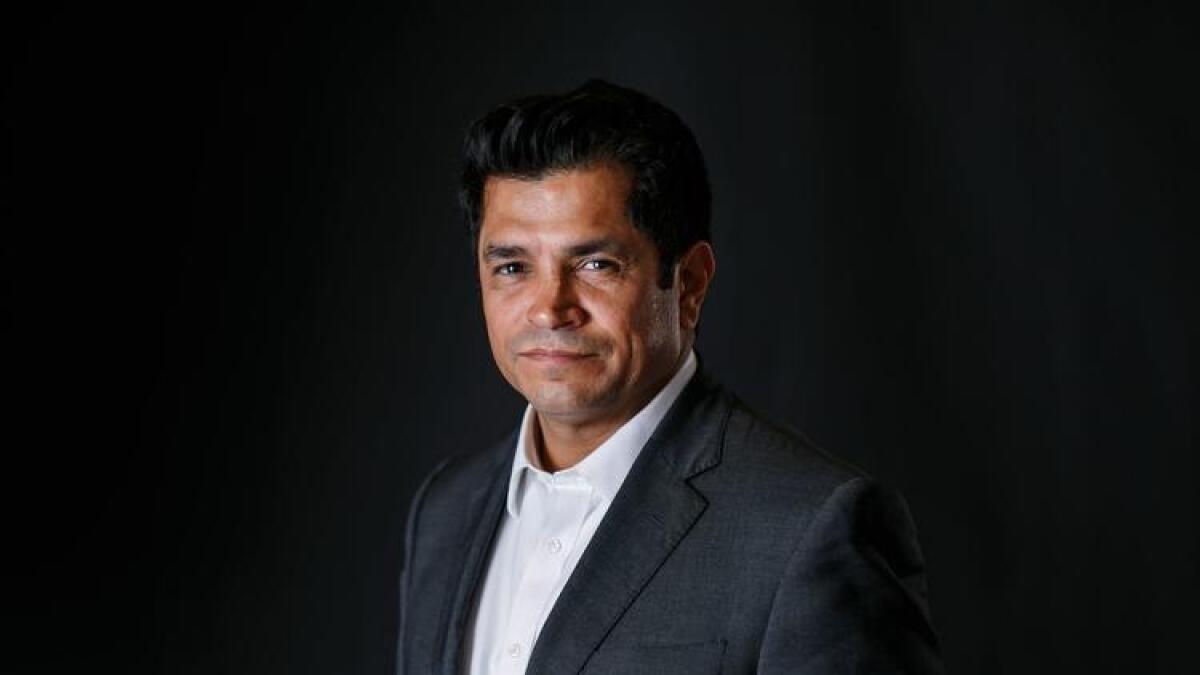
Rep.-elect Jimmy Gomez is scheduled to be sworn into Congress on July 11, the day the House returns from its July Fourth recess, according to a senior Democratic aide.
House Majority Leader Kevin McCarthy (R-Bakersfield) complained about the 34th Congressional District’s “elongated vacancy” in a letter Tuesday, calling the three-week span since the June 6 Los Angeles special election “an abdication” of Gomez’ responsibilities.
Gomez, a current Democratic state assemblyman, told The Times after the election he would try to delay his Assembly resignation to vote on extending the state’s cap-and-trade program, which requires companies to buy permits to release greenhouse gas. He’s since said he could not be sworn in with other new members of Congress this week because of a family conflict.
Discussions on cap-and-trade have dragged on in Sacramento, and it appeared Democrats were delaying Gomez’ swearing in, and Assembly resignation, to help Gov. Jerry Brown pass the bill with a two-thirds majority before the Legislature leaves on July 21.
The office of House Minority Leader Nancy Pelosi (D-San Francisco) pushed back on McCarthy on Wednesday, saying Republicans should worry about getting their own house in order.
“As the majority leader well knows, the Republican majority has canceled votes the last two Fridays because there is nothing to vote on. While we appreciate his interest in having a full complement of Democrats in Congress, perhaps his time would be better spent identifying exactly what and where the Republican agenda is,” said Pelosi spokeswoman Caroline Behringer.
It is unusual for so much time to pass between a special election and the winner taking office. In the last several congresses, the time between a special election and its winner taking the oath averaged one week.
- Share via
L.A.’s newest congressman still hasn’t taken his oath. Majority Leader Kevin McCarthy wants to know why
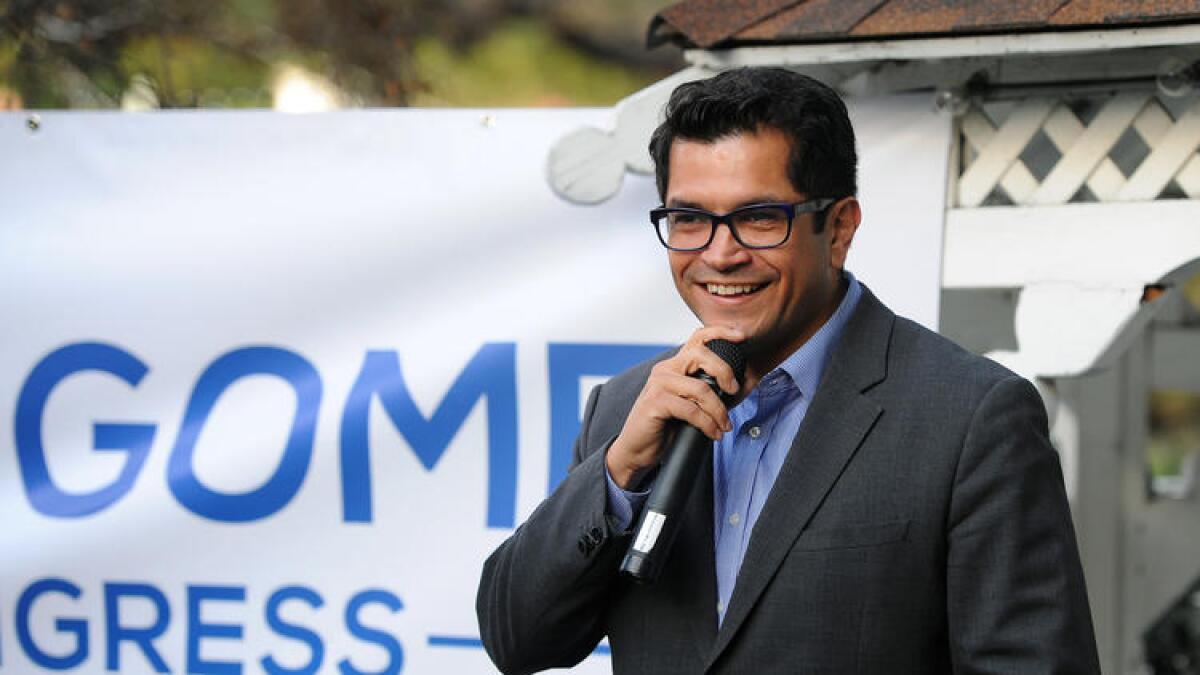
House Majority Leader Kevin McCarthy (R-Bakersfield) wants to know why Rep.-elect Jimmy Gomez hasn’t been sworn in, saying the seat’s “elongated vacancy” is “an abdication” of his responsibilities.
Twenty one days have passed since Gomez won a special election to replace now-California Atty. Gen. Xavier Becerra, who resigned Los Angeles’ 34th Congressional District last January.
Gomez, a current Democratic state assemblyman, told The Times after the election he would try to delay his Assembly resignation to vote on extending the state’s cap-and-trade program, which requires companies to buy permits to release greenhouse gas.
Negotiations on cap and trade are escalating in Sacramento, and there are rumblings Gov. Jerry Brown would like to be able to count on Gomez’ vote to pass the bill with a two-thirds majority before the Legislature leaves on July 21. McCarthy took issue with that in a letter to Gomez, House Minority Leader Nancy Pelosi (D-San Francisco) and California Secretary of State Alex Padilla.
“If this delay persists due to his prioritization of state legislative matters, Congressman-elect Gomez should be honest with the constituents of California’s 34th congressional district who he was elected to serve and resign from his newly-elected seat so they can elect someone ready to serve on Day One,” McCarthy wrote.
Brown wants the deal to pass with a two-thirds majority to help insulate it from legal challenges, and Gomez could be an important vote if legislative leaders can’t get some moderate Democrats on board.
Gomez said Monday he only offered to be available for a cap and trade vote until June 15, and had a family conflict this week, but has been willing to be sworn in at any other time.
Because Congress leaves Friday for the July Fourth recess, the soonest Gomez can take office is July 10, but no date for the ceremony has been set. A spokeswoman for Gomez did not return a call Tuesday afternoon.
McCarthy also questioned why Gomez has not been sworn in even though two members who were elected after Gomez have already taken office.
It is unusual for so much time to pass between a special election and the winner taking office. In the last several congresses, there was an average of one week between a special election and the winner taking the oath.
- Share via
Campaign to recall freshman state senator submits more than enough signatures to qualify for the ballot
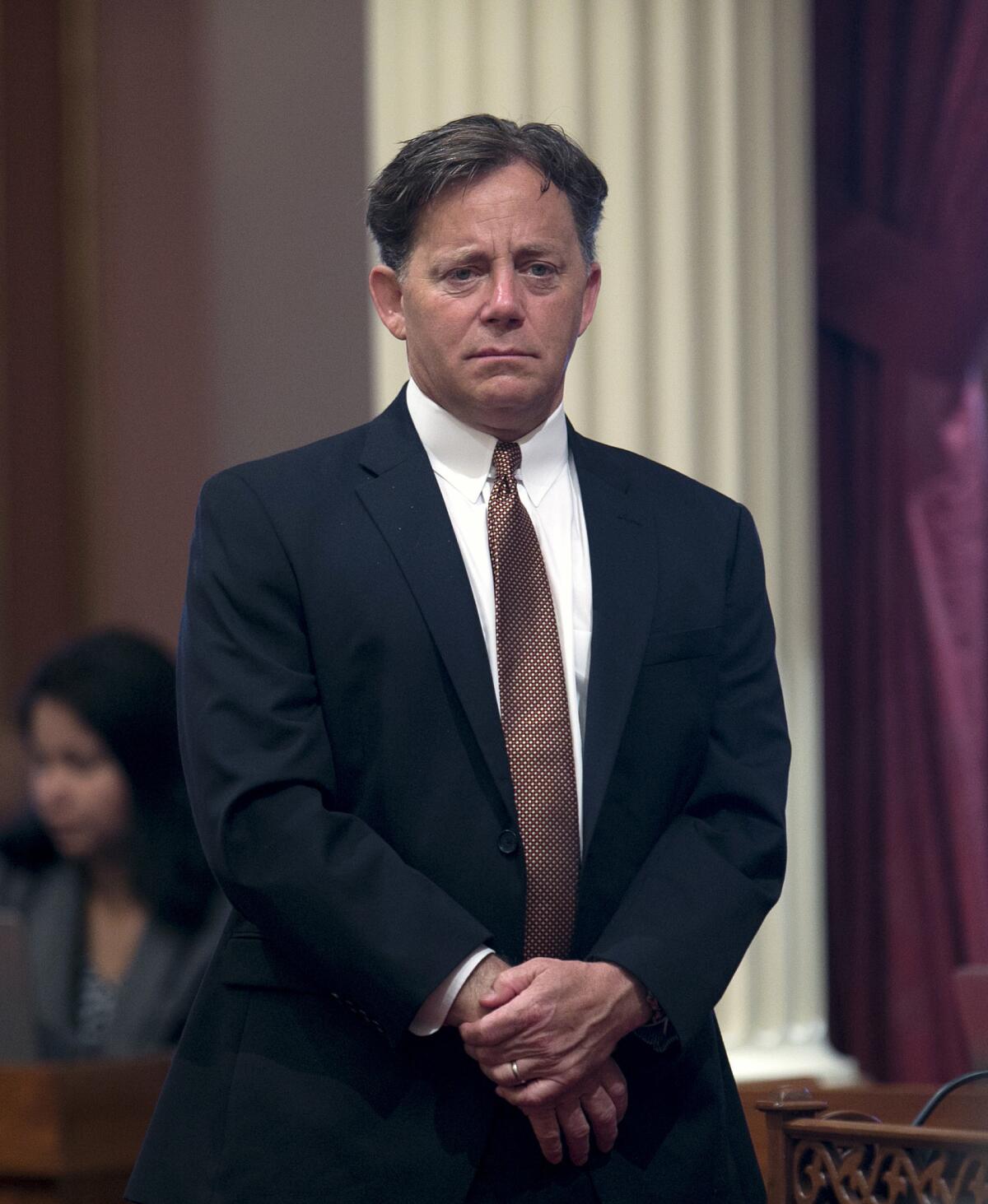
The campaign against state Sen. Josh Newman has turned in more than enough signatures to force the freshman Democrat from Fullerton into a recall election.
Republican Carl DeMaio, a lead organizer of the effort, said the group submitted 84,988 signatures on Tuesday.
More signatures are being collected but only 63,500 registered voters in the 29th Senate District are needed to put the recall question on the ballot.
“It shows that there is an unbelievable grass roots movement to fire Josh Newman for his disasterous vote to support an increase in the gas tax,” said DeMaio, a conservative radio talk show host from San Diego.
The recall drive was complicated by recently enacted legislation that allows voters to ask that their signatures not be included in the recall petitions if they felt they were misled.
Elections officials in Los Angeles, Orange and San Bernardino counties must now determine whether there are sufficient valid signatures to qualify the recall.
Mike Roth, a spokesman for the campaign against the recall, said special interests including Chevron have helped fuel a misleading petition drive.
“The recall petition is a costly power grab by out-of-district special interests that won’t save taxpayers a dime and won’t solve any problem voters care about,” Roth said. “What it will do is cost up to $3 million in tax dollars that would be better spent on our schools and public safety.”
- Share via
In massive shake-up, Gov. Jerry Brown breaks up California’s scandal-plagued tax collection agency
In a move that triggers the most dramatic shake-up of the California Board of Equalization in its 138-year history, Gov. Jerry Brown signed legislation Tuesday that strips the embattled state tax collection agency of most of its powers and duties as officials scramble to create an entirely new department by July 1.
The board is the target of an investigation by the state Department of Justice, and its employees and members have been accused by auditors of mismanagement, including putting $350 million in sales taxes in the wrong accounts and improperly interfering with decisions to open field offices and transfer staff.
The governor signed a bill that pares the state board from an agency with 4,800 workers to one of 400 employees, shifting the other staff engaged in the collection of sales and excise taxes to a new California Department of Tax and Fee Administration.
The elected, five-member Board of Equalization will also give up its role hearing taxpayer appeals to a new Office of Tax Appeals, leaving the board to advocate for taxpayers and continue setting rates for gas taxes and pipeline levies, and making sure counties fairly assess property taxes.
Anticipating the governor’s action, officials had already started work to create a new state department by July 1.
“It’s a short period,” acknowledged Marybel Batjer, secretary of the California Government Operations Agency, who is coordinating the changes.
The new department will be headed by a director appointed by the governor and requiring state Senate approval. Brown will also appoint a chief deputy and chief counsel.
“The recruitment is underway” for those positions, Batjer said, adding that “the transition will continue after July 1, obviously. Not every ‘i’ will be dotted and ‘t’ crossed between now and July 1. We will do our mighty best to do the most important things before July 1.”
Learn more on the history of the state board and what’s next.
- Share via
Gov. Jerry Brown approves a $183-billion state budget, though a few details are unfinished
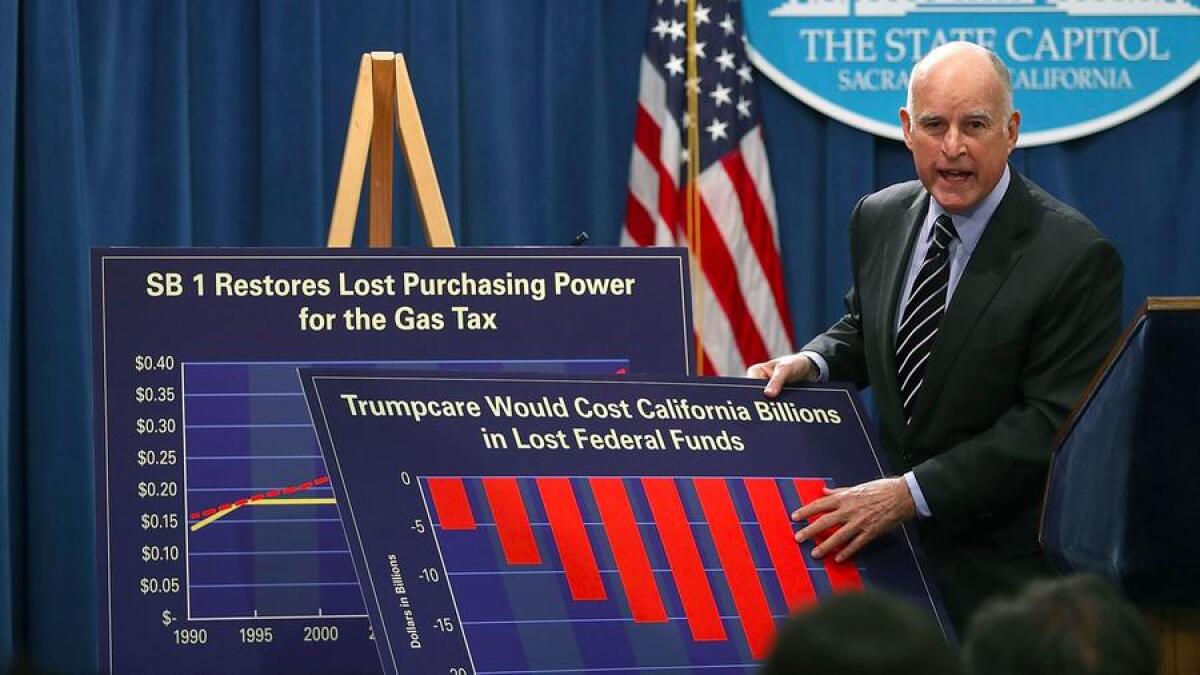
Gov. Jerry Brown on Tuesday signed into law a $183.2-billion budget, a spending plan with significant boosts for public schools and a variety of programs to help California’s most needy residents.
While the blueprint depends on a series of other related bills that haven’t reached his desk, Brown’s action largely ratifies the plan approved by the Legislature and ensures the state will have a budget in place for the new fiscal year that begins Saturday.
“This budget provides money to repair our roads and bridges, pay down debt, invest in schools, fund the earned income tax credit and provide Medi-Cal health care for millions of Californians,” Brown said in a written statement released by his office.
The budget boosts total state and local spending on K-12 education and community colleges to $74.5 billion, roughly $11,000 per pupil in the coming school year. It also increases funding for the University of California and Cal State University systems, and provides additional money for preschool and child care programs.
Brown and lawmakers agreed to devote a portion of new tobacco tax dollars to higher payments for doctors and dentists that treat patients in Medi-Cal, the state’s healthcare program for the poor. Divvying up the dollars generated by last fall’s Proposition 56 was among one of the most contentious issues during spring budget negotiations.
The budget sets aside additional money in the state’s rainy-day reserve fund, growing the contingency account to $8.5 billion.
Brown, who rarely uses his line-item veto power in trimming budgets, left entirely intact the plan ratified by the Legislature on June 15.
While the governor signed 15 budget-related bills Tuesday, a handful of other related bills have yet to make their way to his desk. Those include a plan to make an extra $6-billion payment to the California Public Employees’ Retirement System, or CalPERS, borrowing the money from surplus state revenues. The plan was approved by the state Senate on Monday.
- Share via
Gov. Jerry Brown says GOP healthcare bill cuts ‘right into the heart of what is already a divided nation’
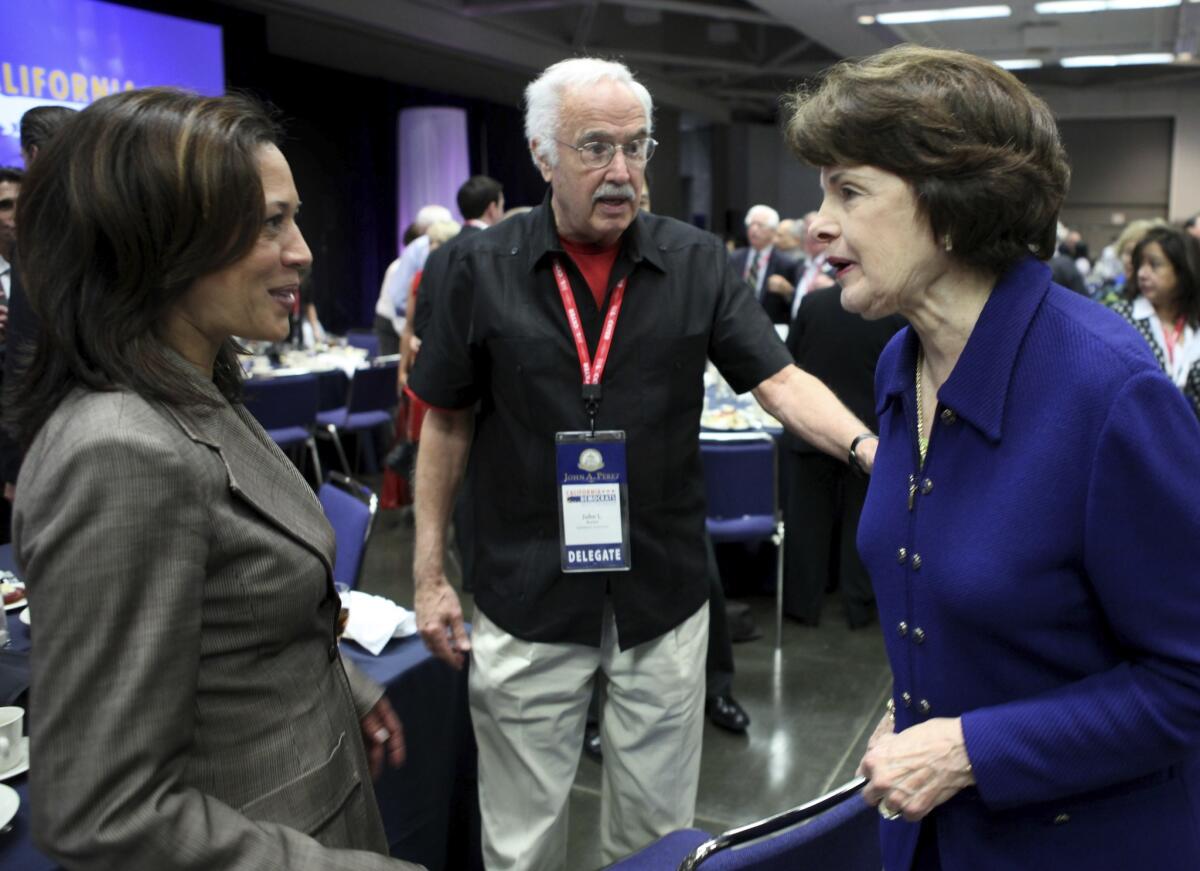
One in three California residents are covered by Medicaid, and California is thought to have the most to lose if Republicans gather enough votes to roll back major aspects of the Affordable Care Act.
California would see the nation’s biggest increase in uninsured people by next year and face a $24-billion budget shortfall by 2026 because of reduced Medicaid funding, California’s Democratic senators and Gov. Jerry Brown warned during a call with reporters on Tuesday.
The Californians’ call was just one of dozens of events House and Senate Democrats held Tuesday to try to stir up anger over the bill.
Brown called the bill divisive, saying it puts tax cuts for the wealthy above healthcare for the poor.
“This is such a political bill,” he said. “This bill will be the most divisive maneuver, cutting right into the heart of what is already a divided nation.”
The bill would increase the number of people without health coverage by 22 million and push up medical costs for millions of other poor and sick Americans, according to an analysis by the nonpartisan Congressional Budget Office.
After pledging to pass the bill this week, Senate Republicans abruptly delayed a vote until after the July Fourth recess. A handful of Republicans have announced they are leery of the bill, saying it either goes too far or doesn’t go far enough, and the White House is lobbying them to get on board.
Every major medical association has come out against the bill, which was written by a small group of senators behind closed doors. Sen. Kamala Harris said the bill is being rushed to the Senate floor without hearings, debate or much time for senators to review it.
“It’s absolutely wrong, it is harmful and it is unconscionable. The bill would restructure our nation’s entire health care system,” she said.
Sen. Dianne Feinstein said it’s not enough to amend the existing GOP bill, and Congress needs to start over instead. She said 10 or 12 Republican senators need to defect so the bill is not revived after a few changes, as a similar bill was in the House.
“I am optimistic that it is doable to kill it,” Feinstein said. “It’s the most indefensible bill I’ve actually seen in 24 years in the Senate.”
- Share via
National Republicans target California water needs in new ads against House Democrats
The National Republican Congressional Committee is going after five California Democrats for votes on a water issue.
The online ads are identical except for one line tailored to target each Democrat: Reps. John Garamendi of Walnut Grove, Ami Bera of Elk Grove, Salud Carbajal of Santa Barbara, Raul Ruiz of Palm Desert and Scott Peters of San Diego. They specifically are about the Democrats voting against a bill to funnel dam permits through a single federal agency in an effort to speed up new water storage projects.
“Tell Congressman Garamendi to stop letting politics get in the way of our water,” one ad says.
Sponsored by Rep. Tom McClintock (R-Elk Grove), the bill passed the House last week, with a 233-180 largely partisan vote.
Democrats need 24 seats to regain control of the House, and are expected to focus their attention in the midterms on tying Republicans to President Trump. Their list of seats they need to flip includes 9 of the 14 California seats held by Republicans.
The ads, which will run online for the next week, could be the first glimpse of an NRCC strategy of trying to keep the focus on local issues in the 2018 election.
“California Democrats want to help radical environmentalists more than their drought-stricken constituents. If Democrats continue to sit on their hands and let this chance to capture much-needed water float on by, the NRCC will hold them accountable,” said spokesman Jack Pandol.
- Share via
Only a few California counties may use the new state law for sending every voter a ballot in the mail
A broad effort to close thousands of California neighborhood polling places in favor of absentee ballots and multi-purpose “vote centers” has yet to find traction beyond a handful of counties.
Data collected by Secretary of State Alex Padilla’s office concludes only two counties have a plan in place to implement the sweeping change in state election law enacted last year. As many as 14 counties can do so in 2018, with Los Angeles County and others able to switch to the system in 2020.
“Change is hard,” said Jill LaVine, registrar of voters in Sacramento County, one of the counties that has already approved adoption of the system to swap polling places for a limited number of “vote centers” offering several different election services.
Meanwhile, leaders in the county that has done the most planning to move toward changing its election system -- Orange County -- have rejected the new law for 2018.
- Share via
Nurses union uses the image of a California bear stabbed in the back after single-payer bill is blocked
- Share via
As cap-and-trade deal lingers, Jimmy Gomez has still not been sworn in to Congress

Rep.-elect Jimmy Gomez will probably not be sworn in as downtown Los Angeles’ newest member of Congress until at least July 10, more than a month after he was elected to fill the empty seat in the 34th Congressional District.
Gomez, a current state assemblyman, told The Times after the election he would try to delay his Assembly resignation to help Democrats reach a two-thirds vote on extending the state’s cap-and-trade program, which requires companies to buy permits to release greenhouse gas.
Democrats hold 55 of 80 Assembly seats, more than needed for a two-thirds vote, but Gomez could be an important vote if legislative leaders can’t get some moderate Democrats on board. The high vote threshold is intended to insulate the program from future legal challenges.
After a cap-and-trade deal wasn’t included as part of the state budget vote this month, Gomez told The Times that his congressional swearing-in date would be up to House leadership. He repeated that Monday.
“I gave a commitment to be available for cap and trade until June 15 ... and I notified [Minority] Leader [Nancy] Pelosi’s office that anytime after the 15th I would be ready to be sworn-in, except the week of June 26th because [of] a family scheduling conflict,” Gomez said by text message Monday.
Because of the House’s weeklong July Fourth holiday, Gomez isn’t likely to be sworn in until at least July 10.
Discussions on the cap-and-trade program escalated between Gov. Jerry Brown and legislative leaders in Sacramento late last week, but they have yet to unite on a single bill.
Brown would like to strike a deal in July, and state lawmakers leave Sacramento for a monthlong break on July 21.
Residents of the 34th District have been without a congressman since late January, when Xavier Becerra resigned to become California’s attorney general.
House Speaker Paul Ryan (R-Wis.) on Monday will swear in Reps.-elect Karen Handel (R-Ga.) and Ralph Norman (R-S.C.), who were both elected last week. The speaker’s spokeswoman said Friday that Ryan wanted to do all three ceremonies at once, but House Minority Leader Nancy Pelosi (D-San Francisco) had not signed off on Gomez’s swearing-in. (Her staff pointed to his family scheduling conflict as the reason.)
If Gomez stays in the Assembly for the cap-and-trade vote, it could be his last vote as a member of the majority party for some time.
- Share via
Rep. Grace Napolitano to miss House votes for several weeks while husband receives cancer treatment
Rep. Grace Napolitano (D-Norwalk) will miss House votes while her husband, Frank Napolitano, undergoes chemotherapy and radiation to treat esophageal cancer, her spokesman said.
The congresswoman, 80, easily beat out former Democratic state Assemblyman Roger Hernandez of West Covina in the November election. She said in April that she would seek reelection in 2018, and her husband’s health does not change her plan to seek an 11th term, spokesman Jerry O’Donnell said.
Napolitano has missed the last two weeks of House votes, though she’s working some from the district, and is expected to remain in California for several more weeks to care for her husband during the treatment, O’Donnell said. He did not know for sure how long Napolitano would be gone, but it is possible she might make it back for some votes during the seven-week-long treatment, he said.
Napolitano said by phone she will try to return if the House votes again on the GOP health care bill.
“I intend to be back at work soon,” Napolitano said.
The House leaves Friday for a one-week break and leaves again at the end of July for the August recess.
Napolitano suffered a minor stroke in 2016 that affected her ability to write and slightly slowed her walk.
For the record, 8:47 a.m.: An earlier version of this post identified the type of cancer Napolitano’s husband has as lung cancer. It is esophageal cancer.
8:47 a.m., June 27: This post has been updated with a quote from Napolitano.
2:45 p.m. This post has been updated to correct how many terms the congresswoman has served.
2:26 p.m. This post has been updated with more details about when Napolitano might return.
This post was originally published at 2:06 p.m.
- Share via
Sen. Kamala Harris makes her pick in California’s lieutenant governor’s race
- Share via
After a career in the majority, Jimmy Gomez prepares for life in the minority in Washington
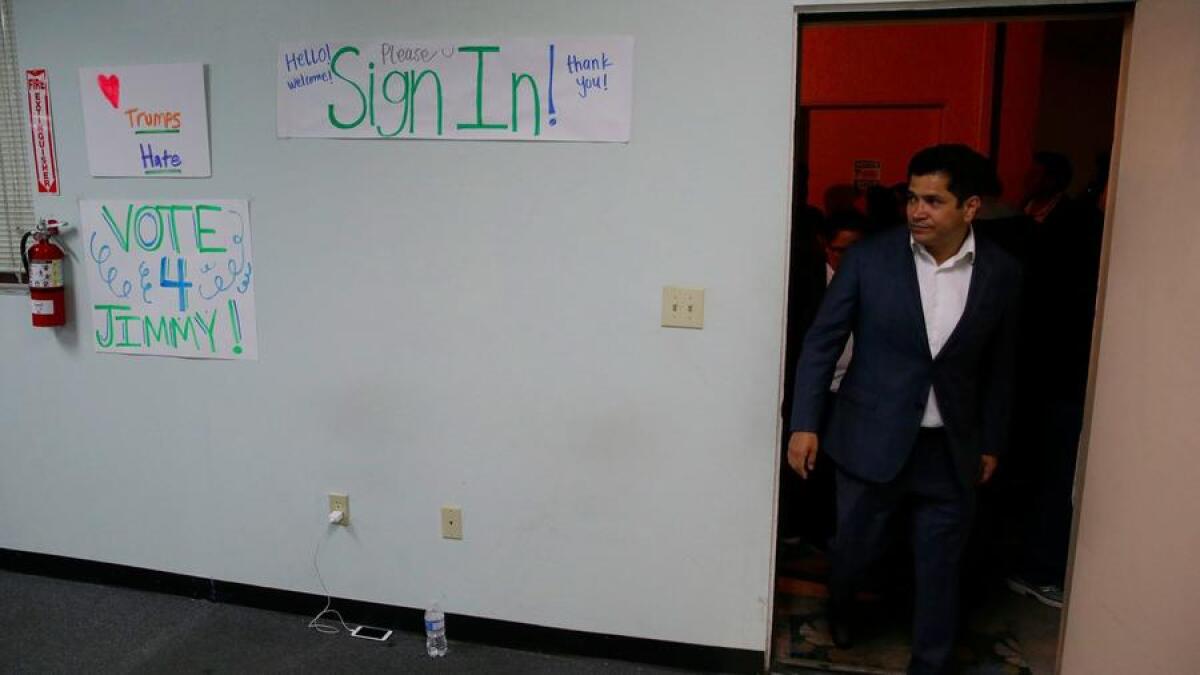
Congressman-elect Jimmy Gomez has spent his entire political career as a member of the majority party. When he’s sworn in as central and northeast Los Angeles’ newest member of Congress in the coming weeks, he’ll be the most junior Democrat — 194th out of 194 — in Congress.
He’ll have to find a path forward in a Congress dominated by the opposing party. Even if Democrats win back control, he’ll have hundreds of more senior and just as eager colleagues ahead of him in line.
- Share via
Rep. Maxine Waters focuses on GOP healthcare bill at packed town hall
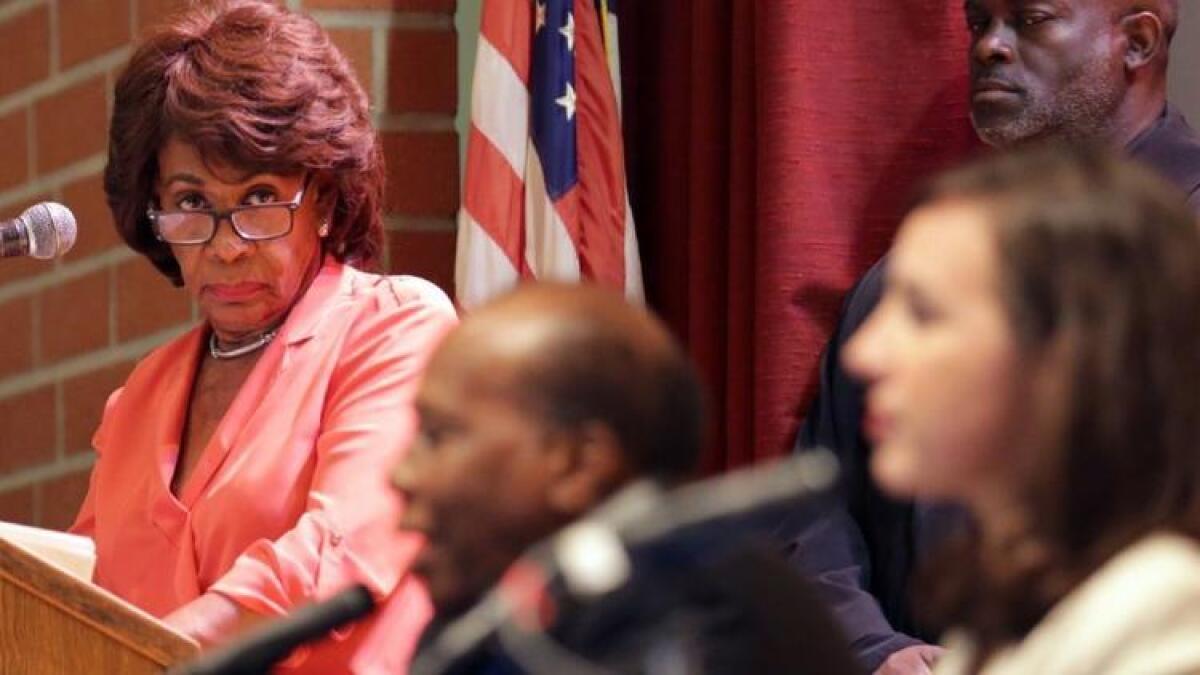
Rep. Maxine Waters, who spoke Saturday at a packed town hall meeting in Gardena, said she worries some Americans will be forced to do what her family did if the Republican healthcare bill passes.
Senate Republicans have pledged to pass a bill before the July Fourth holiday.
To illustrate why she believes everyone should have access to comprehensive healthcare, the Los Angeles Democrat said she and her 12 siblings never saw a physician or a dentist their entire childhood.
“I was born at home in St. Louis back in the day when it was hard for minorities to get into hospitals,” she said.
- Share via
This former Jeff Denham challenger won’t run again, but he’s launching a committee to elect Democrats
Two-time congressional challenger Michael Eggman says he won’t try for a third campaign against Republican Rep. Jeff Denham (Turlock), but he’s hoping to help Democrats running against the him.
Eggman, a beekeeper and farmer, announced Monday that he’s starting a political action committee to help oust Republicans in seven seats, including Denham’s in the Central Valley, which Democrats have targeted for 2018.
The committee, Red to Blue California, filed papers with the Federal Election Commission in March but so far hasn’t reported raising any money. Andrew Feldman, a spokesman for the PAC, said the group has taken in about $50,000 and its goal is to raise at least $7 million in the 2018 cycle. Eggman will serve as chair of the committee.
In a statement, Eggman said that while he lost last year, “I learned a heck of a lot on the way. Now as Donald Trump threatens to upend the very fabric of what makes our country great, I’m doing my part to join the resistance.”
In addition to Denham’s seat, the committee will target Republican Reps. Steve Knight (Palmdale), David Valadao (Hanford), Ed Royce (Fullerton), Mimi Walters (Irvine), Dana Rohrabacher (Huntington Beach) and Darrell Issa (Vista). All seven were reelected in districts won by Hillary Clinton in the presidential election.
The committee also plans to use some of the money to promote down-ballot candidates in each of the districts as a way of building a base of Democratic candidates.
Eggman, a beekeeper and farmer who received a rare endorsement from Barack Obama in the Democrats’ unsuccessful quest to take back the House last year, lost to Denham by 5% in November. Spending in that race topped $14 million.
Six Democrats have already filed to run in Denham’s 10th Congressional District, including Josh Harder, a venture capital executive whose campaign manager worked for Eggman in 2016.
- Share via
California Politics Podcast: There’s a powerful new ally of those who support a sanctuary state
Supporters of an ambitious California effort to limit law enforcement cooperation with federal immigration authorities begin the week with a prominent new ally.
On this week’s California Politics Podcast, we take a look at the impact of Los Angeles Police Chief Charlie Beck endorsing the “sanctuary state” bill that’s now under consideration in Sacramento.
We also discuss the decision by Assemblyman Travis Allen (R-Huntington Beach) to run for governor, and how his conservative politics could have a big effect on how Republican voters view their choices in 2018.
I’m joined by Times staff writer Melanie Mason and Marisa Lagos of KQED News.
- Share via
California won’t be passing a single-payer healthcare system any time soon — the plan is dead for this year
A high-profile effort to establish a single-payer healthcare system in California sputtered on Friday when Assembly Speaker Anthony Rendon (D-Paramount) decided to shelve the proposal.
Rendon announced late Friday afternoon that the bill, SB 562 by state Sens. Ricardo Lara (D-Bell Gardens) and Toni Atkins (D-San Diego), would not advance to a policy hearing in his house, dampening the measure’s prospect for swift passage this year.
“SB 562 was sent to the Assembly woefully incomplete,” Rendon said in a statement. “Even senators who voted for SB 562 noted there are potentially fatal flaws in the bill, including the fact it does not address many serious issues, such as financing, delivery of care, cost controls, or the realities of needed action by the Trump Administration and voters to make SB 562 a genuine piece of legislation.”
Rendon took pains to note that his action does not kill the bill entirely — because it is the first year of a two-year session, it could be revived next year.
But the move is nonetheless a major setback for legislation that has electrified the Democratic party’s progressive flank.
The California Nurses Assn., the bill’s sponsors and the state’s most vocal advocates for single-payer, blasted Rendon’s decision as “cowardly.”
“Acting in secret in the interests of the profiteering insurance companies late Friday afternoon abandons all those people already threatened by Congress and the Trump administration,” Deborah Burger, the union’s co-president, said in a statement.
Burger continued: “The people of California are counting on the Legislature to protect them now, not sometime next year, and as polls have shown Californians support this proposal by a wide majority. A solution to this health care emergency could be at hand; Speaker Rendon is standing in opposition.”
In a joint statement, Lara and Atkins, the measure’s authors, said they were “disappointed the robust debate about healthcare for all that started in the California Senate will not continue in the Assembly this year.”
“This issue is not going away,” they added.
Gov. Jerry Brown, who had signaled wariness about the proposal’s costs, said in a statement that Rendon “made the case that there’s clearly more work to do before anyone is in a position to vote on revamping California’s healthcare system.”
“I recognize the tremendous excitement behind the measure, but basic and fundamental questions remain unanswered,” Brown said.
Updated at 6:44 p.m.: This article was updated with a comment from Gov. Jerry Brown.
Updated at 5:38 p.m.: This article was updated to include comments from the California Nurses Assn. and the measure’s authors.
This article was originally published at 4:38 p.m.
Times staff writer Patrick McGreevy contributed to this report.
- Share via
California politicians are in Dallas despite new ban on state employees traveling to Texas
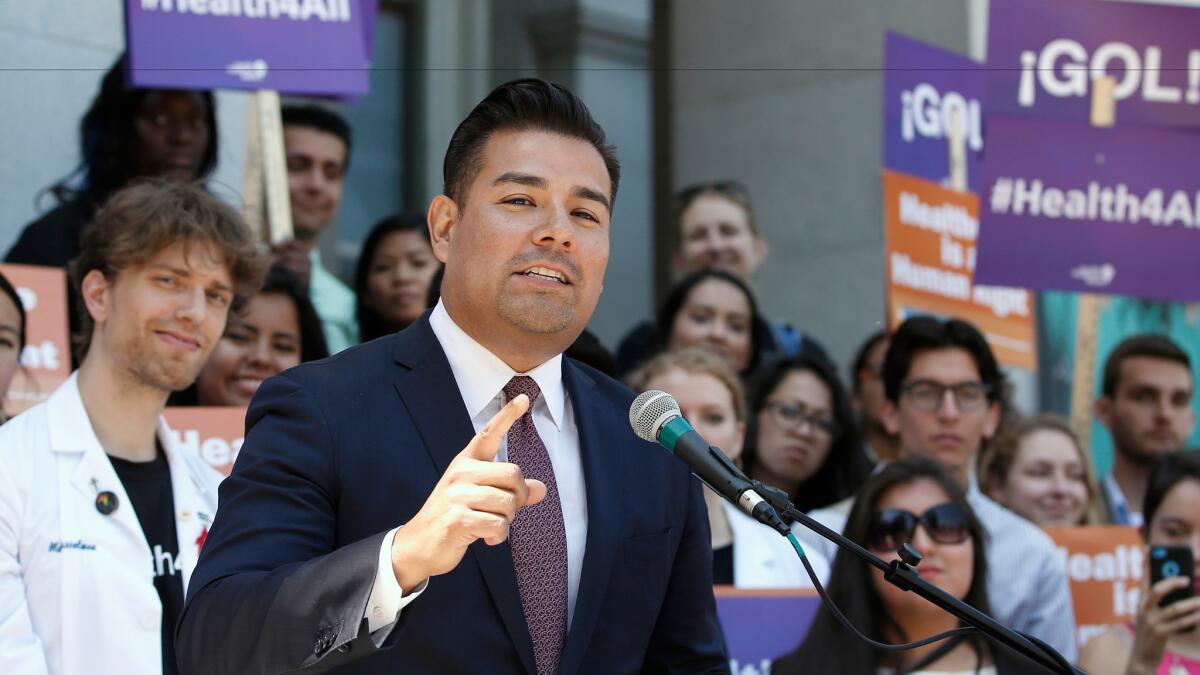
A day after California banned state employees from going to Texas on official business, a group of politicians from the Golden State was in Dallas on Friday for a major conference.
California Atty. Gen. Xavier Becerra on Thursday announced he was prohibiting state employees from traveling at state expense to Texas and three other states that he determined have approved laws that discriminate against gay and transgender people.
Sen. Ricardo Lara (D-Bell Gardens), who is openly gay, is among those attending the annual gathering of the National Assn. of Latino Elected and Appointed Officials (NALEO). A spokesman said he is using his own money, not taxpayer funds. Lara voted for the bill that enacted the travel ban.
Lara felt participating in a panel discussion on immigration was important amid debate over Gov. Greg Abbott’s signage of a controversial immigration law that bans “sanctuary cities” for immigrants in the country illegally, spokesman Michael Soller said.
“Texas just passed one of the nation’s most anti-immigrant laws with Senate Bill 4, and California went down this road with Proposition 187 more than 20 years ago,” Lara said in a statement. “With LGBT and immigrant rights under assault across the country, I thought it was important to join other Latino leaders and show California’s example.”
Like Lara, West Hollywood Mayor Pro Tem John Duran made plans to attend the Dallas convention well before Becerra announced the travel ban, which does not apply to non-state employees.
Duran is the national chairman of NALEO and said the conference was scheduled for Dallas three years ago.
“I don’t know about the LGBT laws in Texas or AG Becerra’s call for a boycott -- I am not only LGBT but also Latino,” Duran said in an email, adding he is “very angry” over Texas’ SB 4, which requires law enforcement to cooperate with federal immigration officials in enforcing immigration laws.
“I am here supporting my elected official colleagues in Texas from Austin, Houston, San Antonio and Dallas who are joining together to sue the state of Texas,” Duran said. “Being a Californian who worked against Gov. Pete Wilson’s Prop 187 -- I have experiences and strategies to share with them.”
- Share via
Texas responds to California LGBT travel ban, saying Golden State firms ‘fleeing over taxation and regulation’
A day after California officials said they are banning state workers from traveling to Texas on official business, an aide to Republican Texas Gov. Greg Abbott returned a verbal volley claiming mistreatment of businesses.
On Thursday, California Atty. Gen. Xavier Becerra said Texas and three other states were being put on a list of states that had adopted laws seen by Becerra as discriminatory to the LGBT community and therefore were off-limits for state-sponsored travel.
That drew a response Friday from John Wittman, Abbott’s press secretary.
“California may be able to stop their state employees, but they can’t stop all the businesses that are fleeing over taxation and regulation and relocating to Texas,” Wittman said.
Becerra put Texas on the travel-ban list after the governor signed HB 3859 last week. The new law allows foster care agencies to deny adoptions and services to children and parents based on “sincerely held religious beliefs.” Becerra said the measure allows agencies to discriminate against children in foster care and potentially disqualify LGBT families from the state’s foster and adoption system.
A spokesman for Kentucky Gov. Matt Bevin also criticized California officials.
“It is fascinating that the very same West Coast liberals who rail against the President’s executive order, that protects our nation from foreign terrorists, have now contrived their own travel ban aimed at punishing states who don’t fall in lockstep with their far-left political ideology,” said Woody Maglinger, Bevin’s press secretary.
Updated at 1:35 pm to include comment from Woody Maglinger.
- Share via
Rep. Tom McClintock’s bill to streamline dam permits passes House largely on party lines
Dam permits would be funneled through a single federal agency in an effort to speed up new water storage projects under a bill that passed the House on Thursday.
Sponsored by Rep. Tom McClintock (R-Elk Grove), the 233-180 vote was largely along partisan lines. Reps. Jim Costa (D-Fresno), Lou Correa (D-Santa Ana) and six other Democrats joined with Republicans to pass the bill.
McClintock said the various local, state and federal agencies that must sign off on new projects don’t have to communicate or set deadlines, and often require redundant information from permit applicants, which can make the application process drag on for years and drive up costs.
“Dam applications can go on endlessly,” McClintock said after the vote. “A lot of these projects become cost prohibitive.”
He pointed to a dam project proposed by the town of Foresthill in his district as an example. Conflicting demands from several federal agencies about a plan to install a spillway gate on the dam at the Sugar Pine Reservoir have driven up the cost, he said. The project application is still under review.
“So a $2-million project that was a heavy lift for a little community, but within reach, becomes an $11-million cost-prohibitive boondoggle,” McClintock said.
Under the bill, the Bureau of Reclamation would coordinate with other federal agencies on all aspects of a dam application and set deadlines for deciding whether to approve a project.
Democrats who voted against the bill said the bureau would be able to set arbitrary deadlines for the at-times lengthy environmental reviews required for water projects, which could undermine reviews required by laws like the Endangered Species Act and the Clean Water Act.
“Fixing the process isn’t just about saving some headaches or a few hours of time. This is about making sure millions of people in California and across America have the water they need and deserve,” said Majority Leader Kevin McCarthy (R-Bakersfield).
Sen. John Barrasso (R-Wyo.) has filed similar legislation in the Senate, and McClintock said he is cautiously optimistic it will pass.
- Share via
California Atty. Gen. Xavier Becerra expands ban on government-sponsored travel to ‘discriminatory’ states
California Atty. Gen. Xavier Becerra said Thursday that state employees will be prohibited from official travel to four additional states — Alabama, Kentucky, South Dakota and Texas — based on his determination that they have enacted laws that are discriminatory toward sexual orientation and gender identification.
“Each of those states in the recent weeks have enacted legislation that may deprive some of the individuals of those states and individuals who visit those states of their constitutional rights,” Becerra said during a news conference in San Francisco.
The state Legislature approved a bill last year that prohibits state-sanctioned travel to North Carolina, Mississippi, Kansas, Tennessee and other states that have laws that discriminate based on sexual orientation or gender identity.
The measure was in response to a North Carolina bill that overturned an ordinance in the city of Charlotte that allowed transgender people to use public restrooms based on the gender with which they most identify.
“There are consequences to discrimination,” Becerra said. “Restricting state-sponsored travel is a consequence.”
- Share via
Gov. Jerry Brown says Senate healthcare bill has ‘same stench’ as House version
- Share via
California’s doctors in Congress don their white coats to criticize GOP healthcare bill
- Share via
Travis Allen, a conservative and controversial Orange County lawmaker, jumps into California governor’s race
Conservative Orange County Assemblyman Travis Allen (R-Huntington Beach) is jumping into California’s 2018 race for governor, a move that could splinter the GOP vote in what promises to be a crowded and competitive race.
Travis, elected to the Legislature in 2012, said he decided to run because of the years of “wasteful spending and dictatorial policies pushed by Jerry Brown and the Sacramento Democrats.”
“I am running to be the next governor of California to take back our state for the forgotten ordinary citizens of California, who will no longer tolerate the squandering of our incredible natural abundance of people, economy, and resources by limousine liberals beholden to ravenous public sector union bosses and extremist environmentalists,” Travis said in a statement announcing his campaign.
Outspoken and controversial, Travis has filed a ballot measure to repeal the recently approved gas tax and sponsored legislation requiring voters to show photo ID.
Allen has faced criticism for claiming that a new law that barred police from arresting people under 18 for soliciting sex or loitering with intent to commit prostitution was an effort to “legalize” child prostitution. The purpose of the law was to treat minors as victims of sex trafficking rather than offenders.
Allen, 43, worked as a certified financial planner before he ran for the Legislature. His Assembly district includes all or portions of Seal Beach, Huntington Beach, Fountain Valley and Garden Grove.
Allen will face stiff competition from fellow Republican John Cox, a Rancho Santa Fe venture capitalist who already has put $3 million of his own money into his campaign. Former GOP Assemblyman David Hadley of Manhattan Beach also is exploring a run, and former Los Angeles Rams football player Rosey Grier announced plans to jump into the race but thus far has not established an official campaign.
The race also has attracted a cadre of Democratic heavyweights, including Lt. Gov. Gavin Newsom, former Los Angeles Mayor Antonio Villaraigosa and state Treasurer John Chiang. Delaine Eastin, a former state legislator and state schools’ chief, is also running.
In California, Democrats hold a 19-percentage point advantage over Republicans in voter registration, a strong head wind against GOP candidates running for statewide office.
Because of the large field of Democrats in the race, a Republican could have a good shot of finishing in the top two in the June 2018 primary if they can put together GOP support. But Allen’s entry into the race could divide Republican voters, reducing the odds of a GOP candidate making it to the November general election.
The first- and second-place finishers in the primary advance to the general election regardless of their party.
- Share via
Pelosi on rumbles for new leadership: ‘I’m worth the trouble, quite frankly’
House Minority Leader Nancy Pelosi on Thursday dismissed calls from some in her party who say it’s time for her to step aside.
A handful of Democrats have publicly said that after losing four special elections since January, especially a race in the Atlanta suburbs earlier this week, and failing to regain the majority in the House in the last four national elections, their party needs new leadership in the House. Others have privately said Pelosi weighs down Democrats and could prevent the party from retaking the House in the upcoming midterm elections.
In her weekly news conference, the San Francisco lawmaker called herself a “master legislator” and a “strategic, politically astute leader” who can raise a lot of money and has experience winning a majority in Congress.
With Republicans controlling both chambers, and President Trump in the White House, now isn’t the right time for new leadership, she said.
“I’m worth the trouble, quite frankly,” she said. “I love the fray.”
- Share via
Coastal panel spawned by 1930s oil scandal now a player in governor’s race

When John Chiang joined the State Lands Commission, it quickly became a platform to showcase his environmental record, starting with his 2007 vote to block construction of a shipping terminal for liquefied natural gas in Ventura County.
The commission has served the same purpose for Gavin Newsom, who often uses his seat on the panel to remind Californians that he opposes offshore oil drilling.
Now that both Chiang and Newsom are running for governor, they are drawing rare attention to the little-known but powerful State Lands Commission, which oversees 4 million acres of land beneath California waters.
- Share via
Ballot measure to expand L.A. County Board of Supervisors advances
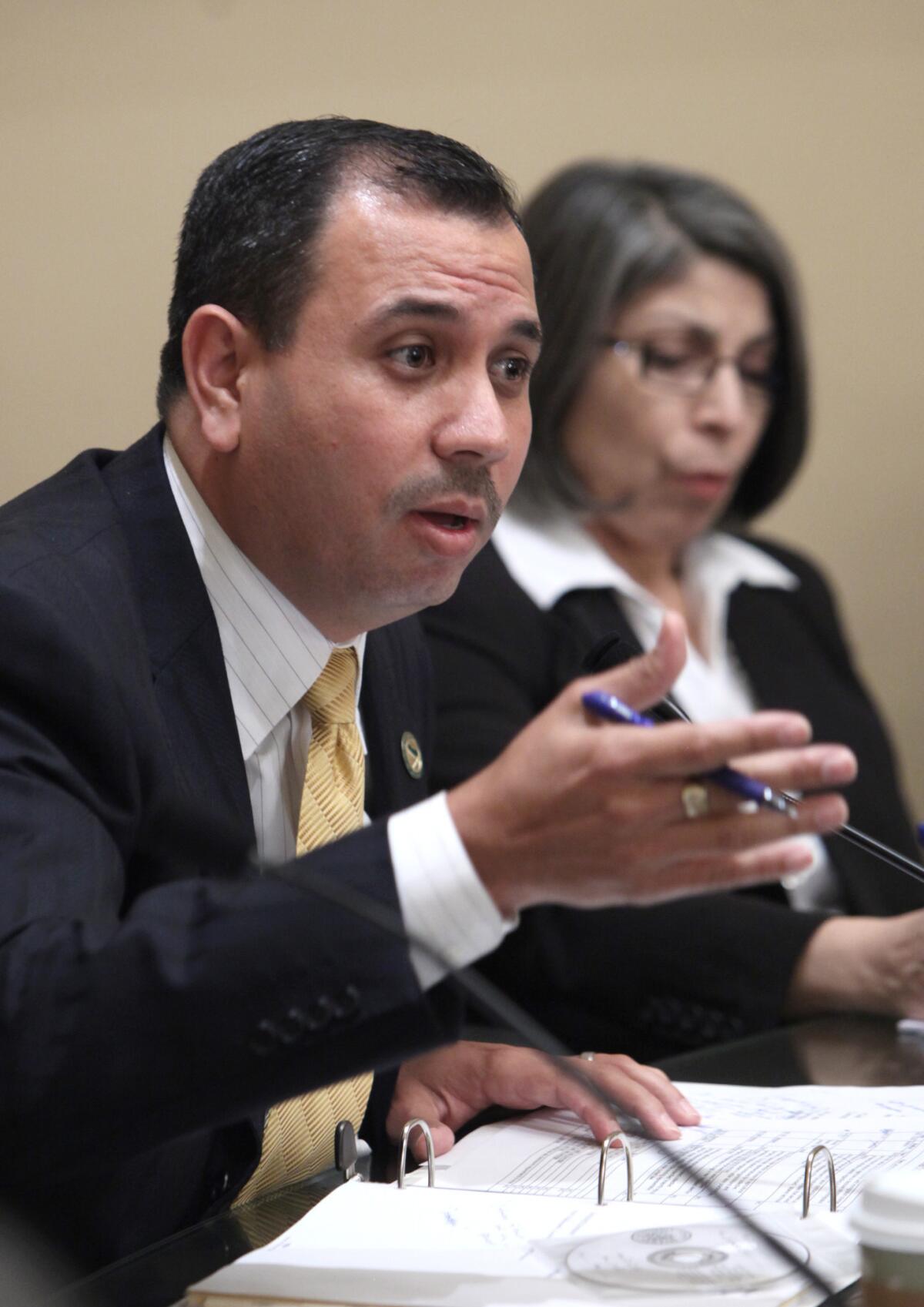
The Los Angeles County Board of Supervisors would be expanded from five to seven members and an elected chief executive post would be created under a measure recommended Wednesday by a state Senate panel despite opposition from the county.
Two members of the county’s 2015-16 civil grand jury testified that the group felt the current government is inadequate for a county of more than 10 million residents. They said that if the county was a state, it would be the eighth-largest state in the country based on population.
“The board is too small to adequately serve the diverse needs of county residents,” grand jury member Molly Milligan told the Senate Governance and Finance Committee, before its 5-1 vote to recommend Senate Constitutional Amendment 12. The proposed statewide ballot measure was introduced by Sen. Tony Mendoza (D-Artesia).
The proposal was opposed by Phyllis Marshall, the chief legislative representative for Los Angeles County, who noted that the proposal would allow voters statewide to decide the governance structure for one county.
“Voters in other counties do not have sufficient knowledge to vote on a constitutional amendment to change the governing structure of Los Angeles County,” Marshall told the panel before the measure was sent to another policy panel on its way to a possible full Senate vote.
- Share via
Kimberly Ellis blames Democratic Party ‘hacks’ for losses in Tuesday’s congressional races

Kimberly Ellis, who has challenged the results of the California Democratic Party leadership election she lost, blamed party “establishment hacks” who are the “worst in the biz” for losses in congressional races in Georgia and South Carolina on Tuesday.
Ellis, a progressive Bay Area Democrat who tapped into a wellspring of disaffected Bernie Sanders backers, on Tuesday night sent a tweet saying that it was “time for a new coalition.”
That drew a sharp rebuke from veteran Democratic operative Bob Mulholland, who has criticized Ellis for not conceding.
Ellis blamed her narrow May loss to Eric Bauman for state Democratic Party chairperson on voting irregularities. Ellis, who lost the race by 62 votes,has called on the party to conduct an independent audit of the election.
Bauman rejected that request, saying the party already has a process in place to review contested elections. The party’s compliance review commission, made up of six members who were appointed during former chairman John Burton’s tenure, is currently reviewing the election.
On Friday, Bauman announced that the party hired the law firm of Olson Hagel & Fishburn LLC to “oversee, advise and counsel” the commission during the inquiry.
- Share via
These legislators are trying to make sure Jimmy Gomez’s replacement in the Assembly is a woman
As soon as Congressman-elect Jimmy Gomez announced he was running for Congress, his Assembly colleague Cristina Garcia got to work.
Garcia, a legislator from Bell Gardens who became chair of the Women’s Legislative Caucus in December, called Gomez, other Assembly members, and labor and environmental groups to make it clear: If Gomez won the 34th Congressional District and vacated his Assembly seat, her priority would be electing a woman in his place.
With Gomez headed to Washington after his June 6 win, Garcia said it’s time to put her group’s plan into action.
“It’s simple,” said Garcia in a recent interview. “As long as we don’t have parity, we’re going to fight at every opportunity to try to get another woman in office.”
Women hold 17 out of 80 seats in the state Assembly and nine of 40 of the state Senate seats.
On Wednesday morning, the Democratic arm of the women’s legislative caucus announced it was endorsing Wendy Carrillo, a Democrat who ran in the 34th District primary against Gomez, and who is the only woman running to replace him so far.
“I am impressed by her ongoing activism for environmental justice, women’s rights, LGBTQ rights, immigrants and social justice movements that are the bedrocks of a progressive democracy and welcome the tenacity she will bring to further promote these issues in the state Legislature with a woman’s perspective,” Garcia said in a statement.
Eight other candidates have filed to run for or have announced campaigns for Gomez’s 51st Assembly District. The election date and its accompanying filing deadlines have not yet been set, mainly because Gomez has not stepped down, so another woman could still jump in.
But Garcia is hoping her caucus’ announcement will head that off.
“If the 34th Congressional District race is going to teach us any lessons, it’s that we don’t have the luxury of having multiple women split the field,” Garcia said.
More than a dozen women ran in the crowded primary to replace Xavier Becerra in the central Los Angeles District. None of them won more than 10% of the vote.
So Garcia and her colleagues haven’t just been talking about their mission; they’ve been trying to shape the field of candidates, too. Garcia said she reached out to former 34th District hopefuls to gauge their interest, solicited names of potential female candidates from interest groups, and had conversations with half a dozen women who were considering jumping in.
Garcia said she didn’t discourage any women, but was up front with them about the challenges each might face. She’s also encouraged women who expressed interest to “work it out among themselves” in hopes that they could unite behind one female candidate.
It’s a somewhat new tactic for the women’s caucus, which has struggled to unite on political endorsements in the past and is hoping to flex more muscle in Sacramento.
“We are being more strategic now,” Garcia said. “It can’t just be like, ‘I like you and you have a great heart.’ That’s not good enough. You have to put in the work and be able to build a coalition and win.”
Carrillo said it was “unfortunate” that none of the women in the 34th District race made it past the primary. But, she added: “Men don’t get asked the question of whether they’re worried about splitting the vote.”
The outcome in the congressional primary, Carrillo said, had more to do with a lack of money flowing to many of the womens’ campaigns, something she hopes to remedy.
“I’ve learned a lot ... [about] just what it takes to build coalitions and how best to move forward in terms of having a strategy to win,” Carrillo said.
“Ultimately, the voters are going to decide based on issues,” Carrillo said. “I think that I bring a very unique perspective, having grown up in the district, in terms of advocating for labor and for education and for healthcare and all the issues that residents care for.”
------------
FOR THE RECORD
June 21, 2:53 p.m.: An earlier version of this article incorrectly stated that Cristina Garcia became chair of the Women’s Legislative Caucus in January. She took over the position in December.
------------
- Share via
Prompted by San Bernardino shooting, House passes bill to require reports to Congress after terrorist attacks

Intelligence agencies would have to make recommendations to Congress on how to stop the next domestic terrorist attack under a bill inspired by the 2015 San Bernardino shooting.
The bill, which passed the House on Tuesday without opposition, requires the Homeland Security secretary to submit a report to Congress within one year of a terrorist attack in the U.S. The report, which would be unclassified, must include details of what happened and recommendations for laws or policies that can be changed to prevent a similar attack. It would also include input from the attorney general, FBI director and the head of the National Counterterrorism Center.
Rep. Pete Aguilar (D-Redlands), who represents San Bernardino, filed the bill about a year after the Dec. 2, 2015, shooting in which 14 people were killed and 22 were wounded by a married couple at the Inland Regional Center.
Aguilar told The Times that individual members of Congress shouldn’t have to press agencies for details about what happened after an attack.
“By nature every terrorist event is unique, and so we need something to prod the agencies to tell us why it’s unique and what we can do better,” Aguilar said. “There is no current requirement for the agencies to submit a report to Congress after a terrorist event. We think that it makes sense to do that and that it will help us learn from these events and become smarter about it.”
After the San Bernardino attack, the Justice Department worked with the Police Foundation, a Washington-based research group, to create a report, but it was aimed at training law enforcement on responding to an attack.
“We think there are more lessons to be learned, but that only happens when those agencies work with Congress on what we can change,” Aguilar said.
The bipartisan bill was backed by nine other Californians: Reps. Ken Calvert (R-Corona), Paul Cook (R-Yucca Valley), Lou Correa (D-Santa Ana), Nanette Barragan (D-San Pedro), David Valadao (R-Hanford), Jeff Denham (R-Turlock), Steve Knight (R-Palmdale), Darrell Issa (R-Vista) and Duncan Hunter (R-Alpine).
Aguilar said he is still working to line up a sponsor for the bill in the Senate.
- Share via
New super PAC targets seven California Republicans
Former Northern California Rep. Ellen Tauscher has launched a new super PAC targeting seven vulnerable Republicans in the state’s congressional delegation, hoping to aid the Democratic effort to win control of the House of Representatives in 2018.
Each Republican represents a district that backed Hillary Clinton in the November election.
On the Fight Back California PAC’s list are Reps. Jeff Denham of Turlock; David Valadao of Hanford; Steve Knight of Palmdale; Ed Royce of Fullerton; Mimi Walters of Irvine; Dana Rohrabacher of Huntington Beach and Darrell Issa of Vista.
Of those, the former congresswoman served with Issa, Royce and Rohrabacher.
“This isn’t personal,” Tauscher said. “But the fact is that I’m a Californian, and they don’t vote in the interest of my state.”
Tauscher represented Northern California’s 10th Congressional District for 14 years before becoming undersecretary of State during the Obama administration in 2009.
Katie Merrill, the PAC’s political strategist, said the campaign will target the Republicans’ records on issues that directly affect voters in the district, such as the GOP’s efforts to repeal the Affordable Care Act.
“We intend to soften the ground. So when the Democratic nominee emerges ... they are facing a significantly weakened incumbent,” Merrill said.
Updated at 4:02 p.m.: This story was updated to include a comment from Tauscher.
- Share via
Overhaul of California’s state tax board plagued by confusion, members say
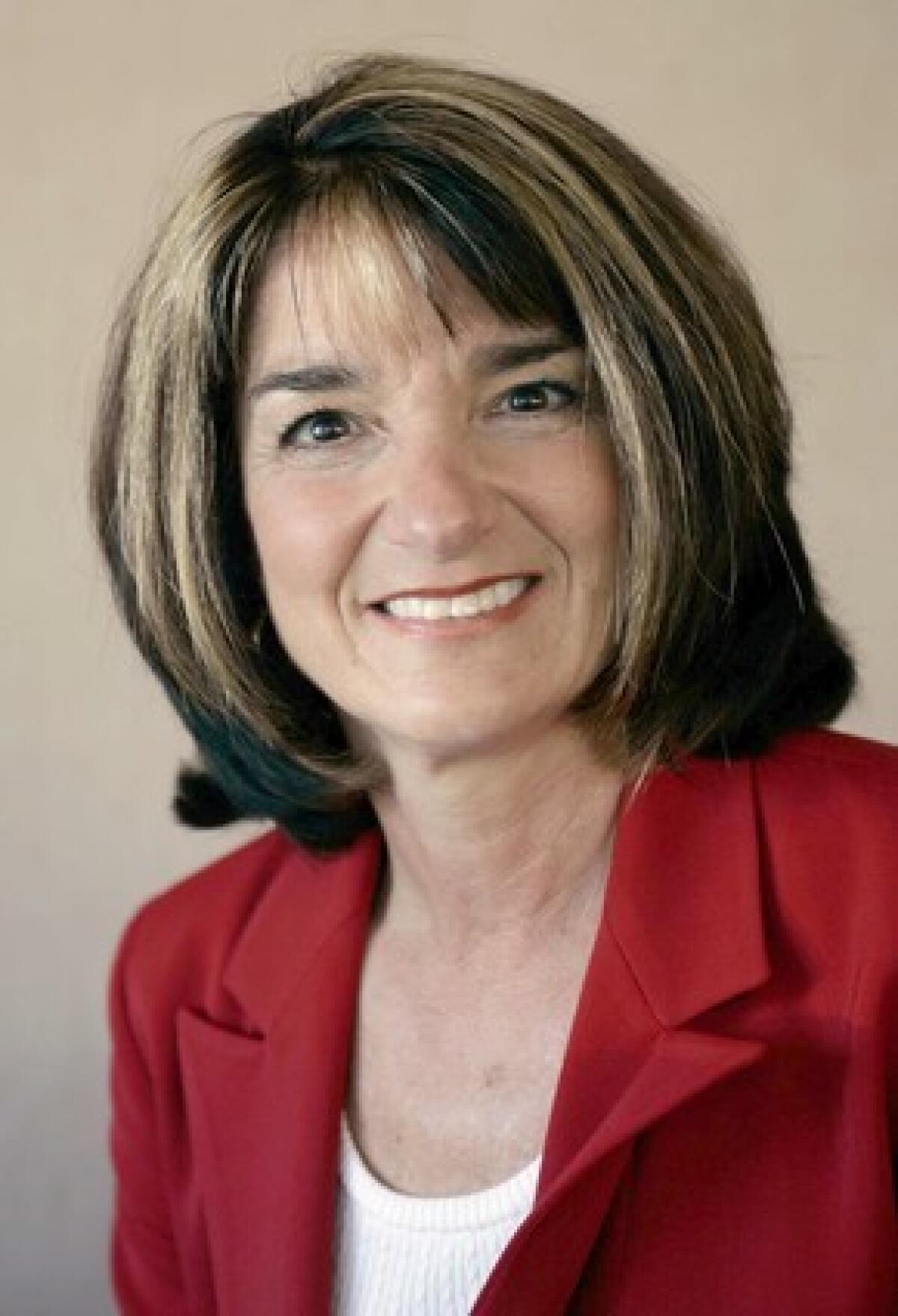
State tax board members on Tuesday said there remain a lot of unanswered questions about how their agency will transfer many of its duties to two new offices, a reorganization approved last week by the state Legislature in response to problems with the panel.
About 4,400 of the state Board of Equalization’s 4,800 employees will be transferred to a new California Department of Tax and Fee Administration, which will take over collection of sales and excise taxes, and an office of administrative law judges who will take over taxpayer appeals. The change was outlined by the board’s executive director, David Gau, at a meeting with the panel Tuesday.
“I don’t think anything is easy,” Board Chairwoman Diane Harkey said in an interview with the Los Angeles Times. “I think it’s going to be expensive. There is a lot of confusion.”
Board member George Runner said there are questions about whether he can continue to hold educational events for taxpayers, while board member Jerome Horton said he wants to know whether he can continue to advocate for taxpayers.
“There are still some issues they need to work out,” Horton said.
Harkey said new bills will have to be approved with clarifying language on some issues. For instance, the newly approved legislation takes away the board’s power to hear appeals after July 1 even though lawmakers want the board to continue handling the hearings until the new administrative law judges are operating Jan. 1.
In addition, the board employs civil service workers who are trained for jobs that will no longer exist with the board, she said, adding that the new department is supposed to begin operating July 1.
“This is all still in flux. It’s a huge step to take in a couple of weeks,” Harkey said.
Marybel Batjer, secretary of the California Government Operations Agency, has addressed the board employees, assuring them that they will be able to shift to jobs in the new department. She told The Times on Tuesday that planning has already begun for the new department, including the early stages of recruitment of its administrative staff.
Meanwhile, board representatives, including Harkey, confirmed that investigators from the state attorney general’s office have begun interviewing agency employees after Gov. Jerry Brown called for a probe into whether staff and resources were mishandled by the agency.
“We’re just hearing that they are around,” Harkey said of investigators. “I think it scares everybody.”
- Share via
Sister of Sen. Kamala Harris is hired as a political analyst by MSNBC
- Share via
California’s Clean Air Act waiver should be yanked, Trump’s former environmental advisor says

The head of President Trump’s Environmental Protection Agency may not be prepared to battle California over air regulations, but the man who led Trump’s transition team for the department is ready.
Myron Ebell, who works at the Competitive Enterprise Institute in Washington and helped devise Trump’s environmental agenda, said California should not be allowed to set its own standards for greenhouse gas emissions from vehicle tailpipes.
The state has that authority under a Clean Air Act waiver granted by President Obama, one of dozens that have been issued over the years.
“The waiver has to go, in my view,” Ebell told journalists on Monday at a training program organized by the National Press Foundation.
The problem, he said, is that the California regulations are a backdoor attempt to regulate fuel economy, a power that’s reserved for the federal government.
California said it would push forward on greenhouse gas rules earlier this year even though the Trump administration has opened the door to rolling them back on the federal level.
EPA Administrator Scott Pruitt had previously suggested that the Trump administration could try to revoke California’s waiver, but during a recent Capitol Hill hearing he said it wasn’t currently under review.
Ebell has denied mainstream science on global warming. But apart from the waiver he wants to see revoked, he told journalists that he didn’t have a problem with California trying to reduce its own greenhouse gas emissions.
“I believe in competitive federalism,” he said.
The only problem, Ebell said, is whether Gov. Jerry Brown tries to conduct his own foreign policy and sign international treaties.
- Share via
A new audit says some California agencies sidestepped competitive bidding rules on contracts
Two California agencies in charge of high-tech projects failed to provide proper oversight for billions of dollars in contracts awarded without competitive bidding, according to a state audit released Tuesday.
State law requires the Department of General Services and the California Department of Technology (CDT) to use the competitive bidding process whenever possible “to ensure fair competition and eliminate favoritism, fraud, and corruption,” State Auditor Elaine Howle wrote in a letter to Gov. Jerry Brown.
The investigation examined a sample of those contracts and found nine noncompetitive requests valued at almost $1 billion that “agencies likely could have avoided had they engaged in sufficient planning,” Howle wrote.
The auditors cited approval of a request by the California High-Speed Rail Authority for a $3-million noncompetitive contract amendment to provide financial consulting services. The proposal was submitted 17 days before the existing contract was set to expire.
“When justifying its noncompetitive request, High-Speed Rail stated that the financial consulting services were critical to its mission and that the vendor’s skills were ‘specialized and not widely available.’ However, it did not provide a valid reason why this vendor alone could meet the state’s needs, as financial consulting services are not unique,” the audit found.
In all, auditors estimated that the state awarded at least $44 billion in noncompetitive contracts of more than $1 million each during the five fiscal years ending June 30, 2016.
The two agencies have the power to enforce contract rules but “they rarely employed them, allowing agencies to continue inappropriately using noncompetitive requests,” the audit concluded.
State workers also allegedly wrote reports in ways that misled about which projects were competitively bid. In one case, a $3-million contract was identified as competitively bid, to which an additional $31 million in noncompetitive contracts was added through nine amendments.
Amy Tong, director of the California Deptartment of Technology, agreed with the auditor’s recommendations, saying the agency “believes that the recommendations will strengthen CDT’s oversight of information technology and telecommunication procurements, especially those acquired through the noncompetitive request process.”
Daniel C. Kim, director of the Department of General Services, also agreed to improve the process, writing to auditors that his agency “will take appropriate action to address the issues presented in the report.”
- Share via
Billionaire environmental activist Tom Steyer has a big decision to make
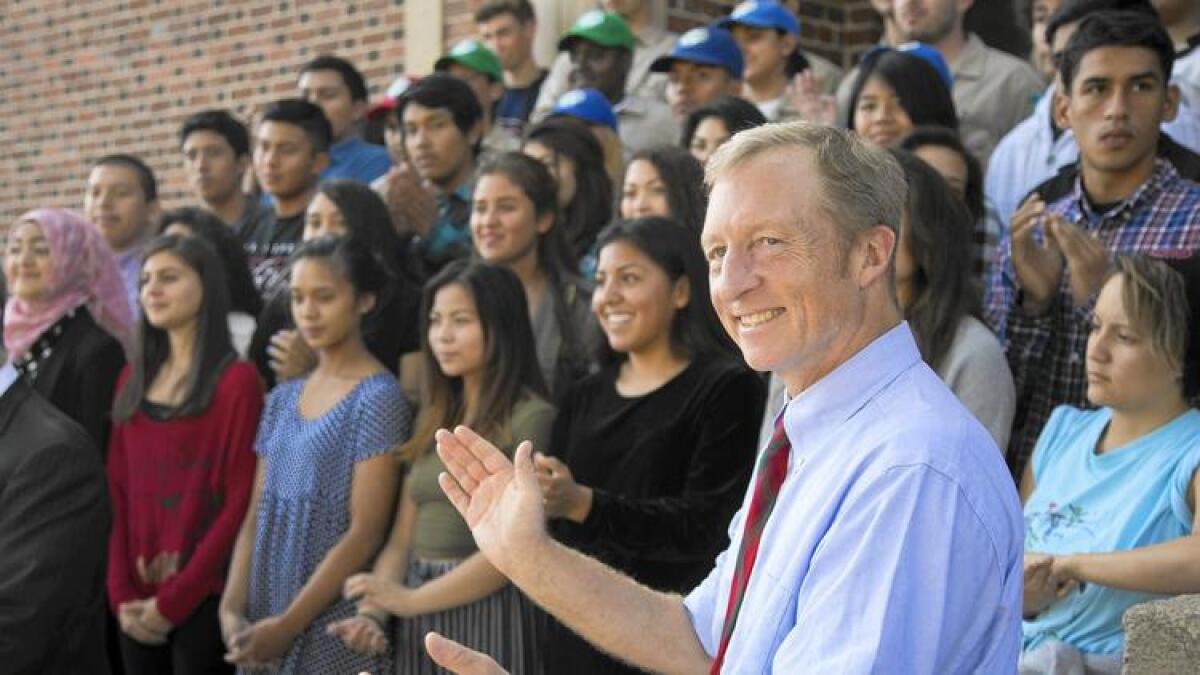
For months, billionaire Democratic donor and environmental activist Tom Steyer has been acting like a candidate running for governor – hobnobbing with Democratic loyalists, putting out a position paper on income inequality and continuing his aggressive efforts to combat climate change.
Steyer says he’s still considering jumping into the race. But he may have another target on his radar.
Steyer has starting mounting his own challenge to President Trump, going so far as to call for impeachment and use his nonprofit, NextGen Climate, to encourage citizens to lobby their congressional representatives for it.
- Share via
Kamala Harris celebrates Warriors win with beer she won in a bet from an Ohio senator
Begrudgingly wearing Steph Curry’s No. 30 jersey, and trash talking throughout, Sen. Sherrod Brown of Ohio delivered Ohio beer to Sen. Kamala Harris on Tuesday.
The two Democrats bet each other some local beer that their home state teams would win the NBA championship, and after the Golden State Warriors won in five games against the Cleveland Cavaliers, it was time for Brown to pay up.
- Share via
‘An affront to our democratic system:’ Feinstein and Harris join Democrats’ healthcare protest on Senate floor
- Share via
Gavin Newsom wins backing of former Democratic chair in race for California governor
- Share via
Lobbying firm fined $4,000 for violating gift limit buying dinner for former state Sen. Ronald Calderon
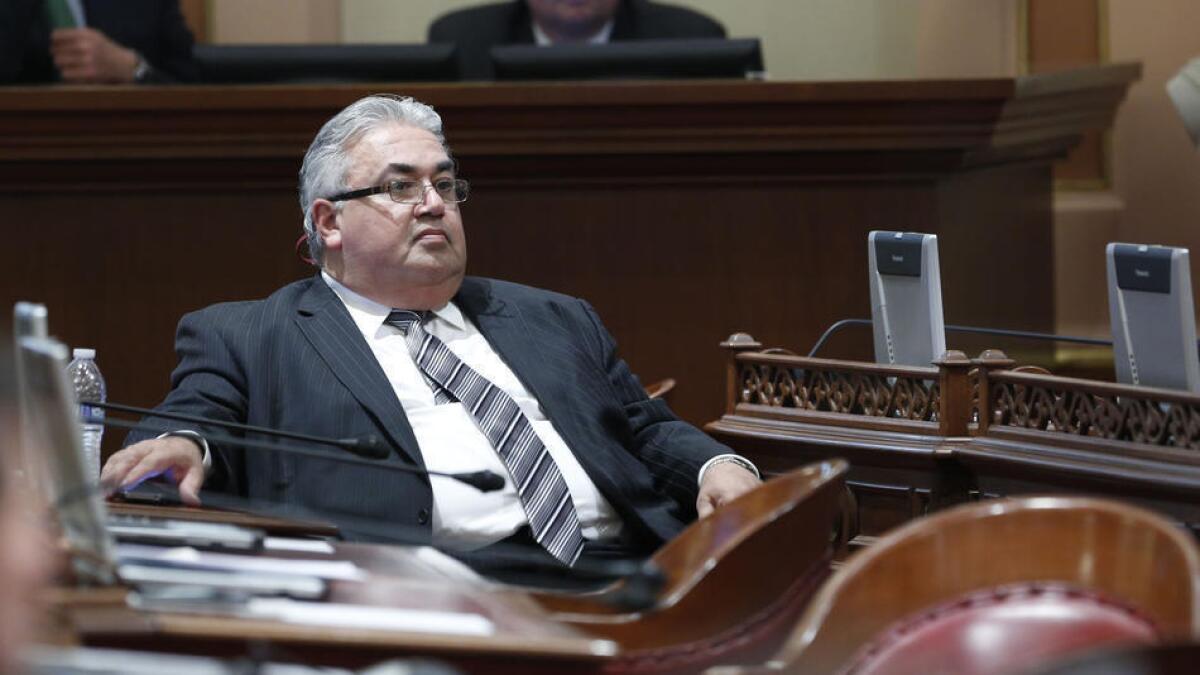
Mercury Public Affairs has agreed to pay $4,000 in fines to California’s ethics watchdog agency for violating the $10 gift limit on lobbying firms when it provided dinners worth $200 to former state Sen. Ronald Calderon and his wife.
In October, Calderon was sentenced to 42 months in federal prison after he pleaded guilty in a public corruption case unrelated to the Mercury dinner.
The fines proposed against Mercury by the enforcement staff of the state Fair Political Practices Commission stem from violating the $10 gift limit and failing to report that Calderon’s wife also received a dinner, according to the investigative report.
Calderon and his wife attended an April 2013 dinner paid for by Mercury at Mastro’s in Beverly Hills. Also present was former Assembly Speaker Fabian Nunez, a non-lobbyist partner of Mercury, and four other unidentified people.
The violation of the state Political Reform Act was found by a random audit by the state Franchise Tax Board.
“Mercury’s $200 gift to Sen. Calderon, while not extravagant, significantly exceeded the gift limit,” the investigative report said. “A central purpose of the act is to prevent improper influence by lobbyists and the act’s strict gift limit on lobbying firms is intended to effectuate that purpose.”
The commission will vote on the fines on June 29.
- Share via
California bill aims to revive broadband privacy rules that were killed by Trump and Congress

Several months ago, President Trump signed into law a repeal of sweeping privacy regulations limiting what broadband providers can do with customer data. Now, an Assembly Democrat is trying to resuscitate those rules for Californians.
Assemblyman Ed Chau (D-Monterey Park) unveiled a measure on Monday that would largely enshrine the sputtered federal regulations into California state law. The bill would require Internet service providers, such as Verizon, Comcast and AT&T, to get permission from customers before using, selling or permitting access to data about their browsing history.
Such restrictions were crafted by the Federal Communications Commission under the Obama administration. But the FCC under Trump sought to roll back those rules before they went into effect. Congress approved the repeal in March, and the president signed it.
“Congress and the administration went against the will of the vast majority of Americans when they revoked the FCC rules,” Chau said at a news conference, adding that with his measure, AB 375, “California is going to restore what Washington stripped away.”
California is the 20th state to introduce a bill to restore privacy rules in the wake of the action in Washington. Supporters of the bill acknowledged that they’ll face stiff opposition from Internet service providers and a possible challenge over whether these state-level regulations conflict with federal law.
Ernesto Falcon, legislative counsel for the Electronic Frontier Foundation, said he was confident the proposed bill would not be preempted by federal law, because communications law has traditionally allowed a division of responsibilities between the state and federal government.
Joining Chau at a Capitol news conference was an array of privacy advocates and consumer groups boosting the bill.
“AB 375 means that no Californian will be forced to pay for access to the Internet with their money and their privacy rights,” said Becca Cramer, legislative coordinator for the American Civil Liberties Union of California.
- Share via
Gov. Jerry Brown and California legislators are granted pay raises by citizens panel
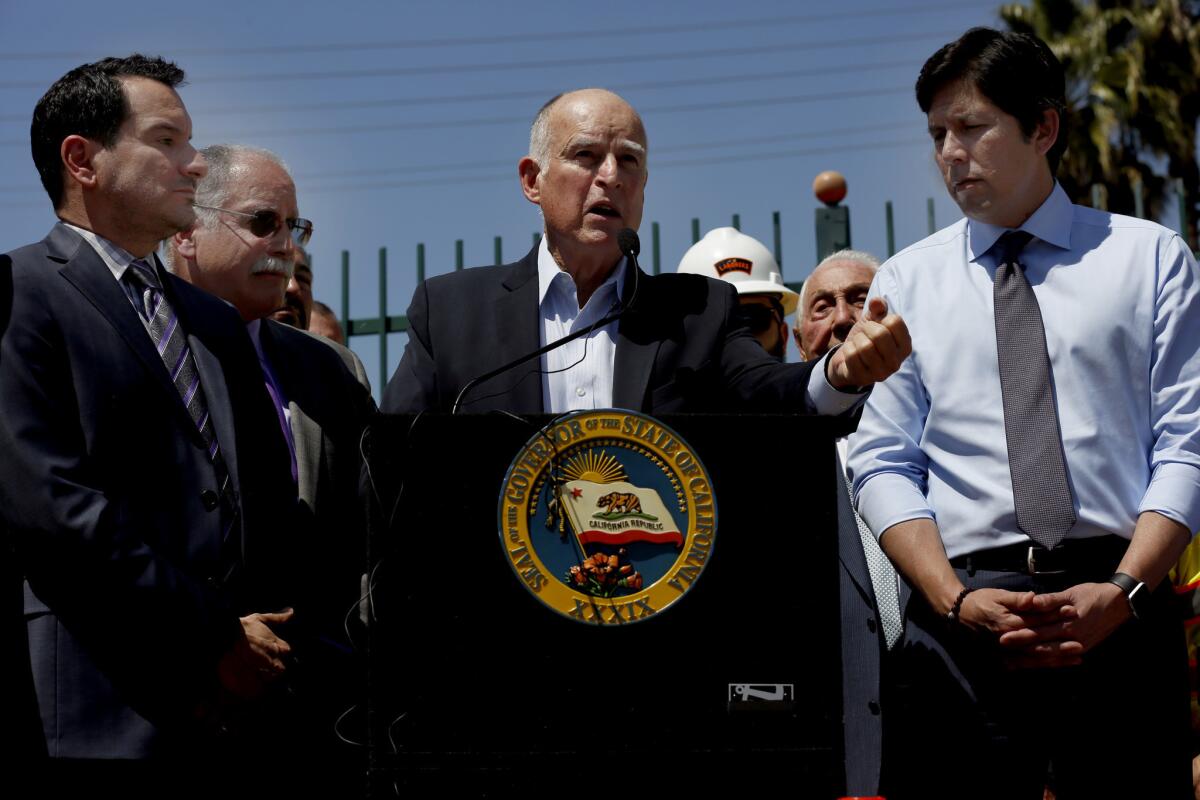
Gov. Jerry Brown, state legislators and other state elected officials were granted 3% pay raises Monday by a state panel that noted that it is slightly less than the salary increase that was recently given to rank-and-file state workers.
Anthony Barkett, one member of the state Citizens Compensation Commission, said the increase was reasonable given his concern about the state’s unfunded liabilities for pensions and the potential for “catastrophic” budget effects if Obamacare is repealed.
“I’m for a moderate increase again,” Barkett told the panel, adding, “Our legislators need to address these bigger problems.”
The action, which takes effect December 4, raises salaries for California officials that mostly were already higher than the pay of counterparts in other states.
Gov. Brown’s pay will jump from $190,100 to $195,803, which makes him the highest paid governor in the country. The second highest salary is the $193,304 paid to the governor of Pennsylvania, but Gov. Tom Wolf does not accept the salary.
California’s legislators will see their salaries increase from $104,115 to $107,238. They also get $183 per day in tax free per diem payments to cover expenses for each day they are in session in Sacramento.
The commission, which is appointed by the governor, also gave 3% raises to 11 other constitutional officers, including the attorney general, lieutenant governor and treasurer.
“Our data shows our legislators and constitutional officers’ salaries are greater than they are in most states,” Commission Chairman Thomas Dalzell said.
Even without the raise, California lawmakers received the highest base salary in the country. The second highest base salary is the $86,479 that goes to lawmakers in Pennsylvania.
The Legislature and governor recently granted 4% raises effective July 1 to the largest union of state rank-and-file workers.
The timing of the raises for lawmakers, coming two months after legislators voted to raise gas taxes and vehicle fees by $5.2 billion annually, was questioned by Lew Uhler, head of the California-based National Tax Limitation Committee.
“They raised our taxes and spent our money and they seek a reward for that? Come on,” said a skeptical Uhler.
- Share via
Democratic volunteers take to the streets of Rep. Steve Knight’s district to register voters
How badly do Democrats want to oust Rep. Steve Knight?
Rep. Karen Bass, a Westside Democrat, is already paying for buses and vans to ferry volunteers over the Sepulveda Pass into Santa Clarita, Simi Valley and the Antelope Valley to reinforce local Democrats as they start up voter registration drives. Organizers say they have registered 80 voters over three trips so far.
California may offer Democrats a lopsided advantage as a whole, but this patch of the state — where the suburban sprawl of Los Angeles comes to an end and the Mojave Desert begins — is still a bastion for the Republican Party.
The volunteers are in no short supply. Many are political neophytes newly invigorated by opposition to President Trump and itching for something to do.
“In L.A., you kind of feel like you are in this helpless political bubble,” Zoe Ward, a 32-year-old student in UCLA’s film directing master’s program, said after scouring Palmdale for new voters on a recent Saturday. “Coming out here, it feels like my minutes and hours go further.”
Two weekend trips into the district this spring show the task is grueling but uplifting work for some Democrats feeling guilty that they did not do enough in 2016 to help their party.
- Share via
Rep. Devin Nunes says it’s ‘critical’ for Republicans to keep winning in Orange County
As Orange County faces questions about its reputation as a Republican bastion, Rep. Devin Nunes told party donors on Saturday night that their pushback was key to fighting the majority Democrats’ power in the state.
“It is so critical for us to win here and keep winning here,” the Tulare Republican said.
Nunes was the keynote speaker of the Orange County GOP’s annual Flag Day fundraiser. The event was a testament to the vulnerability of some of his fellow Republicans — members of Congress who were reelected last fall but also saw Hillary Clinton win their districts.
Protesters greeted attendees on their way into the Hotel Irvine. And several of the lawmakers who are under pressure ahead of the 2018 midterm were at the fundraiser.
“If not for Orange County, I might be standing here, but it wouldn’t be as a congressman,” Rep. Darrell Issa (R-Vista) told the crowd. His district straddles Orange and San Diego counties, and he was sent back to Congress by just 2,300 votes in November.
The gathering came at a time when the GOP brand is in peril in Orange County, where voters favored a Democrat for president for the first time since the Depression. Four Orange County House seats are key to Democratic efforts to retake Congress next year.
But the roughly 1,000 attendees were unfazed.
“Bring it on,” said Fred Whitaker, the county party chairman. He noted that national Democrats planned to set up an office nearby to challenge the vulnerable Republicans here. “We save those seats, we save the House, we do our part.”
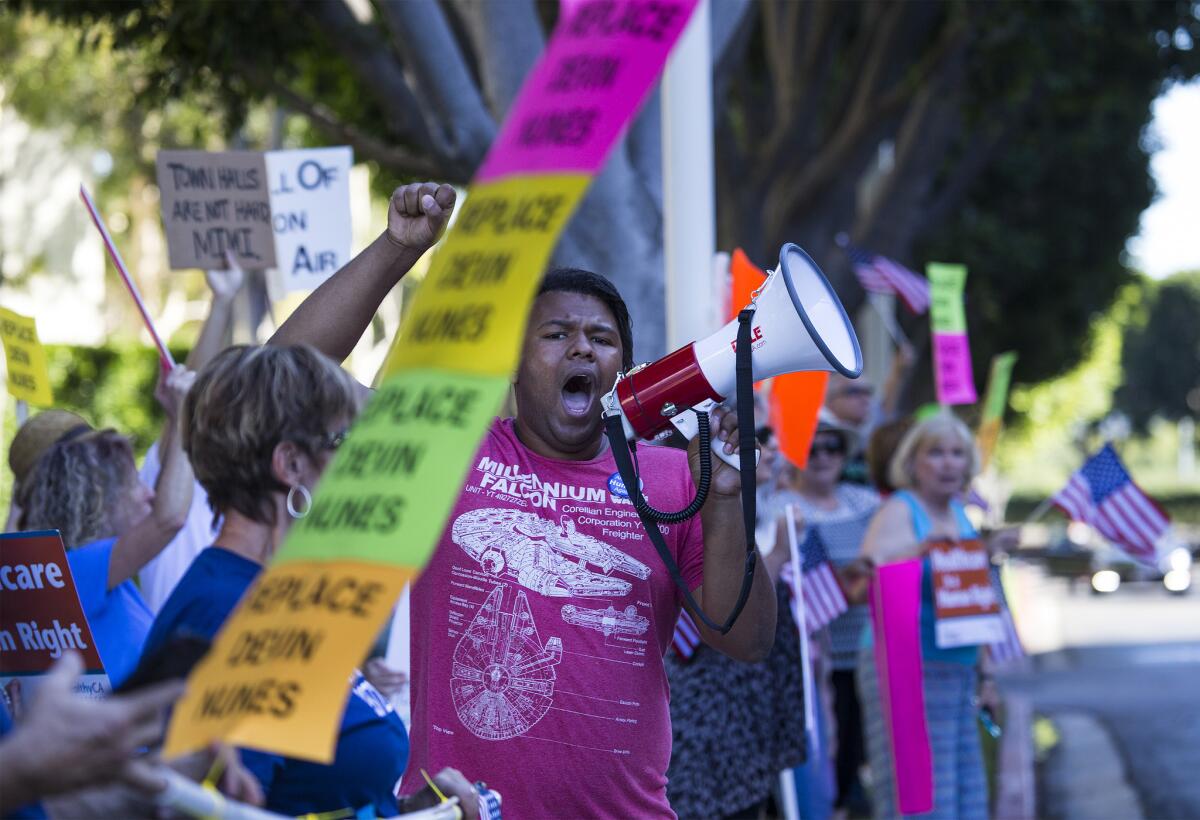
Nunes also spoke about a recent $52-billion gas tax passed in Sacramento, which he argued should be the focus of a recall ballot effort. “It’s going to be up to folks like you to pass initiatives. We need to get some common sense back in the state.”
The congressman spent much of his remarks excoriating the media, including the Los Angeles Times. He suggested at one point that the media was partly responsible for the shooting at a GOP baseball practice this week that left Rep. Steve Scalise of Louisiana critically wounded.
“You could almost see this coming when it happened last week because the level of civil discourse has reached a point that I’ve never seen in my time in office,” he said when Whitaker asked him about the shooting. “And I think finally what manifested itself after the election is that you finally had the curtains come down on the relationship the Democratic Party and the extreme left have with the media, the universities, Hollywood, we could go on and on and on.
“What you’re seeing is a political party not willing to accept what happened in the last election,” Nunes continued. “Hopefully it’s a warning sign and hopefully the media will get back to at least pretending to do some real investigative work.”
Nunes, the chairman of the House Intelligence Committee, addressed the ongoing investigation into Russia’s involvement in the 2016 elections, from which he has recused himself because he is under Ethics Committee investigation for his handling of classified material related to the inquiry.
“All the major papers in the country did a total character assassination on me because I was telling the truth – there was never any collusion between Donald Trump and the Russians,” he said. “Donald Trump and his agenda have stumbled out of the gate because you have an opposing political party develop a narrative, never let it go, continue to this day, and now we have a special counsel who, if you believe the leaks, is not looking at Russian collusion anymore. Was this an investigation in search of a crime?”
The audience cheered and applauded as Nunes spoke.
- Share via
Congressman grabs a guitar at Orange County fundraiser
- Share via
Republicans trumpet Janet Nguyen at fundraiser

The Orange County GOP showcased state Sen. Janet Nguyen at its Saturday fundraiser in Irvine, having the Garden Grove Republican deliver the pledge.
Nguyen, a Vietnamese war refugee, was in the headlines this year when she was forcefully removed while trying to speak out on the Senate floor against the late Sen. Tom Hayden, one of the most outspoken opponents of the Vietnam War.
Democrats were forced to apologize after the dustup and Nguyen has gotten a lot of attention ever since.
- Share via
Protesters crash Orange County GOP fundraiser
Susan Wong, a registered nurse from Orange, and her husband, Jim, who uses a wheelchair, were among scores of protesters on hand to greet Rep. Devin Nunes (R-Tulare) and other GOP lawmakers who gathered Saturday at the Orange County Republican Party’s annual Flag Day fundraiser.
“It’s all the deplorables in one basket,” said Wong, 64, outside of Hotel Irvine. “You just can’t stay home. I’m horrified every day. Instead of yelling at the television I’m going to come out and protest.”
Wong said she has seen a sharp decline in the number of uninsured people at the community college clinic where she works, progress she fears will be undone if President Trump is successful in his campaign promise to repeal former President Obama’s signature healthcare law. And she worries about the impact on her husband, a former research biologist with Parkinson’s disease who is on disability.
“I’m a nurse. I know what happens when people don’t have insurance,” she said.
Many of the protesters attended the event because they are trying to oust their representatives in Congress as well as other GOP members from California.
Nunes, the keynote speaker who is from the Central Valley and leads the House Intelligence Committee, has been at the center of controversy because of his handling of confidential information in the probe of Russian interference in the November election.
He will be introduced by Rep. Ed Royce (R-Fullerton), one of a handful of Republican members in California who represent districts that voted for Democrat Hillary Clinton in the presidential election. These elected officials are major targets for Democrats as they try to retake the House of Representatives in the 2018 midterm elections.
Reps. Dana Rohrabacher of Costa Mesa, Mimi Walters of Irvine and Darrell Issa of Vista all have purchased tables at the fundraiser.
Their critics complain about infrequent meetings with their constituents and have been calling for town halls.
Lulu Hammad, 42, held a poster featuring pictures of all five Republicans reading, “Missing Persons. Have you seen them? If found, please notify their congressional districts.”
The Aliso Viejo resident, a lawyer turned stay-at-home mom, said she is among the protestors who have repeatedly and unsuccessfully tried to meet Rohrabacher at his district office. She also said she tried to ask a question about healthcare on a tele-town hall but was hung up on. The lawmaker is holding a birthday fundraiser with a $250 entry fee next weekend, Hammad said. She feels as if the only way she could reach her congressman is by paying.
“I can’t really get a hold of him,” Hammad said.
Throughout the protest, there was talk of impeaching Trump and Russian interference in the election.
Nettie Bryan, 40, of Cypress held a sign that read, “There’s two people I think Putin pays: Rohrabacher and Trump,” a reference to a joke that House Majority Leader Kevin McCarthy of Bakersfield made behind closed doors among fellow Republicans in 2016.
Bryan said she was most drawn to the event to urge GOP members of Congress to hold town halls to hear from voters.
- Share via
California Politics Podcast: The state budget deal explained
Even in a time when Democrats settle their differences quickly when it comes to California’s state budget, this year’s finale was marked by a series of bitter political debates.
On this week’s episode of the California Politics Podcast, we take a look at that intense debate over proposals to change the duties of a state tax board and the rules governing recall elections. We also step back and look at the final policy agreements on healthcare funding and social services programs.
And for our second topic, we offer up a list of California politicians who have found their way into the spotlight during the early days of President Trump’s administration.
I’m joined by Times staff writer Melanie Mason and Marisa Lagos of KQED News.
- Share via
These Californians made decisive plays in the Congressional Baseball Game
Eight California Democrats scored runs or made decisive plays that contributed to the Democrats 11-2 win at the Congressional Baseball Game Thursday night.
The event, played annually at Nationals Park, sold a record 25,000 tickets and raised $1 million for charity the day after a gunman who appeared to be targeting Republicans unleashed a spray of bullets on a practice field in Alexandria, Va. House Majority Whip Steve Scalise (R-La.) and three others were shot.
Freelance politics and baseball writer Nathaniel Rakich keeps unofficial statistics for the game, and shared highlights from the California delegation with The Times. In all, lawmakers from this state scored 6 of the 11 runs.
Second baseman Rep. Raul Ruiz (D-Palm Desert) was the lead off hitter for the Democrats. He scored a run, stole a base and made a double play.
Ruiz spent a lot of time in the batting cages getting ready for the game this year “and learned how to be patient with my self out there on the plate, and just waited for it to come across the plate, and bam,” he said after the game. “That’s what the lead off hitter needs to do, is get the momentum going early on so we can take the lead.”
The only two women who played in the game represent Southern California districts — Reps. Nanette Barragán (D-San Pedro) and Linda Sanchez (D-Whittier). Both seemed to be fan favorites, with the Democratic side of the stadium screaming and standing whenever they came to bat.
Barragán batted in a runner in the sixth inning.
“Every kid who plays in Little League, including me, dreams of the opportunity to play ball on a big league field,” Barragán said in a statement.
Other highlights included:
- Third baseman Rep. Jared Huffman (D-San Rafael) walked once, struck out once and scored a run.
- Pinch runner Rep. Tony Cardenas (D-Los Angeles) scored a run.
- Pinch runner Rep. Eric Swalwell (D-Dublin) stole three bases and scored two runs.
- Right fielder Rep. Jimmy Panetta (D-Carmel) walked once, was hit by a pitch and scored one run.
- Center fielder Rep. Pete Aguilar (D-Redlands) hit a double and batted three runs in.
- Share via
California has a long way to go in its fight against climate change
When it comes to California’s contribution to climate change, no challenge looms larger than cars.
New figures from state regulators show that transportation is the single largest source of greenhouse gas emissions at 37% of the total, and passenger vehicles make up the largest chunk of that sector.
And even though the state has been reducing its emissions, tailpipe pollution increased 4.4% in 2015, the most recent statistics available.
We crunched the numbers on California’s greenhouse gases and the state’s progress toward its goals on climate change. Dive in.
- Share via
California Atty. Gen. Xavier Becerra announces probe of drugmakers over epidemic of opioid deaths
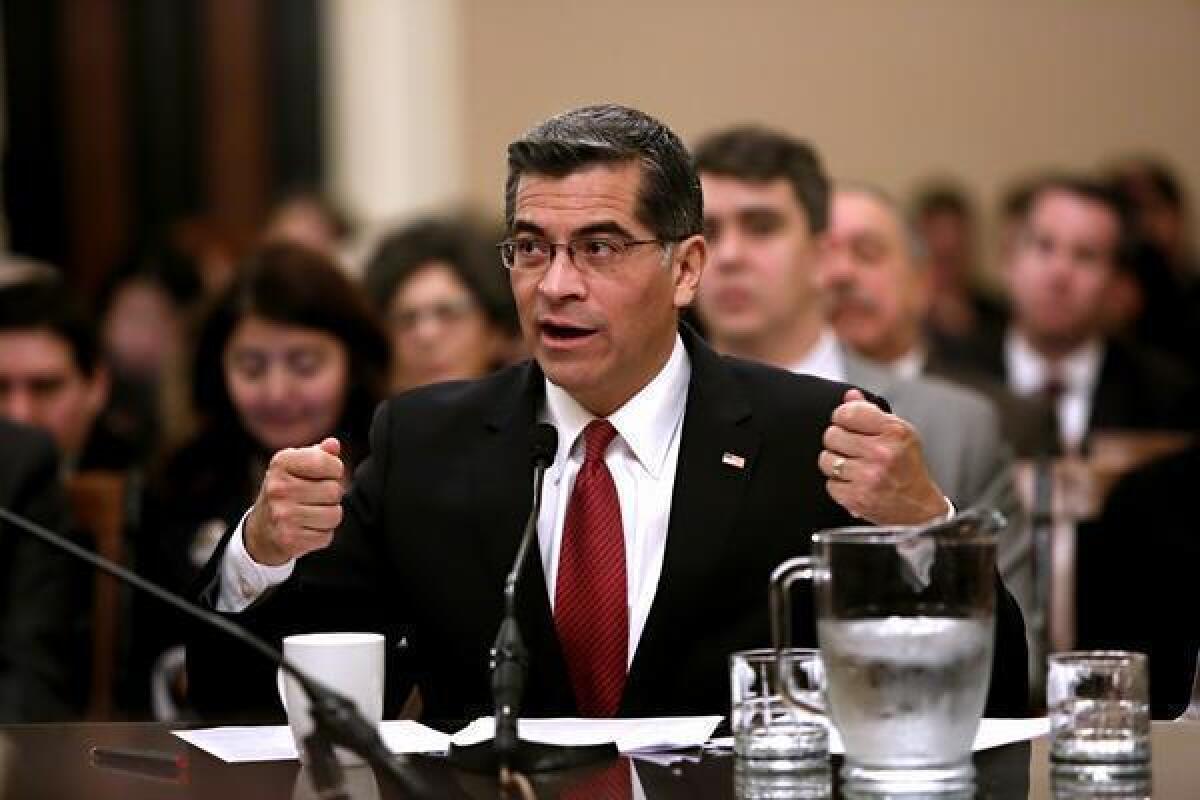
Citing an epidemic of opioid overdose deaths across the country, state Atty. Gen. Xavier Becerra said Friday that California is joining with more than 26 other states to investigate whether drugmakers have used illegal marketing and sales practices.
Becerra said the probe would focus on whether drug manufacturers have played a role in creating or extending the opioid problem.
Makers of opioids have been under heat in recent years as the addiction crisis has intensified. A 2016 Times investigation revealed that Purdue Pharma, which manufactures OxyContin, knew its drug’s painkilling effects might not last as long as long as marketed, which could potentially promote addiction. The investigation also found Purdue Pharma collected extensive evidence of criminal trafficking of its drug but in many cases did not alert law enforcement.
In 2015, nearly 2,000 people in California died from opioid overdoses, and there were about 4,000 emergency department visits for overdoses. That same year, doctors wrote nearly 25 million opioid prescriptions, Becerra said, citing the California Opioid Overdose Surveillance Dashboard.
“The opioid crisis is a serious public health threat that is taking the lives of too many Californians, destroying our communities, ripping apart families, and impacting the work of law enforcement,” Becerra said in a statement.
- Share via
Dianne Feinstein says she’s concerned Trump will try to fire Mueller, Rosenstein
Tweets sent by President Trump have Sen. Dianne Feinstein (D-Calif.) concerned that he will try to fire the special prosecutor appointed to investigate Russian attempts to influence the 2016 presidential election, and the deputy attorney general who appointed him.
“The message the president is sending through his tweets is that he believes the rule of law doesn’t apply to him and that anyone who thinks otherwise will be fired. That’s undemocratic on its face and a blatant violation of the president’s oath of office,” Feinstein said in a statement Friday.
“It’s becoming clear to me that the president has embarked on an effort to undermine anyone with the ability to bring any misdeeds to light, be that Congress, the media or the Justice Department. The Senate should not let that happen. We’re a nation of laws that apply equally to everyone, a lesson the president would be wise to learn,” she said.
- Share via
What’s the future of Uber and Lyft in the Legislature?
Assemblyman Evan Low (D-Campbell) is one of the leaders in the Legislature who is thinking about the future of Uber, Lyft and the ride-hailing industry. Low, who co-founded the Legislature’s tech and millennial caucuses, now has a bill aimed at easing regulations for taxis to make them more competitive.
We spoke with Low about his motivations for supporting ride-hailing and whether the state is set up to oversee all the changes, including autonomous vehicles, heading to the industry.
“I do think it’s an appropriate time to engage in a wider conversation about the vision of California in the transportation space,” Low said. “We are very much engaged in that conversation. But we are also guilty of being slow at that process and not keeping up to date with that.”
- Share via
California jails won’t be able to restrict face-to-face family visits for inmates under state budget deal
California county jails will not be able to restrict face-to-face family visits for inmates under a budget plan approved Thursday by state lawmakers.
The measure prohibits a local detention facility that offered in-person visitation as of Jan. 1, from converting to video-only visitation.
Over the last five years, an increasing number of jails and prisons across California and nationwide have moved to offer Skype-like video visits through phone and computer screens. But some jails have used the video systems to replace on-site meetings that have traditionally occurred through a glass window.
Under the budget bill approved Thursday, counties would not be allowed to charge for the first hour of video visitation or to charge at all when that video visitation takes place at the jail.
Gov. Jerry Brown vetoed similar efforts in a bipartisan bill last year, pointing to the development of new state agency regulations under way. But at a joint legislative oversight hearing in February, public safety subcommittee members scrutinized the new rules, saying they went against the governor’s directive and the state’s rehabilitation goals.
An initial budget proposal would have required all but eight jails to provide space for in-person visitations.
12:06 p.m.: This article was corrected to reflect the updated budget proposal. An earlier version of this story stated that state agencies would have to provide in-person visitation. But the updated proposal says they will not be allowed to ban it.
This article was originally published at 7:15 p.m.
- Share via
California Legislature votes to strip key powers from state tax board hit by scandal
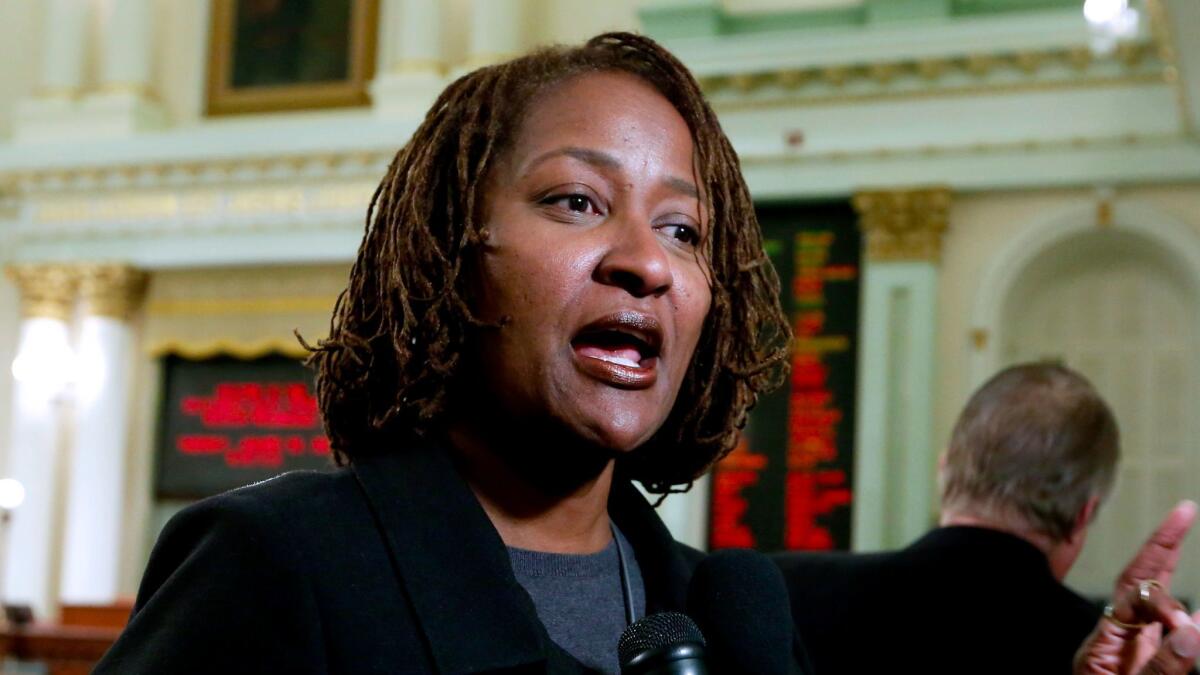
The state Legislature on Thursday voted to strip the state’s scandal-plagued tax board of most of its duties and powers, sending the governor a bill that would transfer taxpayer appeals hearings to a new office of administrative law judges.
The state Board of Equalization has been hit by a series of scandals, including audits showing that it misallocated hundreds of millions of sales tax dollars to the wrong accounts and that elected board members opened field offices and transferred workers without authority to do so.
Sen. Holly Mitchell (D-Los Angeles) said the measure will make structural reforms to address “significant issues of mismanagement and misuse of budget resources and disregard of directives of this Legislature.”
The measure, which also shifts oversight of sales and excise taxes to a new collection office, was sent by the Senate and Assembly to Gov. Jerry Brown, who has told lawmakers he supports the change.
Republicans including Sen. Jeff Stone of Temecula said the action takes away an important process for small businesses that want to appeal tax judgments. Stone said the legislative maneuver used to pass the change was an “abuse” of a process not meant to make sweeping policy change.
Sen. John Moorlach (R-Costa Mesa) said the bill violates the state Constitution and policies restricting how the Legislature can make major structural changes to state departments. That legal issue could be grounds for a ballot measure to restore the board’s powers, said board member George Runner.
In the Assembly, Budget Committee Chairman Phil Ting (D-San Francisco) said having three panels of administrative law judges hearing appeals will greatly speed up the process, which he noted took 15 years for one case.
“No taxpayer should have to wait 15 years to get their day in court,” Ting said.
Republican Assemblyman Jay Obernolte of Big Bear Lake said having elected board members hear tax appeals allows voters to get help from someone independent from the state bureaucracy and hold officials accountable.
“This bill will eliminate that very important taxpayer protection,” Obernolte said.
- Share via
Lawmakers approve changes to recall elections after an angry debate over political gamesmanship
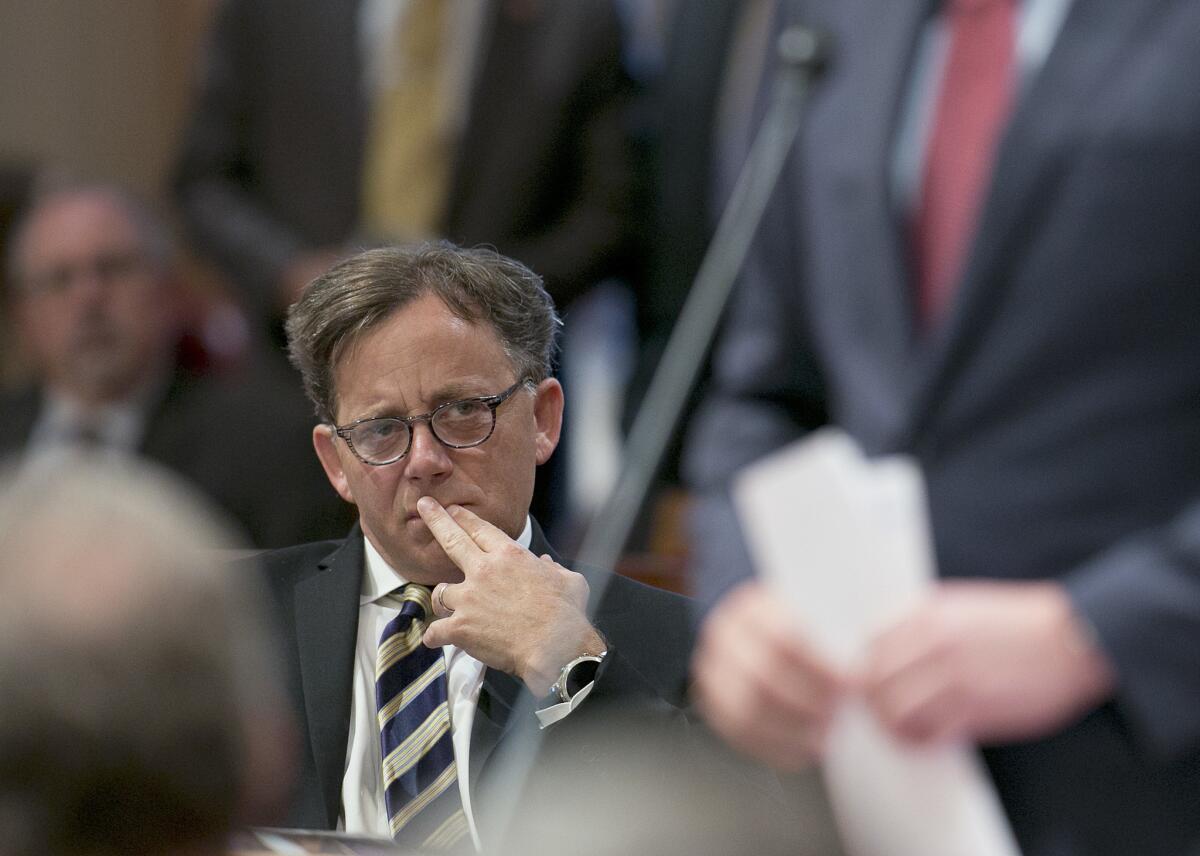
A controversial bill to revise the rules of special recall elections against lawmakers was approved by both houses of the Legislature on Thursday, but not before angry accusations over the pending recall effort against an Orange County state senator.
The bill, one of 17 pieces of legislation related to a new state budget, would add new procedures to the process by which a recall election is certified for removing an incumbent state official. It allows voters up to 30 days to remove their signature from a recall petition, if they change their mind about supporting it. It would also create a new process to review the costs associated with a recall election.
Both changes would slow down the scheduling of a recall election, and could therefore benefit state Sen. Josh Newman (D-Fullerton), the subject of a recall attempt in the wake of his vote for a $52-billion transportation bill that included a gas tax increase.
In both the state Senate and Assembly, the bill was the subject of scathing attacks by Republicans who accused majority Democrats of shamelessly manipulating the budget process.
“I haven’t seen one Democratic member get up in support of this bill, because you can’t defend it,” said Assemblyman James Gallagher (R-Yuba City).
Other Republicans blasted the proposal because it was included in a budget bill that also benefited veterans. The effect, said Assemblyman Devon Mathis (R-Visalia), was to “bastardize the process” of passing a budget.
Democrats counterpunched by railing against the Newman recall effort and signature gathering efforts. They accused Republicans of attempting to deceive voters in Newman’s Southern California district by casting the effort as a way to repeal the gas tax that will take effect in November.
It says “repeal the car tax,” said Sen. Nancy Skinner (D-Berkeley) of the signs being used by some signature gatherers working on the effort against Newman. “Now you sign that, you’re not repealing the car tax.”
Newman, who abstained from voting on the bill, delivered a sharp speech critiquing the effort to remove him from an office he won last November.
“It’s a pretext of the most cynical and calculating kind,” he said.
- Share via
Nearly $50 million in the California state budget will go to expanded legal services for immigrants
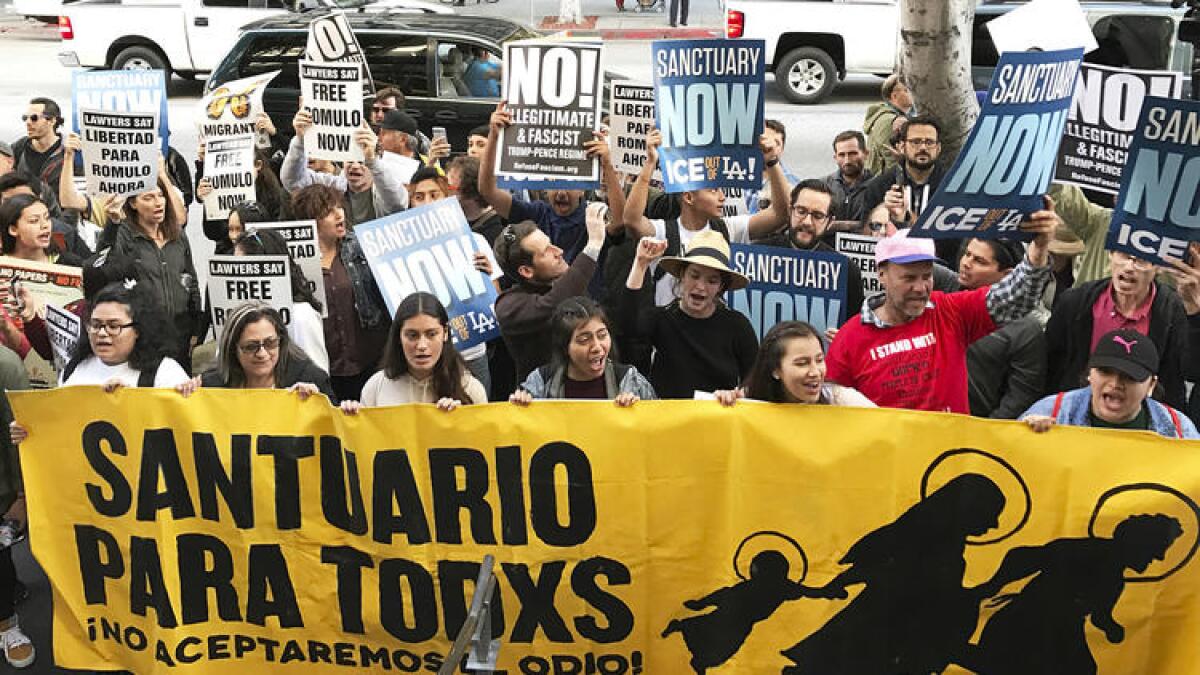
California state lawmakers approved $45 million in a state budget plan to expand legal services for immigrants, a response to the Trump administration’s call to increase deportations.
The funds, greater than what Gov. Jerry Brown earmarked in May and which will be an ongoing allocation through 2020, will go to a coalition of legal services agencies, immigrant rights groups and faith-based organizations called One California.
The $30-million legal assistance program, run by the state Department of Social Services, was first assembled to help thousands of immigrants apply for naturalization and former President Obama’s deferred action programs. With the additional money, providers will now also be able to help immigrants fighting deportation or removal proceedings.
Here’s how $183 billion in taxpayer dollars will be spent in California’s new budget>>
In a statement, the coalition called it a modest and reasonable investment to bolster much needed relief services.
“While the federal government proposes billions of dollars to tear communities apart through mass deportations, California takes another critical step on immigration to protect against the devastating consequences of deportations,” it said.
Improving legal defense for immigrants has been a significant part of a legislative package proposed by Democrats, in an attempt to assist more than 2 million people living in the state illegally. Among the proposals was a bill by Sen. Ben Hueso (D-San Diego) to create a $12-million legal defense program for immigrants facing deportation who do not have a violent felony on their records.
What you need to know about California’s ‘sanctuary state’ bill and how it would work>>
On Thursday, a spokeswoman for his office said he would no longer be pushing the bill through the legislative process in its current form.
The budget preserves a separate $3 million allotment for an unaccompanied minors program, which was created in 2014 to provide legal aid to an unprecedented number of children arriving alone at the U.S.-Mexico border from Central America.
“Today’s vote confirms our responsibility to protect the due process rights of people living within our borders which is fundamental to our democracy,” Hueso, chair of the Latino Caucus, said in a statement.
- Share via
California’s tobacco tax spending plan, a major sticking point in the state budget, easily clears Legislature

The squabble over how to spend around $1.3 billion in new tobacco tax revenues in California was one of the most prolonged standoffs of the budget season. But on Thursday, the compromise plan easily cleared the Legislature.
Under the spending plan, $465 million will go toward increased payments for doctors and dentists who see patients in the Medi-Cal program. Those healthcare providers had envisioned getting more money when they backed Proposition 56 last year, but Gov. Jerry Brown had resisted upping reimbursements at all for most of the budget season.
Democratic lawmakers and some Republicans sided with the medical groups, arguing that voters had backed the tax in order to expand access to Medi-Cal and that higher payments to doctors and dentists would encourage them to participate in the program.
But while Democrats appeared satisfied by the compromise — which also included $50 million to increase payments to family planning providers such as Planned Parenthood — most Republicans said more money should have gone to increase reimbursement rates.
“The will of the voters is being usurped by the governor,” state Sen. John Moorlach (R-Costa Mesa) said.
In a subtle jab at Republicans, who largely did not back the $2-per-pack tax hike last fall, state Sen. Richard Pan (D-Sacramento) thanked those of his colleagues that “endorsed and campaigned” for the initiative. He called the higher payments in the spending plan “a substantial step forward.”
Still, some Democrats were not fully enthusiastic with the final figure. Assemblyman Jim Wood (D-Healdsburg) said he was “disappointed” that more money was not going to physician and dentist payments but said “less than half a loaf is better than no loaf at all.”
The spending plan passed the Senate on a 25-11 vote and the Assembly on a 65-8 vote.
- Share via
John Cox, GOP candidate for governor, gives himself another $2 million
- Share via
California Republicans fail in two attempts Thursday to force vote on repealing gas tax increase
- Share via
New state budget would stop short of ‘debt-free’ college but takes smaller steps on college costs
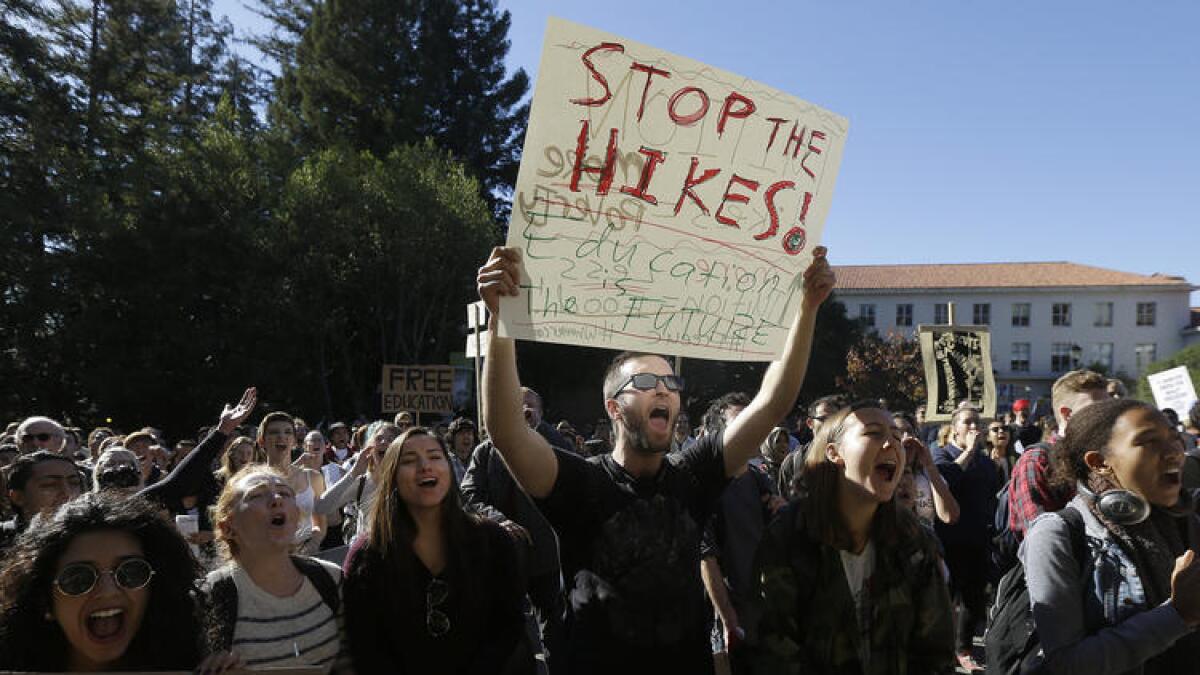
Three months ago, Democratic legislators unveiled a bold “debt-free college” plan that sought to eliminate the need for nearly 400,000 students to take out loans to finance their UC and Cal State degrees.
Now, they’re poised to approve a budget that includes more modest efforts to chip away at the spiraling costs of attending college.
“We didn’t get into this problem overnight and we’re not going to get out of it overnight either,” said Assemblyman Kevin McCarty (D-Sacramento), who helped lead the proposal. “This is a long-term conversation ... that I think the Assembly and frankly the Legislature is totally committed to.”
Assembly Democrats had proposed new scholarships -- which would supplement existing aid programs -- that would offset the cost of room and board, textbooks and other living expenses that tend to be bigger drivers of college costs than tuition. The fully implemented plan would cost $1.6 billion per year; legislators had suggested phasing in the program over five years, with an initial cost of $320 million.
The budget doesn’t put any money toward such grants. Instead, it directs the California Student Aid Commission to consider how to consolidate existing scholarships in ways that would lower students’ overall college costs, including non-tuition expenses such as housing and transportation.
There are other nods toward the college affordability issue in the budget. The plan maintains the Middle Class Scholarship -- which Gov. Jerry Brown had proposed axing -- and allocates $50 million in grants for community college students to cover living expenses. It also puts $3 million toward a state-sponsored college savings account, in which the state will match up to $200 for low-income families who open such accounts for their young children.
Left out of the budget was a proposal to make the first year of community college tuition-free for all full-time students. Assemblyman Miguel Santiago (D-Los Angeles), who has championed the idea, said he’ll continue to pursue it through his bill, AB 19. The measure currently doesn’t have any funding attached to it but he said he’s seeking ways to repurpose existing community college money.
Santiago called the budget “a step in the right direction” for tackling the high cost of college.
“This is going to become a conversation that is important every single year as we go through the budget process, and that hasn’t happened in the past,” he said.
- Share via
California’s air quality waiver appears secure for now as Trump’s EPA chief tells Congress it’s not under review
California’s unique authority to set tougher air quality standards than the federal government isn’t being targeted right now, according to Environmental Protection Agency head Scott Pruitt.
“Currently the waiver is not under review,” Pruitt said Thursday.
The comment, made during a Capitol Hill hearing, could deescalate what appeared to be a brewing battle between California and President Trump’s administration.
During Pruitt’s confirmation hearing earlier this year, he raised the possibility of reviewing California’s waivers under the Clean Air Act, a decades-old mechanism that has helped the state become a leader in fighting smog and climate change.
But Pruitt said Thursday that his office hadn’t taken that step when asked by Rep. Ken Calvert (R-Corona), who emphasized bipartisan support for the waivers over the years.
Pruitt said he understood the history.
“This has been something that has been granted going back to the beginning of the Clean Air Act because of the leadership California demonstrated,” Pruitt said.
California regulators are counting on using their waiver authority to pursue tougher standards on greenhouse gas emissions from vehicles, even as the Trump administration opens the door to rolling back federal rules. A dozen other states are also adopting California’s regulations as their own.
- Share via
Lawmakers haven’t missed a California budget deadline in 6 years, and won’t break the streak in 2017
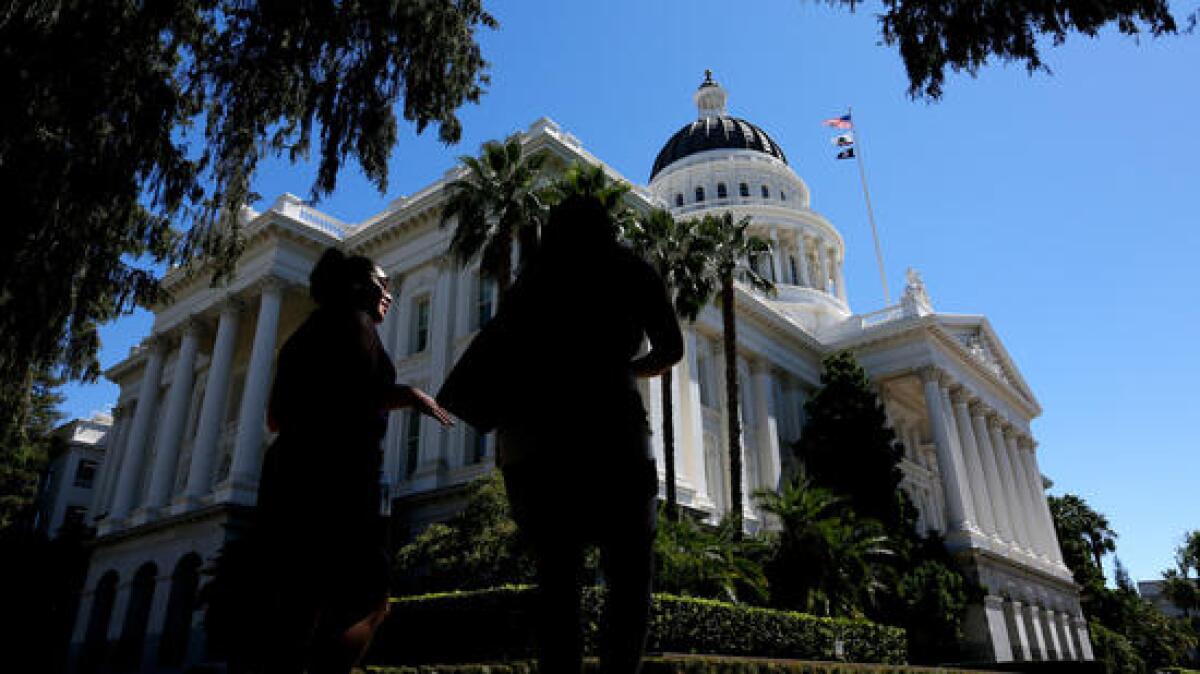
Lawmakers convene Thursday afternoon to sign off on a package of bills that comprise California’s state budget, and by day’s end will have extended a streak once thought impossible in Sacramento: eight years of on-time budgets.
From 1987 through 2010, the Legislature consistently missed its constitutional deadline to ratify a state budget no later than June 15. In most years, debate over a spending plan stretched well into the summer. In 2010, lawmakers didn’t send a budget to the governor until Oct. 10.
In addition to the strain of crafting budgets during deep recessions, the annual logjam was a function of California’s long-standing requirement that a budget be approved by supermajority votes in both the state Assembly and Senate. That meant bipartisan cooperation in the Legislature, in addition to striking deals with both Republican and Democratic governors. The state was one of only three in the nation with such a legislative hurdle to pass a budget.
Voters changed the system in 2010 with the passage of Proposition 25. The constitutional amendment not only made budgets subject to a simple majority vote, but it also required legislators to forfeit their pay if they failed to act by June 15.
Official state records don’t count the budget in 2011 as being on time, the first year under the new rules, because Gov. Jerry Brown took the unprecedented step of vetoing the first spending plan sent to him by the Legislature. It took almost another two weeks to settle the differences, and a subsequent court ruling found that lawmakers are still entitled to their pay if a budget is rejected.
While Thursday’s action will send as many as 17 budget-related bills to Brown’s desk, a handful of proposals related to the spending plan may linger for a few weeks. Legislative attorneys have maintained that those “trailer bills” can be implemented well into the fiscal year, again by a simple majority vote of each house, and would take effect immediately because they are designated as a part of the budget.
- Share via
Stem cell scientist to become the latest Democrat trying to topple Dana Rohrabacher in O.C. House race
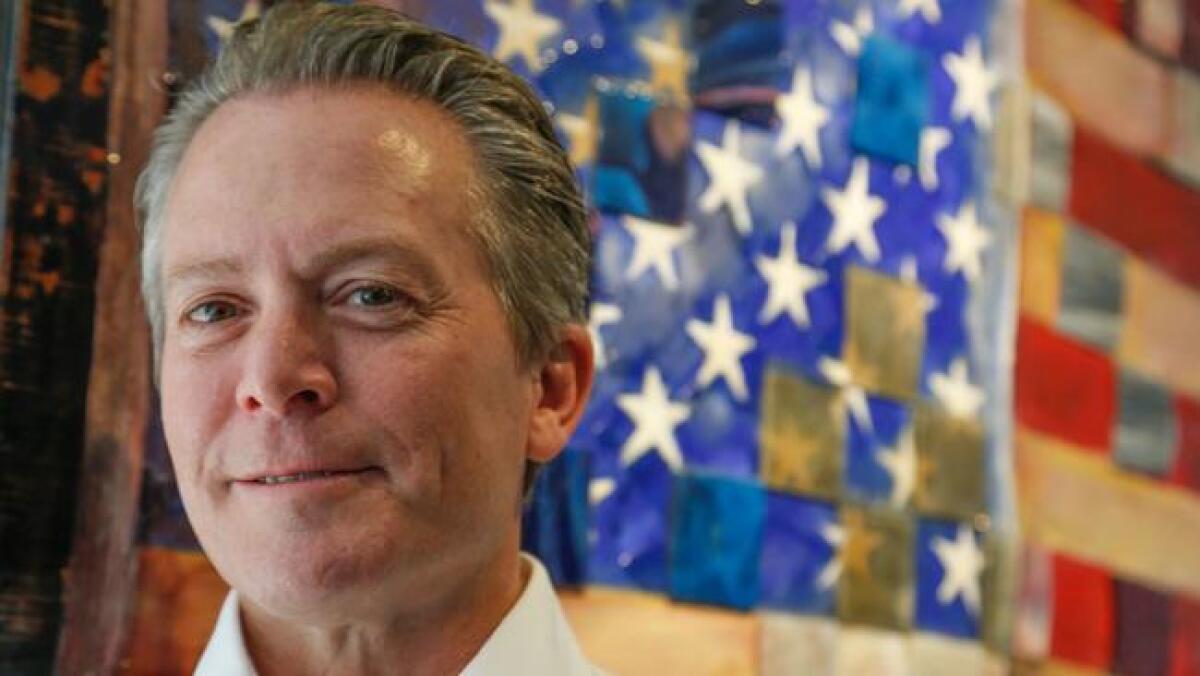
An internationally known stem cell scientist and entrepreneur will join the ranks of candidates trying to unseat Republican incumbents in contested House races next year when he announces Thursday his challenge of 18-term Rep. Dana Rohrabacher.
Hans Keirstead, a 50-year-old Democrat from Laguna Beach, said Wednesday that he will run in the 48th Congressional District, one of more than half a dozen in California that have been targeted by Democrats seeking to harness sentiment against President Trump in their fight for a House majority.
Keirstead’s candidacy has been sought by some national Democratic figures, who see his science and business background as a good fit for the district. It runs along the Orange County coastline from Laguna Beach to Seal Beach and includes some nearby inland cities.
Republicans represent a plurality of the district with more than 40% of its registration, to about 30% for Democrats. A quarter of voters are registered as nonpartisan. The Huntington Beach-based Rohrabacher, who is 69, has served in the House since 1988.
- Share via
Big stakes, little focus. So who’s running for California governor, anyway?
Who’ll be the next governor of California? It’s a complete and utter mystery.
Insurance Commissioner Gavin Newsom? Antonio Villagarosa? Kamala Harris?
Actually, none of the above.
Newsom is California’s lieutenant governor, not insurance commissioner. The former mayor of Los Angeles spells his name Villaraigosa. And unlike those two, Harris is not even running for governor; indeed, she’s just starting to warm the U.S. Senate seat she won in November.
The fight to succeed Democrat Jerry Brown is likely to be the most wide-open and unpredictable California governor’s race since at least 1998, when the overwhelming underdog Gray Davis surged to victory in the final weeks of the Democratic primary and took the office in a November landslide.
One would hardly know it, though, talking to voters who haven’t the foggiest notion who’s pursuing the job.
- Share via
A state senator targeted for removal from office says his opponents are misleading voters
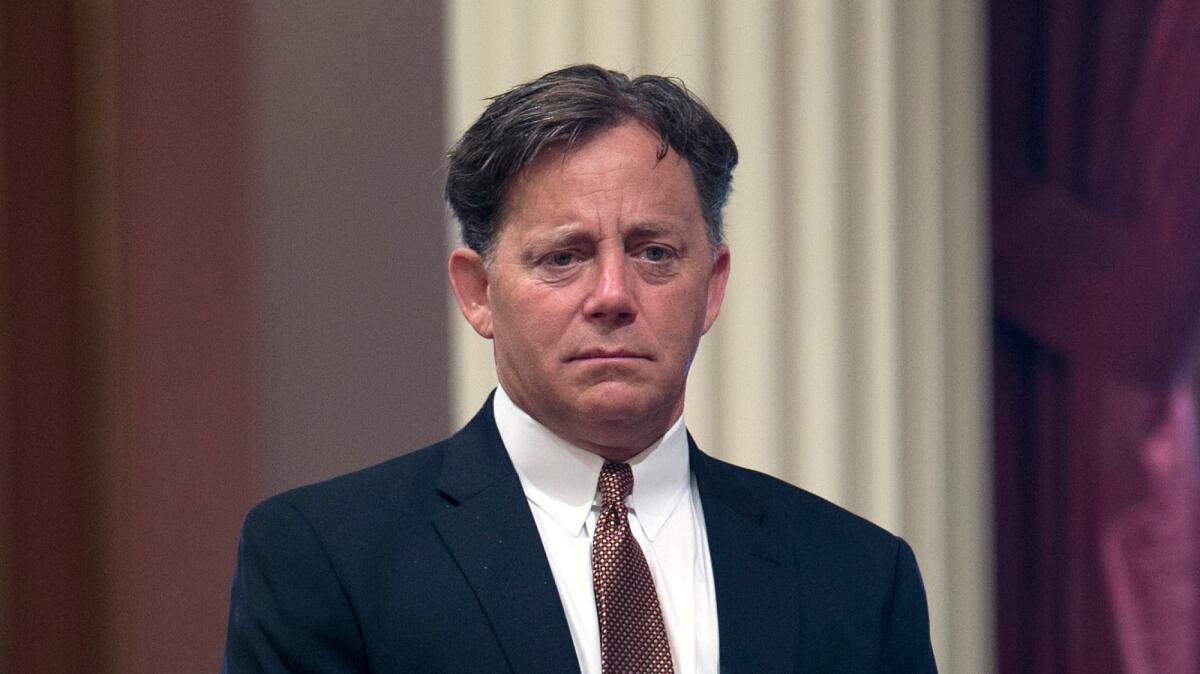
Attorneys for a Democratic state senator targeted for possible removal from office accused the lawmaker’s political opponents on Wednesday of “knowingly and willfully misleading voters” in their effort to force a special election.
Complaints were filed on behalf of state Sen. Josh Newman (D-Fullerton) with the secretary of state, attorney general and local district attorneys, all seeking an investigation of the recall campaign being waged by Newman’s opponents.
The complaint alleges that voter signatures are being gathered for a recall election by promoting a repeal of the upcoming increase in California’s gas tax. Newman voted for the transportation plan, which is why a political campaign partly funded by the California Republican Party seeks to remove him from office before his four-year term ends in 2020.
But the political fate of Newman, a freshman lawmaker narrowly elected last November, will have no bearing on a hike in fuel taxes or the creation of a new vehicle registration fee — both features of a $52-billion transportation plan signed into law in April.
“The campaign literature, materials and other messaging clearly demonstrate an effort to persuade voters to sign a petition based on false and misleading information regarding the content of the petition,” wrote Richard Rios, Newman’s attorney, in the complaint.
Supporters of the recall effort have regularly posted photos on social media showing signatures gathered alongside large “Stop the car tax” signs. Some of the photos also include Carl DeMaio, a former San Diego councilman and current radio talk show host who is one of the chief supporters of the recall.
DeMaio said Newman and state Democrats have dispatched their own troops to the region in an effort to try to coerce voters to not sign the recall petition.
In an emailed statement, DeMaio said Newman “is a liar and a bully who is being recalled from office because he cast the deciding vote to increase car and gas tax hikes — a point we spell out specifically in the recall petition that everyone is signing.”
The complaints come two days after legislators unveiled a last-minute addendum to the state budget that seeks to revise state law governing recall elections. The change would likely slow down the process enough so that any recall election for Newman would be delayed to next June, where he likely would benefit from higher turnout.
- Share via
Dianne Feinstein among handful of California Democrats who didn’t sign on to suit over Trump’s foreign earnings
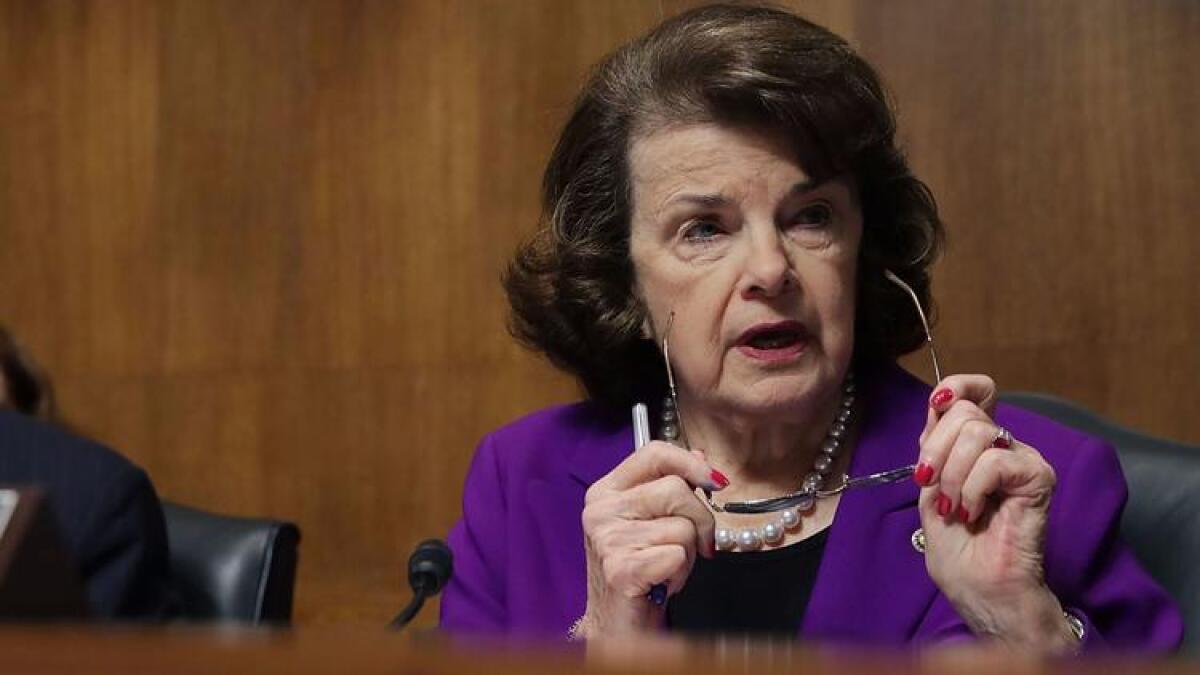
Close to 200 Democrats in Congress filed a federal lawsuit on Wednesday alleging President Trump has illegally profited from foreign payments to his worldwide business interests. But the list of plaintiffs was missing a few notable names.
Sen. Dianne Feinstein and four other Democrats in California’s congressional delegation, including some representatives of districts with a strong Republican or evenly divided electorate, did not sign onto the lawsuit.
Feinstein, who appears likely to run for reelection in 2018, has taken heat in recent months from liberal activists who have criticized her for not taking a more aggressive stance against Trump.
Her spokesman, Tom Mentzer, said the senator stayed away from the suit because she is the lead Democrat on one of the Senate committees investigating the Trump administration.
“As the lead Democrat on one of the two Senate committees investigating the president, Sen. Feinstein decided joining the lawsuit at this time may create an appearance of bias,” Mentzer said. “The senator will continue to be a vocal opponent of the president’s illegal acceptance of foreign payments and benefits.”
That did not keep Feinstein’s fellow Democrat and California’s junior senator, Kamala Harris, from joining the lawsuit. Like Feinstein, Harris also sits on the Senate’s Select Committee on Intelligence, one of the panels investigating the allegations about Trump and Russia. Harris has not responded to a request for comment.
The lawsuit alleges Trump has violated the emoluments clause of the Constitution, which forbids federal officials from accepting payments from foreign governments without the consent of Congress.
As an example, the suit points to the Trump International Hotel Washington, which it alleges has been actively courting foreign diplomats since Trump’s election in November.
The suit also alleges that Trump, through his business empire, has benefited financially from dozens of trademarks issued by the Chinese government since he was sworn into office.
The legal action comes just two days after the attorneys general for Maryland and the District of Columbia filed an anti-corruption lawsuit against Trump on similar grounds.
The White House has denied that Trump’s business interests violate the Constitution.
The California Democrats in the House who did not sign onto the lawsuit are Ami Bera of Elk Grove, Jim Costa of Fresno, Raul Ruiz of Palm Desert and Lou Correa of Santa Ana.
The Republican Party has said it will target Bera and Ruiz in the 2018 election.
UPDATES
1:31 p.m.:
This story was updated to clarify why Feinstein was not a plaintiff in the lawsuit.- Share via
Nancy Pelosi: ‘On days like today, there are no Democrats or Republicans, only Americans’
Read more on the shooting in Virginia at a congressional baseball practice in which five people were shot, including Majority Whip Steve Scalise (R-La.).
- Share via
Jeff Sessions said Kamala Harris’ questioning made him ‘nervous’
Sen. Kamala Harris (D-Calif.) turned her aggressive prosecutor tactics on Atty. Gen. Jeff Sessions in a tense interrogation Tuesday at a Senate hearing on Russia and the Trump campaign.
The two talked over each other as the freshman Democrat challenged Sessions to produce documents on his work as a top advisor to the campaign.
Read more about their exchange and see other updates from Sessions’ testimony.
- Share via
Gun control language tucked into California’s budget bill, irking the NRA
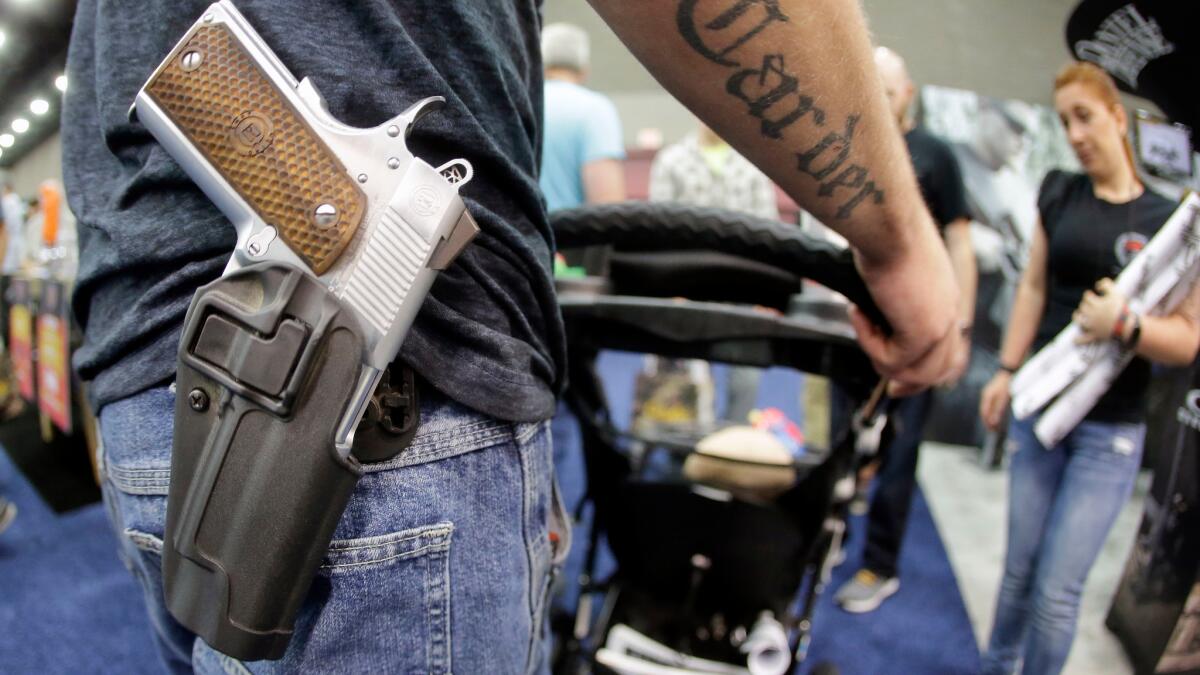
Gun rights advocates are fuming over some language buried in a state budget bill that would expand the number of Californians who can’t get guns.
Current law prohibits the possession of firearms by those convicted of a felony, but the new legislation would extend that to those with outstanding warrants for a felony or certain misdemeanors.
The gun provisions were amended into Assembly Bill 103 last Thursday as one of many provisions that deal with public safety, and are expected to be voted on by the Legislature as part of the budget this coming Thursday.
The budget should not be used to push through major policy changes because it bypasses a more detailed public hearing process, said Daniel Reid, state liaison for the National Rifle Assn.
“This drastic policy change will violate an individual’s right to due process as warrants can be issued without notice or hearing,” Reid said.
The budget trailer bill also includes a provision that would help gun owners by extending the deadline for registering all semiautomatic rifles with detachable magazines by six months.
- Share via
It was a California state budget report that was supposed to be about cannabis
- Share via
California’s senators ask residents to tell the federal government to stay away from the state’s national monuments

California’s senators are trying to prevent changes to six national monuments in the Golden State, and they’re asking Californians to help by sending comments to the Interior Department.
President Trump recently ordered Interior Secretary Ryan Zinke to review 27 national monuments created by the previous three presidents under the Antiquities Act, calling it “a massive federal land grab” that “should never have happened.”
The California monuments being looked at are Giant Sequoia, Carrizo Plain, San Gabriel Mountains, Berryessa Snow Mountain, Mojave Trails and Sand to Snow.
“On behalf of all Californians, we urge that these national monument designations are preserved with their present boundaries, to ensure these special places remain for generations to come,” Democratic Sens. Dianne Feinstein and Kamala Harris wrote in a letter to Zinke.
As of Tuesday, 157,807 comments on the national monuments had been submitted. Tens of thousands of the comments are specifically about California and its monuments.
Comments can be submitted until July 10, and Feinstein urged Californians to share their opinion, especially after Zinke issued his initial recommendation to downsize Bears Ears, a new monument in Utah.
- Share via
U.S. citizen detained by immigration authorities asks California lawmakers to support ‘sanctuary state’ bill

Guadalupe Plascencia told state lawmakers on Tuesday that she was frustrated and humiliated when she was handcuffed and detained in March by immigration authorities in San Bernardino, despite having become a U.S. citizen about 20 years ago.
At an Assembly Public Safety Committee hearing, Plascencia urged legislators to support Senate Bill 54, which would prohibit local and state law enforcement agencies from using resources for immigration enforcement.
She said immigrants deserve to be treated with dignity and respect and pointed to her experience as an example of how immigration laws can be wrongfully applied, even against citizens.
“I have always lived my life in accordance to the law,” she said. “But when this happened to me, I realized that while laws are important, they are not always applied fairly.”
SB 54 moved out of the committee with a 5 -2 vote. It now heads to the Assembly Judiciary Committee for consideration.
The so-called sanctuary state bill, which was introduced by Senate leader Kevin de León (D-Los Angeles), bans state and local law enforcement agencies, including school police and security departments, from using resources to investigate, interrogate, detain, detect or arrest people for immigration enforcement purposes.
Before the Public Safety Committee on Tuesday, De León said he was continuing to work with law enforcement officials on amendments to ensure the legislation would not hurt their agencies’ participation in federal task forces or hinder criminal investigations, including cases involving terror attacks, drug cartels or human trafficking charges.
Immigrant rights advocates cited Plascencia’s case as an example of the troubling situations that could arise for U.S. citizens at a time when President Trump has pledged to speed up deportations and increase detentions of immigrants in the country illegally.
The 59-year-old hairdresser was taken into custody by Immigration and Customs Enforcement after she spent the night of March 29 in jail. She was first arrested on a decade-old bench warrant related to her alleged failure to appear as a witness in a court case.
- Share via
Atty. Gen. Xavier Becerra says he supports single-payer health system for California
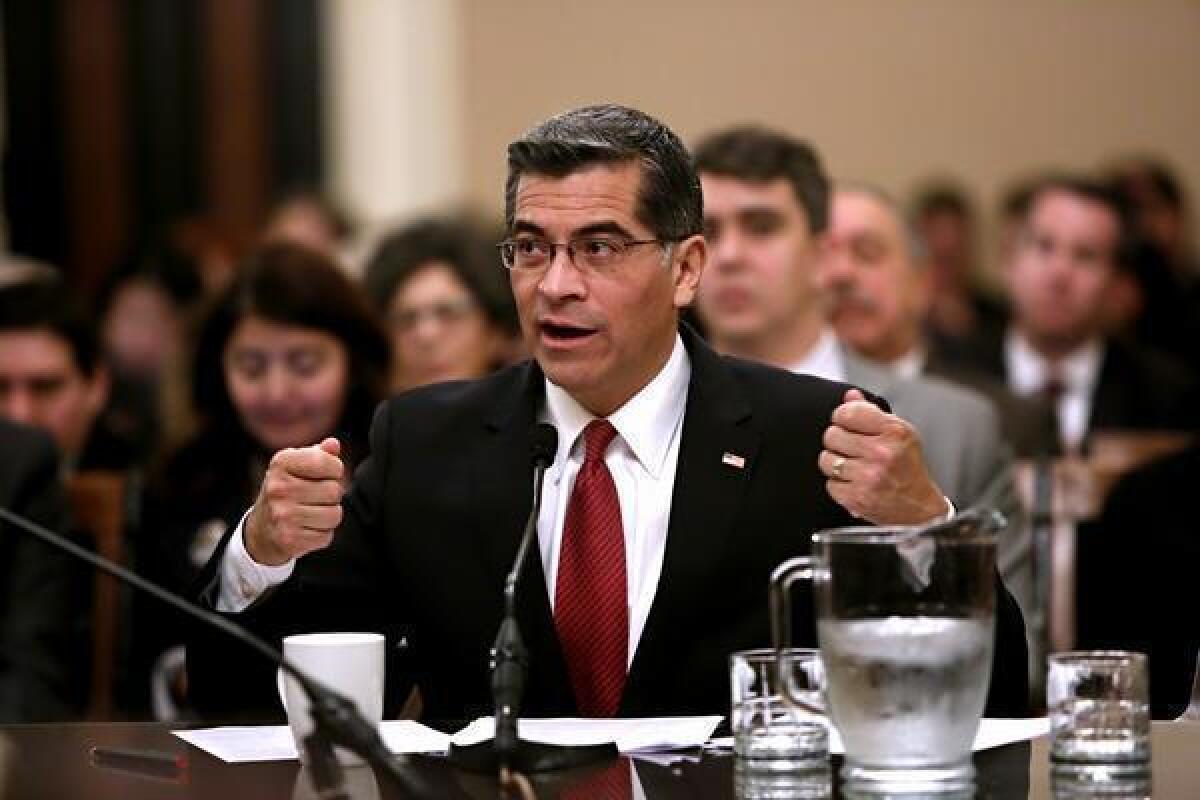
California Atty. Gen. Xavier Becerra said Tuesday that he supports a proposal for California to adopt a single-payer health plan and believes it will eventually be enacted because consumers will become “fed up” with the current system that he said is unaffordable to many.
The state Senate approved a bill two weeks ago that would create a system where the state government would replace private insurance companies, paying doctors and hospitals for healthcare. The measure, pending in the Assembly, does not yet include a way to cover the $400-billion annual cost.
Becerra supported single-payer legislation when he was in the Assembly in the early 1990s and for the last 24 years in Congress, he said Tuesday during an event in Sacramento hosted by the nonprofit Public Policy Institute of California.
“I think it’s the way to go because it takes away the inefficiencies in a system that has turned healthcare for people into a commodity,” Becerra said in a public conversation with PPIC President Mark Baldassare. Becerra said he sees healthcare as a “universally required obligation of our government.”
The attorney general wasn’t sure whether single-payer will happen this year, saying, “We need to figure out a pragmatic way to implement it,” but added, “It’s where the will of the people will take you.”
Becerra also said he would support legislation making California a so-called “sanctuary state” for immigrants in the country illegally “so long as we allow public safety to be done.” He said state law enforcement should work with federal authorities to fight crime, but should not help enforce immigration laws.
- Share via
Legal pot may add more than $5 billion to California’s economy

A study commissioned by the state of California gives a glimpse of the new legal marijuana market’s impact on the state economy.
Get the details here.
- Share via
L.A. voters fight fatigue as a fifth, and possibly sixth, election looms
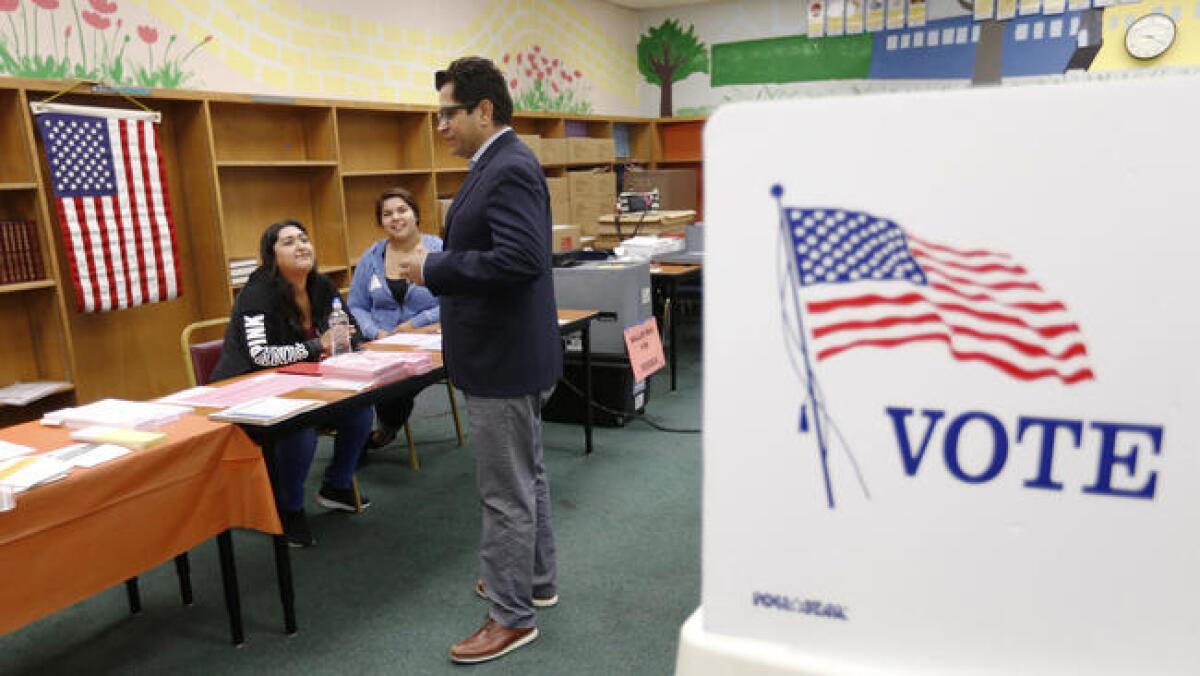
In the doldrums of odd-numbered years, L.A. politics often focuses on elections for mayor and city council. But 2017 has felt like overkill, even for the most diehard voters.
With two city elections and the race to replace Xavier Becerra in Congress, more than 100,000 voters in central and northeast Los Angeles have been asked to vote four times in the last four months.
And, after Assemblyman Jimmy Gomez defeated Robert Lee Ahn last week to become L.A.’s next congressman, they will be asked to vote again soon to replace him.
“It’s like a never-ending cycle since November,” said Amanda Santos, a stay-at-home mom and part-time bookseller who lives in Montecito Heights.
- Share via
Jimmy Gomez, soon to be L.A.’s newest congressman, gets a look at his Capitol Hill office
Congressman-elect Jimmy Gomez got the keys to his Capitol Hill office this week after winning the special election to replace Xavier Becerra in the 34th District, which covers central and northeast Los Angeles.
Gomez’s swearing-in will occur in a small, as of yet unscheduled, House ceremony.